Foreword
This report explores the experiences of disabled people using the benefits system. It highlights the challenges disabled people face. And sets out what disabled people told us needs to change.
We have known for a long time that the benefits system is complex. That accessing it can lead to stress and anxiety. And that the system is too-often based on catching people out.
This report makes it clear how common these experiences are today.
Disabled people we spoke to told us that they fear having to access support. That they worry about discrimination. And for those who can work, there is little support if a job does not work out.
Disabled people also told us that it is a fight to access financial support. Many said that the system is too complex.
It is clear from this research that major reform and change is needed.
Participants spoke often of ‘trust’ being the foundation for a better system, and of the need for empathy and kindness. Too often, people said they were not believed, have been made to feel second-class, and were left in impossible situations.
We hope that this research acts as a wake-up call to Government, to policy makers and to those involved in the benefits system. We know that tinkering at the edges will not change much. But we know what will. We must rebuild our welfare system so that everyone who needs to use it is treated with kindness and respect. And, crucially, that they are trusted as experts of their own lives.
We are grateful to the participants of this research who shared their experiences of work and navigating the benefits system with us.
Finally, we are grateful to the Joseph Rowntree Foundation for funding us to undertake this work.
Executive summary
What is in this report?
Scope and the Joseph Rowntree Foundation have partnered for this research. This report explores the experiences of disabled people using the benefits system. It highlights the challenges disabled people face. And sets out what disabled people told us needs to change.
Background
We know that life costs more if you’re disabled. Many disabled people who receive Universal Credit live in serious poverty. Most struggle to afford basic needs. And around half are experiencing food insecurity. This means their households had to reduce the amount, quality or variety of food.
In recent years, disability benefits in the United Kingdom (UK) have been a target for budget cuts across different governments. While the government and the media often talk about the low number of disabled people in work, the focus is mostly on cuts to benefits instead of fixing the barriers to employment.
Even though many disabled people want to work, there is still a gap of around 30% between disabled workers and non-disabled workers. And disabled workers are also more likely to have unstable jobs.
What did the report find?
We asked disabled people on our Lived Experience Research Panel about their experiences of using the UK benefits system. And what they thought could make the system better. This is what they told us:
The benefits system lacks understanding.
There is poor understanding of disability throughout the system. Disabled people feel that it is not there to support them.
The system is failing disabled people.
The system is not working for disabled people who cannot work. It also does not work for those who are already working or wanting to work.
The process is confusing and stressful.
People struggle to understand how the system works and what support they can access. Assessments cause a lot of anxiety and do not address the real barriers disabled people face. Often, disabled people feel they are not believed. They are treated as second class citizens and left in difficult situations.
Disabled people are harmed by pressure and shaming around benefits.
Government and media rhetoric impact negative public attitudes. People are made to feel unvalued by society and many feel forced to justify needing to claim.
Health and the job market are the real barriers.
The biggest barriers for disabled people entering the job market are not a lack of skills or motivation. The main challenges are not being well enough (93.8%), work making their condition worse (91.8%), barriers in the job market (86.3%), and fear of pressure from the benefits system (86.3%).
The benefits system creates its own barriers too.
Support is either not available for those who need it or is forced on those who do not. The system feels intimidating and impersonal, and sanctions create fear. This leads to distrust. Many people worry that getting support or trying out work could harm their benefits.
Support offered through Jobcentres does not meet disabled people’s needs.
People are not given information they need. And training or support is often not accessible or relevant.
Disabled people fall or are pushed out of work when employers do not support them.
This means that many people could still do their job with adjustments, after a period of sick leave or with a role change. But they are not allowed to do so.
What needs to change?
We asked disabled people what they would like to change about the benefits system. They told us:
- More information and support is needed. This includes:
- finding suitable work opportunities and training courses
- offering more personalised support
- helping with adjustments
- making changes to Access to Work
- providing support while in work
- Staff should improve their knowledge of disability. This includes training and hiring more disabled employees.
- The process of trying out work must be risk free. This includes allowing a grace period and changing work restrictions.
- The Department for Work and Pensions (DWP) needs to collaborate with employers. This will help improve conditions and address the lack of opportunities.
- Employers need to stop people falling out of work. Employers must:
- make adjustments
- offer appropriate sick leave
- improve flexible working options
- support disabled people if their needs change
- An empathetic approach is essential for support. It should be based on listening and respecting lived experience.
- There needs to be a shift away from a punitive culture. This involves reducing pressure and accepting people’s needs, barriers, and goals. Without the risk of sanctions.
- Support should be accessible and optional. Support must be easy to access, optional, and provide practical help with clear advice. This includes information about their legal rights at work.
- Communication and information must be clearer and more effective. This will help ensure that everyone understands their options and rights.
- We must stop the stigma that harms disabled people. This includes addressing the shaming faced by those who need to claim benefits.
- Trust should be restored through collaboration. Designing services with disabled people will help to rebuild trust and address the power imbalance.
Policy report
JRF have published a joint policy report, built on findings from this research. It puts forward some broader findings and policy recommendations.
We hope this research highlights the urgent need for change to the Government, policymakers, and everyone involved in the benefits system. Rebuilding our welfare system is essential, so that everyone who needs it is treated with kindness, respect, and trust.
Introduction
In recent decades, disability benefits have been a main target for UK government budget cuts. This focus appears to remain fairly stable across time and political parties. But we know that life costs significantly more if you’re disabled (Scope, 2023a; Scope, 2024a; WPI Economics, 2024). And that disability benefits often do not fully cover these costs (Scope, 2024a).
Another recent analysis has also revealed alarming levels of poverty among disabled claimants of Universal Credit. Most are in material deprivation. This means they do not have access to essential items and activities. And around half are experiencing food insecurity (JRF, 2024). This means their households had to reduce the amount, quality or variety of food. Such cuts can therefore be detrimental to many disabled people and their households.
Disabled people’s employment has been receiving much attention in political and public spheres. Many point to the lower rates of employment among disabled people as a major issue. This emphasis, however, tends to look for solutions within benefit budgets. It does not directly inspect employment barriers.
The repeated use of the concept of ‘economic inactivity’ in the context of disability benefits reflects a key issue. Supporting those in need is a moral obligation for every society. Social security or benefits are meant to serve this purpose. Yet instead of being a device to support those in need, this narrative positions disabled people in the context of a financial debt to national economy.
Some claimants of health-related Universal Credit or Employment and Support Allowance are already working. However, not everyone can move into work or work more. Crucially, no one should be forced to. Evidence suggests that many disabled people are interested in working (DWP, 2020). But they are not able to try or move into work for different reasons.
Disabled people’s employment rate is lower than non-disabled people’s employment rate. This measure, called the 'disability employment gap', has remained around 30% over the last decade (Scope, 2023b). Disabled people are also twice as likely to leave their work (Scope, 2023b).
For work to be sustainable, it needs to be secure. Measures of work security include reasonable and stable pay and access to rights and protection. It also includes contract-based commitments around the amount and future of people’s work. A recent report has revealed disabled people are 1.5 times more likely to be in severely insecure work compared to non-disabled workers (The Work Foundation, 2023). Insecure work means work without guaranteed hours or future work, like temporary or zero hour contracts. With unpredictable pay or pay too low to live on. Or without access to employment rights and protections.
Disabled workers from Black and Asian backgrounds have a slightly higher likelihood to be in insecure work. And being a disabled woman increases this likelihood to 2.2 times. A total of 1.3 million disabled workers are currently in severely insecure work in the UK. Another 430,000 disabled workers are underemployed. This means they are working, but would like to work more hours. (The Work Foundation, 2023).
All these facts demonstrate the imperative need for profound changes in the benefit system and the culture around it. Benefits should be stable and reliable. And they should provide accessible support for disabled people who wish to work.
The current and previous governments have suggested several potential proposals for reform (DWP, 2023). Some of these have, however, raised serious concerns among disabled people. Consultations with charities and disabled individuals took place before formal government policy proposals. But many feel the final proposals do not reflect people’s wishes or best interests.
Scope and the Joseph Rowntree Foundation (JRF) have partnered for this current project. We wanted to offer disabled people the opportunity to respond to the new proposed changes and consider how they might affect them. As part of this, we also wanted to allow people to share their experiences of the benefits system more broadly. With this aim, we conducted a mixed methods research study to examine possible barriers and solutions to people's move into work.
Glossary
We will use some terms and abbreviations in this research to describe different parts of the benefit system.
The Department for Work and Pensions (DWP)
The Department for Work and Pensions (DWP) is a ministerial public service department. They are responsible for the benefits, pensions and child maintenance policy. They administer benefits and run Jobcentres. Benefit policy is decided by the government and enacted by the DWP.
Employment and Support Allowance (ESA)
If people cannot work because of disability, they might be able to claim New Style Employment and Support Allowance (ESA).
There are 2 types of ESA: New Style ESA, also called contributory ESA or contribution-based ESA, and income-based ESA. New claimants can only claim New Style ESA.
The 2 groups for ESA are the Work-Related Activity Group (WRAG) and the Support Group (SG).
People can be entitled to New Style ESA and Universal Credit at the same time. Although the ESA would count as income for somebody’s Universal Credit calculation.
Work-Related Activity Group (WRAG)
ESA claimants might be assessed to have limited capability for work.
People can only be in this group for 12 months, and will receive the lower amount of ESA.
People do not have to work, but a work coach may ask them to do some regular tasks to get ready for work. These tasks are called work-related requirements. And would be recorded as part of someone’s claimant commitments .
Support Group (SG)
ESA claimants might be assessed to have limited capability for work and work-related activity.
There is no time limit for the support group, and they will receive the higher amount of ESA.
People do not have to work or prepare for work.
The Equality Act 2010
The Equality Act 2010 says that discrimination is illegal. The Equality Act 2010 replaced the Disability Discrimination Act. It says that disabled people have the right to ‘reasonable adjustments’ that make jobs and services accessible to them. Access for disabled people is a legal requirement.
This applies to employers, public and private services. Some things such as transport are covered by specific regulations.
Extra costs
Life costs more for disabled people and their families, spending more on essential goods and services like; heating, insurance, equipment and therapies. These extra costs mean disabled people have less money in their pocket than non-disabled people, or go without.
The result is that disabled people are more likely to have a lower standard of living, even when they earn the same.
Jobseeker’s Allowance (JSA)
If people are looking for work, they might be able to claim Jobseeker’s Allowance (JSA).
There are 2 types of JSA: New Style JSA, also called contributory JSA or contribution-based JSA, and income-based JSA. New claimants can only claim New Style JSA. Income-based Jobseeker’s Allowance has been replaced by Universal Credit. People can be entitled to New Style JSA and Universal Credit at the same time.
Income Support
Income Support was a benefit for people on a low income who were not in full-time employment. And had other factors like disability, being a lone parent, or a carer. People cannot make a new claim for Income Support and now would claim Universal Credit instead.
Personal Independence Payment (PIP)
Personal Independence Payment (PIP) is a benefit for disabled people. It is meant to be for people who struggle with everyday tasks or mobility. This is designed to address the extra costs that disabled people face.
It is made of 2 components: the daily living component and the mobility component. People are assessed for their eligibility. It is not a means-tested benefit. People’s earnings, other income or savings do not affect this.
Reasonable adjustments
The Equality Act 2010 requires an employer to make reasonable adjustments to enable a disabled person to work.
People can get adjustments if they are or become disabled. Or if their condition or role at work changes.
People can ask for reasonable adjustments during recruitment or once they’ve started work. Many reasonable adjustments cost little or nothing. But they can make a big difference.
Universal Credit (UC)
is a means-tested benefit. This means it is for people on a low income and without significant savings.
Universal Credit has a standard allowance. People may be eligible for extra payments, known as elements. These are extra amounts for things like childcare or housing, or if people cannot work because of sickness or disability. The 2 health-related elements of UC are Limited Capability for Work (LCW) and Limited Capability for Work and Work-Related Activity (LCWRA).
Limited Capability for Work (LCW)
Universal Credit claimants might be assessed as having Limited Capability for Work. Someone with LCW does not have to work now, but needs to prepare to work in the future. You will not receive any more money if you’re in this group, if you claimed after 3 April 2017.
Limited Capability for Work and Work-Related Activity (LCWRA)
Universal Credit claimants might be assessed as having Limited Capability for Work and Work-Related Activity. People will not have to work or prepare for work. They receive extra money as well as the standard allowance.
Work Capability Assessment (WCA)
Work Capability Assessment (WCA) is the process where the Department for Work and Pensions (DWP) decides if someone has limited capability for work or work-related activity. This is part of the claim process for a health-element of Universal Credit, or for Employment and Support Allowance.
This happens after someone’s doctor has provided a fit note. There is usually paperwork then an assessment appointment.
Work-related disability benefits
We will use work-related disability benefits to mean benefits disabled people of working age can claim from the Department for Work and Pensions (DWP). If their disability or health condition means they can’t work or it is harder for them to work.
When we refer to work-related disability benefits in this report, we mean Employment and Support Allowance (ESA) or the health-related elements of Universal Credit: Limited Capability for Work (LCW) and Limited Capability for Work and Work-Related Activity (LCWRA).
People are awarded work-related disability benefits after a Work Capability Assessment (WCA).
Accessibility statement
We use HemingwayApp to make sure our content has:
- a reading grade between 6 and 8 maximum
- no “very hard to read” sentences
Because of the topic of this report, there are some complex words that we cannot remove. This means the Hemingway algorithm shows a higher readability grade than what we would usually aim for. There are also some places where we’ve not been able to reduce very hard to read sentences.
We have still worked to make our content as accessible as possible. We focused on having:
- shorter paragraphs
- shorter sentences
- bullet points
- additional headings to help you navigate the content
- plain language where possible
About this research
Research objectives
We focused on the following questions:
What is disabled people’s current experience of claiming work-related disability benefits? To be able to understand the types of change most needed, and to adequately evaluate existing proposals, we first sought to explore people’s experiences of the current system.
We then moved on to focus on needed changes:
- How effective are current white paper (‘Transforming support: the health and disability white paper’. [2023]) and other related reform proposals at supporting people into work? What are potential issues with these proposals?
- What other changes would make the biggest difference to remove barriers and help disabled people into sustainable work?
- What changes would help remove the risk for disabled people who are interested in trying work or engaging with employment support?
- What changes to the work-related disability benefit system would improve people’s experience of the system and make it fairer?
What we did
To answer these questions, we used a mixed method approach across 5 stages:
- A survey about disabled people’s general experiences of claiming work-related disability benefits
- Discussion groups and interviews with people currently receiving health-related Universal Credit about their experiences and responses to main policy proposals
- A survey about assessments, disabled people’s engagement with employment support and barriers to work
- Deliberative workshop discussion groups with people currently receiving health-related Universal Credit about what they think would help and responses to developed policy proposals
- A survey to disabled people about policy proposals
We used data from each stage to inform the next one.
Fieldwork took place between February and July 2024.
Qualitative data from our groups and interviews was recorded and transcribed verbatim. We then analysed the data thematically. Thematic analysis is a method for identifying different patterns in the data. As part of this process, we used a deductive and an inductive approach to coding. Codes are patterns of meaning that we found in the data. This means that when looking at the data, we were guided both by some of the things we wanted to find out, and by things that participants raised.
All of the findings presented in this report have been made strictly anonymous.
Participants
A total of 921 participants from Scope’s Lived Experience Panel have taken part in the project (please see full details in the appendix). Each stage had a different number of participants, with some taking part in more than one stage.
Throughout this report, we use the term ‘disabled people’ to describe participants in this research. We used this term to mean people with an impairment, health condition, or access need. Participants in this research all identified as disabled using this definition or received a disability-related benefit.
Scope is a pan-disability charity that promotes the social model of disability. This means we believe people are disabled by barriers in society, not by their impairments or conditions. As part of this, we try to avoid using diagnostic labels when unnecessary.
Instead, we used broad impairment categories from Scope’s unified diversity monitoring questions. These were developed through a content design process which involved gathering best practice research. Then feedback from a diverse group of colleagues, volunteers, customers, and panellists.
Out of the total number of participants in the project, 382 were disabled people who currently receive Universal Credit (UC) with Limited Capability for Work (LCW) or Limited Capability for Work and Work-Related Activity (LCWRA) or Employment and Support Allowance (ESA). Participants’ age in this group ranged from 18 to over 65, and most were women (74.4%). The majority were White British (87.2%). 11.5% were employed (full-time, part-time, or self-employed) and another 10.5% were actively seeking employment.
Participants who currently receive UC, with LCW or LCWRA, or ESA had a broad range of impairment or condition categories (many identified as having more than one category):
| Category | Number | Percentage of group |
| Chronic or long-term condition | 265 | 69.37% |
| Mental health | 233 | 60.99% |
| Chronic or long-term pain | 221 | 57.85% |
| Mobility (moving around) | 246 | 64.40% |
| Neurodivergence (including autism, social or behavioural differences or ADHD) | 129 | 33.77% |
| Stamina, breathing or fatigue | 171 | 44.76% |
| Neurological condition (including epilepsy) | 109 | 28.53% |
| Learning, understanding or concentrating | 109 | 28.53% |
| Memory | 104 | 27.23% |
| Dexterity (handling or using objects) | 100 | 26.18% |
| Hearing | 52 | 13.61% |
| Speech or language | 29 | 7.59% |
| Vision | 39 | 10.21% |
A further 66 survey respondents over the whole project had gone through or said they were currently going through the Work Capability Assessment process. Some of these respondents said that they hadn’t had (61) or started (5) the WCA process when they first took part in the project, but had by the time the fieldwork ended. This means we spoke to 443 people who had interacted with the work-related disability benefits claim process.
Our first survey included a sample of 425 disabled people. 35.3% (n=150) of them currently receive Universal Credit with LCW or LCWRA or Employment and Support Allowance (ESA). And another 15.1% (n=64) have had a Work Capability Assessment (WCA) but are not currently claiming these benefits.
Our second survey included a sample of 527 disabled people. 46.9% (n=247) currently receive Universal Credit with LCW or LCWRA or Employment and Support Allowance (ESA). Another 15.7% (n=83) have had a Work Capability Assessment (WCA) but are not currently claiming these benefits.
Our third survey which focused on policy proposals, included a sample of 559 disabled people. 39.5% (n=221) currently receive Universal Credit with LCW or LCWRA or Employment and Support Allowance. Another 11.6% (n=48) had had or are going through a WCA. 78.7% (n=440) of respondents currently receive PIP.
In the first qualitative stage, we spoke with 16 participants who all receive Universal Credit with LCW or LCWRA (4 have LCW and 12 have LCWRA). They also received a number of other benefits and support, such as Personal Independence Payment (9 participants) and Council Tax Reduction (5 participants) and Employment and Support Allowance (1 participant).
Participants spread across impairment categories (many identified as having more than one category):
- 10 had a chronic or long term condition
- 9 had a mental health condition
- 9 had chronic or long-term pain
- 9 had a mobility impairment
- 7 identified themselves as being neurodivergent
- 6 selected stamina, breathing, or fatigue
- 4 selected a neurological condition (including epilepsy)
- 4 selected learning, understanding, or concentrating;
- 4 selected memory
- 4 selected dexterity
- 3 had hearing impairments
- 2 had impairments to do with speech or language
- 1 had a visual impairment
Throughout our report, when referring to participants impairments or conditions, we have only used terms based on participants’ self-descriptions.
Group participants’ age brackets ranged from 18 to 65.10 participants were women (4 were men, 2 preferred not to tell us). And the majority (15) were White British. Participants lived across England and Wales.
In terms of employment status, most (11) were unable to work due to illness or disability. 4 were employed (part-time or self-employed). 1 was a full-time student.
In the second qualitative stage, we spoke with 8 of these participants again.
Warning Content warning
This report discusses sensitive topics, including physical and mental health challenges, poverty, experiences of disability, assessment processes, distress, trauma, suicidal ideation and discrimination.
If you are affected by any of the content in this report, and want to speak to someone about it, please contact Scope's helpline on:
0808 800 3333.
If you need to contact someone urgently:
Call Samaritans on 116 123
Call Mind on 0300 123 3393
Text Shout on 85258
Work-related disability benefits
Universal Credit (UC)
Universal Credit (UC) is a means-tested benefit. This means it is based on a person’s income and savings. People may be eligible if they:
- are not working or are on a low income
- are under State Pension age
- do not have savings of £16,000 or more
Disabled people who have an illness or condition that affects their ability to work may also be eligible for “health-related” elements of Universal Credit. These are called “Limited Capability for Work” (LCW) or “Limited Capability for Work and Work-Related Activity” (LCWRA). These are awarded following a Work Capability Assessment (WCA). People may be given one of these elements depending on the outcome of this assessment.
Employment and Support Allowance (ESA)
Employment and Support Allowance (ESA) is another benefit that disabled people can receive.
There are 2 types of ESA:
- New Style ESA, also called contributory ESA or contribution-based ESA
- income-related ESA
If someone has not claimed ESA before, they can only claim New Style ESA.
New Style ESA eligibility depends on someone’s age, condition and income.
They must:
- be at least 16 and under State Pension age and
- have an illness or condition that affects their ability to work
They also must be one of the following:
- a part-time employee, working less than 16 hours a week
- previously an employee or self-employed person
- a full-time student
They also need 2 full years of National Insurance contributions out of the last 3 tax years.
Income-related ESA is a “legacy benefit” that can no longer be claimed. It has been replaced by Universal Credit for new claimants who are on a low income whose ability to work is affected by disability. Many people who claimed ESA in the past are still on ESA. And are still to be moved to Universal Credit.
The Work Capability Assessment (WCA) process
This report will relate to the process of the Work Capability Assessment (WCA) and the different terms that are part of it. Below is a description of the current WCA process for Universal Credit (UC) and Employment and Support Allowance (ESA).
A WCA is the process where the Department for Work and Pensions (DWP) decides if you have limited capability for work or work-related activity. This happens after your doctor has provided a fit note. There is usually paperwork then an assessment appointment.
The assessment appointment focuses on disabled people’s ability to complete paid work or work-related activity. This is using limited measures of ability to work, like:
- being able to repeatedly move for 50 metres
- moving a light but bulky object such as an empty cardboard box
- reliably completing at least 2 tasks, one after the other
Claimants are put in different groups that have different levels of conditionality. Conditionality means work-related activities a claimant will have to do in order to keep their benefit.
There are 3 possible Work Capability Assessment outcomes:
- Being put in the “Limited Capability for Work and Work-Related Activity” (LCWRA) in Universal Credit or the “Support Group” (SG) for Employment and Support Allowance (ESA). There should be no conditionality and the maximum payment.
- Being put in the “Limited Capability for Work” (LCW) group in Universal Credit (UC) or the “Work Related Activity Group” (WRAG) for Employment and Support Allowance (ESA). There is less conditionality than standard UC or Jobseeker’s Allowance (JSA) and a lower payment compared to LCWRA.
- Being found “fit for work” and not being entitled to working-age disability benefits of ESA, LCWRA or LCW .This means you only receive standard Universal Credit or the legacy benefit Jobseeker’s Allowance.
Work and disability
Work can be different activities or tasks that are aimed at producing purpose, value or meaning. As a concept, work is not limited to being paid. Examples of this include care work, housework or administrative work that people have to complete. Similarly, work is not limited to a specific set of skills, tools or abilities. But in many social contexts, when people talk about work they tend to mean jobs that people are paid for.
People tend to value paid work more than other types of work that might have a bigger value to society or the environment. For example, volunteering or looking after your local area. The same is true for the context of the benefit system. This focus on paid work is particularly problematic for disabled people. This is because paid jobs seem to have significant barriers and consequences if they cannot be maintained (Scope, 2023b).
The following themes describe the values and experiences the disabled people we spoke with attached to work. This related to work in general, and to work in the context of benefits in particular.
Social views and attitudes towards work and disability
The meaning of work: motivated by the sense of worth associated with work, devalued by the lack of it
This theme describes people’s views on work, including their motivation and the values they associate with work. It also describes the way not being able to work negatively impacts some people. Scope’s position recognises not everyone can or should work, and does not view paid work as providing more value to individuals or society.
Throughout our discussions, people have frequently talked about work as something that defined a significant part of their self-worth. Beyond the obvious financial advantages, work was seen as something people derived meaning and a sense of purpose from. Although similar meaning could be obtained from non-paid work routes, paid work seemed to hold higher social value. It was seen as a marker of independence.
This feeling appeared to be stronger for those who previously had a job they appreciated or enjoyed. Those who managed to find suitable jobs described working as an empowering and motivating experience:

I'm coming to the end of a 6-month contract, doing some part-time work. This has been a great experience, a more positive reminder of my capability, rather than the LCWRA label. I would like to find more work to continue.
The ‘non-working’ or Limited Capability for Work and Work-Related Activity (LCWRA) label as mentioned here was mostly perceived more negatively. This sense of negative judgement about not being able to work often had a negative impact on people’s self-worth and self-esteem. Some people described experiencing grief over changes to their work-related capabilities. This was especially true for those who became disabled later in life or whose impairments had changed:

I was still struggling from losing my job because I had worked from being 15 years old. That was such a kick in the teeth. I’m actually still getting a lump in my throat when I think about it now.” “Definitely made me feel less than and useless. It all happened very suddenly for me. Seemed one day I was working, next day I was totally incapable.
As will be discussed later, the way the “limited capability for work” benefits are structured appear to leave no space for safely trying out work. This was challenging for those who felt they would be interested in doing some work if they were given the chance.
People highlighted their lack of control over some of these circumstances. They tended to describe not being able to work as an unfortunate position:

It's not a case of ‘I'm choosing not to work because I don't want to work’. I'm not choosing this. If you gave me the option, I would choose not to be like this.
Many were motivated but could not find paid work options to suit their access needs.
Some who have lost their jobs after becoming disabled were not used to living without work-related purpose. They were not able to work, but found no support for creating alternative goals. Or finding their individual path for meaning that is not dependent on financial income.
They described how living outside the paid work structure made them feel purposeless and unvalued:

It sounds a bit sad really, but I don't feel like I have much purpose. I get up in the morning because my carers just need me up, I don't get up in the morning because I've got things to do or places to be or anything like that. And everything's aimed at working people, so it's hard when you're at home all day and you know that your friends are out working or what have you. You, kind of, feel like you're not as valuable to society.
Volunteering
In contrast to paid work, those with volunteering experience talked about the many advantages this provided. They were able to contribute and take part in meaningful activities, but without the strict schedule or pressure of paid full-time work:

I do [do] quite a lot of voluntary. …But I can do it in my own time, and I've got nobody putting pressure on me at all. Nobody puts pressure on me. And to think that they could push me back into something where I've got to meet timescales and things like that.
Some disabled people we spoke with who were not volunteering expressed an interest in this option. As they thought it may be a more enabling option to explore their capabilities. But many had not explored this idea through fear of triggering a reassessment, and potentially being pushed into work because of it.
One participant told us she was moved to the Limited Capability for Work (LCW) after volunteering for a while. She previously had a LCWRA award. This meant she was no longer protected from activity requirements and her benefit payment was reduced. Although she had an understanding disability work coach who understood she was not yet ready for paid work, so was not pushed into paid work like others.
Viewed as a burden on employers
The view of disabled people being a burden on employers seemed very common. This was reflected in people’s experience in work and looking for work. Non-disabled job applicants appeared to be routinely favoured. Adjustments were often not offered or even considered. And people were forced out of their roles when they become disabled or when their condition deteriorates. People described a lack of enforcement of anti-discrimination and employment laws. As one participant mentioned regarding her previous work:

No one's ever discussed [reasonable adjustments]-, that's something I've never had said to me.
This was also freely expressed in various types of public discussions and social media that people were exposed to:

We're too much trouble, disabled people. Somebody actually said that on a post, you know, and he said, 'As a businessman, I wouldn't employ disabled people because they're never at work. I'd have to make too many allowances for them’.
Being aware of this view, people were trying to navigate such discriminatory behaviours. This sometimes meant considering hiding their impairment or condition if they could:

…I think when, you know, with like my occupational therapist, when we talk about moving into work and whatnot she literally says, 'Don't put on the CV, don't say anything that you're disabled until you've got your foot in the door at the interview.' And I think that's really sad because it's almost like you're made to feel bad about, like, any condition you have or a disability, and that's not right. I think a lot of people are willing to go to work and want to, but it's just finding that support base.
Stigma about receiving benefits
People described encountering misinformed and dismissive attitudes around their work-related activities. At the same time, they felt an intense social pressure to move into work. Their experiences reflected a widespread lack of understanding about disability and work. Despite this, judging whether disabled people 'deserve' their benefits seemed socially acceptable. Disabled people identified the news media and social media as consistently reinforcing this practice and stigma. This adds stress to disabled people's lives:

I mean, I've got broad shoulders, you can't say anything to me about being on benefits that I haven't heard before. But I know a lot of people do get really, really stressed with it.
Many therefore seemed to feel a constant need to explain or justify their benefit claiming. They tried to counter the common stigma of disabled people being ‘lazy’ and attempting to avoid work:

I think what people don't realise with people like me, and there's a lot of us, that if we could do something we would be still doing it. We wouldn't just be putting anything off.
People felt their claiming status made others view them as ‘second-class’ citizens. Within the benefit system, the Work Capability Assessment (WCA) process has reinforced that feeling. Rather than their right, benefits appear to be viewed as something to be ‘earned’

I know I'm not fit for work but being told it again and again and again is quite draining, and quite knocking to your confidence because you kind of feel like-, they kind of treat you like you're a number and you feel like you're not worthy of the benefit sometimes because they say ‘It's for people who work; Universal Credit is better for people who work, and you don't work’.
People also felt pressure to move into employment before they were ready. Political and media rhetoric about getting people back into work seemed to contribute greatly to this pressure:

I was worried about what would happen if I couldn't work, but I wanted to work because the government are constantly saying they want people to work, 'Get back to work, get back to work.' So I thought I would try it, but it didn't work for me.
A culture of suspicion
People felt a disproportionate public focus being placed on cases of benefit fraud. Efforts to expose such cases are part of the public discourse. This leads many to associate disabled people with potentially fraudulent, criminal behaviour. This seemed to be powered by direct public communications from the DWP and ministers. Similar statements are then used by other politicians and discussions on television and social media.
This narrative often caused people to feel persecuted, surveilled and threatened:

They don't realise what they do to us every time they spout some sort of rubbish against us. You know, we're fragile people, some of us. We don't need half the country coming on attack after us just because you say they should do.
There was a sense of these threatening messages and society’s distrust of disabled people becoming worse over time:

To me, they will want to know the ins and outs of my bank account in a minute because that's what you keep hearing on the news, is that the DWP now want access to your bank account, so they can look to see if you're actually fiddling the system. I'm like, ‘You can't do that. Where have our human rights gone? You know, our equality, our diversity?’ I just feel like, I don't know, you don't know who to go to. There's no trust anymore.
It has also been pointed out that official benefit fraud statistics tend to be far lower than common rhetoric would suggest (less than 3% for all benefits, see DWP, 2024a).
Some have felt that the true numbers are not getting enough attention:

I'm not denying that benefit fraud happens because we know it happens. But then when the DWP report the overall figures for benefit fraud, and it includes mistakes they've made, then you, kind of, see that it's not as many that are committing fraud as they'd like you to think.
The existence of a prominent National Benefit Fraud Hotline felt like it could expose disabled people to abuse. One of our participants described how someone she had a personal quarrel with had used the line to falsely report her. This resulted in her account being immediately frozen.
Claiming work-related disability benefits
The next few sections describe the findings on people’s experiences of the work-related benefit system. This includes various stages in people’s claiming process:
- the circumstances that led people to claim
- awareness and access to information before claiming
- experiences of the Work Capability Assessment itself
- experiences of engagement with the Jobcentre as current claimants, including barriers around moving into work
It is important to note that in recent years, the DWP monitors customer satisfaction through its Customer Experience Survey (CES). Some of the survey items included in the CES are parallel or similar to the ones included in our research. Its recent (as well as previous) results (DWP, 2024b) are often in considerable conflict with the ones presented in this report.
This may be due to several reasons. Crucially, the CES relied on a sample of claimants who have had contact with DWP during the last 3-month quarter for certain purposes. This may mean their sample is more likely to exclude those who have less frequent or no contact with the DWP. As we will see later, this is unlike the majority of people in our sample.
Reasons to claim
We asked people about different reasons that led them to claim work-related disability benefits. We also asked about how important each of them was to them personally.
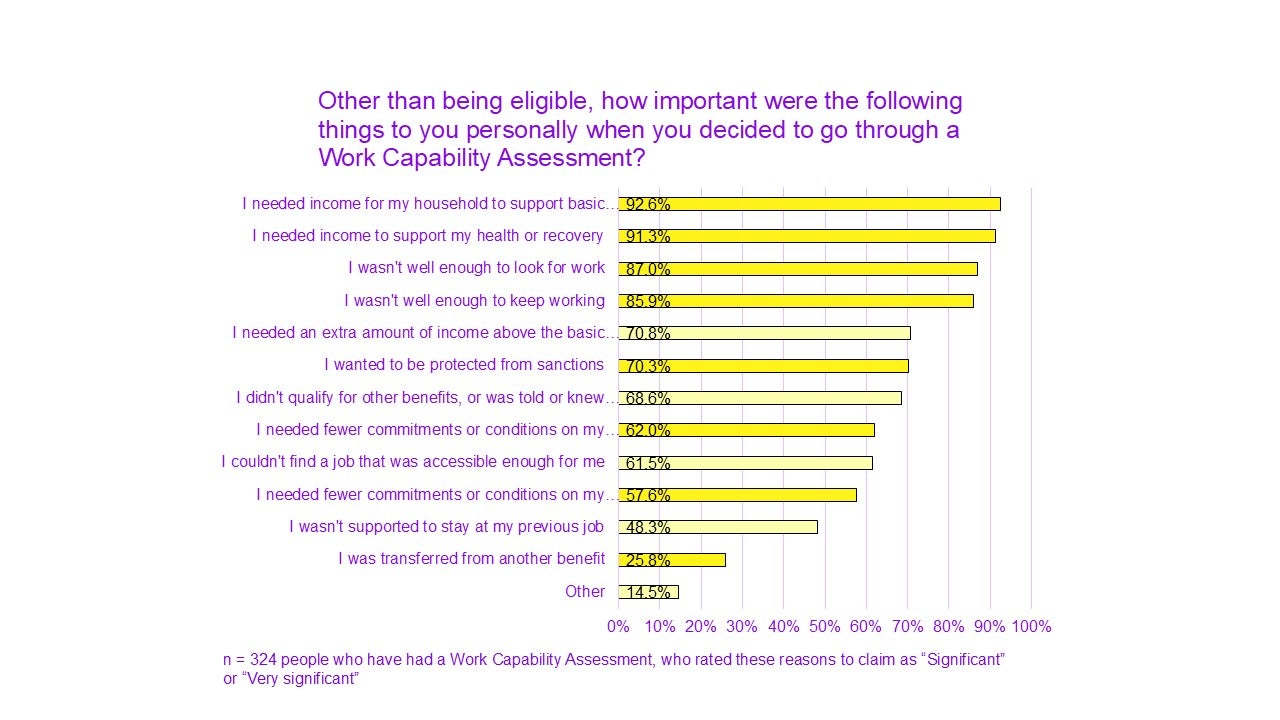
Financial need: covering living costs, allowing time to recover
Financial need was the leading reason for people claiming work-related disability benefits. Not being able to work meant people struggled to cover their basic living essentials.
Combined with constantly increasing living costs, people found themselves needing financial support to be able to take care of themselves and their households. This motivation was more often based on general need rather than knowledge of possible payment amounts.
While the benefit amount often failed to meet their needs, it helped regain some stability and time to focus on their health:

It just felt like it gave me some time and that I could take a breath, just to be, like, okay, now I can focus on getting my health better rather than actually focusing on fighting, ‘Oh can I keep a job?, can I afford to do this?, can I do this?, can I do this?' You know, each week and just not knowing.
Some of the people we spoke with also claimed Personal Independence Payment (PIP), which is meant to cover the extra cost of disability. But we know this is not always the case.
The extra costs or ‘Disability Price Tag’ for a disabled household is £1,010 a month, after benefits have been taken into account (Scope, 2024a). This figure represents the extra costs disabled households face to attain the same standard of living as non-disabled households. So for those who were also unable to work or find appropriate work, the additional LCWRA element of Universal Credit (UC) provided much needed help.
One participant lost her teaching job after she became disabled. She described how being housebound and unable to work meant her expenses increased even more:

…I live alone, I have carers. My cost of living is higher than most people because you see I'm on oxygen, so my electricity is a lot higher. I have a lot of aids that are run by electricity, so my bills are a lot higher than the average person. So yes, the impact [of not having the award] would be huge.
Health reasons: too ill to work, keep working or look for work
Unsurprisingly, health considerations were one of the most common reasons for claiming work-related disability benefits. This included:
- those who have always had a condition or impairment that made it difficult to work
- those whose health or condition deteriorated
- those who became disabled at a certain point in their lives and had to stop working.
Similarly, this was either a gradual process or a sudden change. Sometimes it was the activities surrounding work that also made it harder, like using transport:

I had to get a bus, yes. That was not too bad. I wasn't as severely disabled as I am now but my back was going and I didn't know how bad it was until after getting the bus several mornings, I realised, no, I couldn't cope with this so I ended up getting a lift from a work colleague, who could see I was struggling. But I just wanted to prove to myself that I could work, but it didn't work.
Some had experienced more complex symptoms or complicated processes to receive their diagnoses. This has made their claiming journey longer and more difficult.

For me, I went onto Universal Credit because I was starting to not be able to work because of my disabilities and that and I hadn't had a diagnosis yet but I was in so much pain.
For those with acquired impairments, many described the shock of suddenly not being able to work. There was a long process of understanding and accepting their new situation while trying to learn about their rights.
Many described the challenge of trying to figure out their work-related capability. This could be because their condition was fluctuating or they were still learning their limitations. They also had to manage their condition and the admin burden of disability at the same time.
Loss of work: forced out or made redundant
Some have mentioned being made to leave their jobs when they became disabled or when their conditions became worse. For some this has been made clear by employers who no longer saw them as acceptable employees. For others, it has been a more gradual process. Mentions included public and private sector jobs, and none were offered adjustments to be able to stay in their roles.
This was a particularly difficult time for many, as they were trying to manage their health and were unaware of their rights:

He said, 'Voluntary redundancy. If you apply for voluntary redundancy then we'll accept it'. And my big boss even said to me in that meeting, and I can't actually believe somebody in such a position of power could utter these words. But, at the time, because I didn't know any different and I didn't know about disability rights or anything like that. I certainly do now, it's my day-to-day.
For many, this also meant becoming familiar with the benefit system for the first time:

I basically lost my job because of my health and then I started claiming Universal Credit and I didn't really know about what else I could, like, claim on top of that or what I was entitled to.
Information about benefits
Where people get information and advice
People have mentioned learning about applying for benefits and receiving advice from different sources.
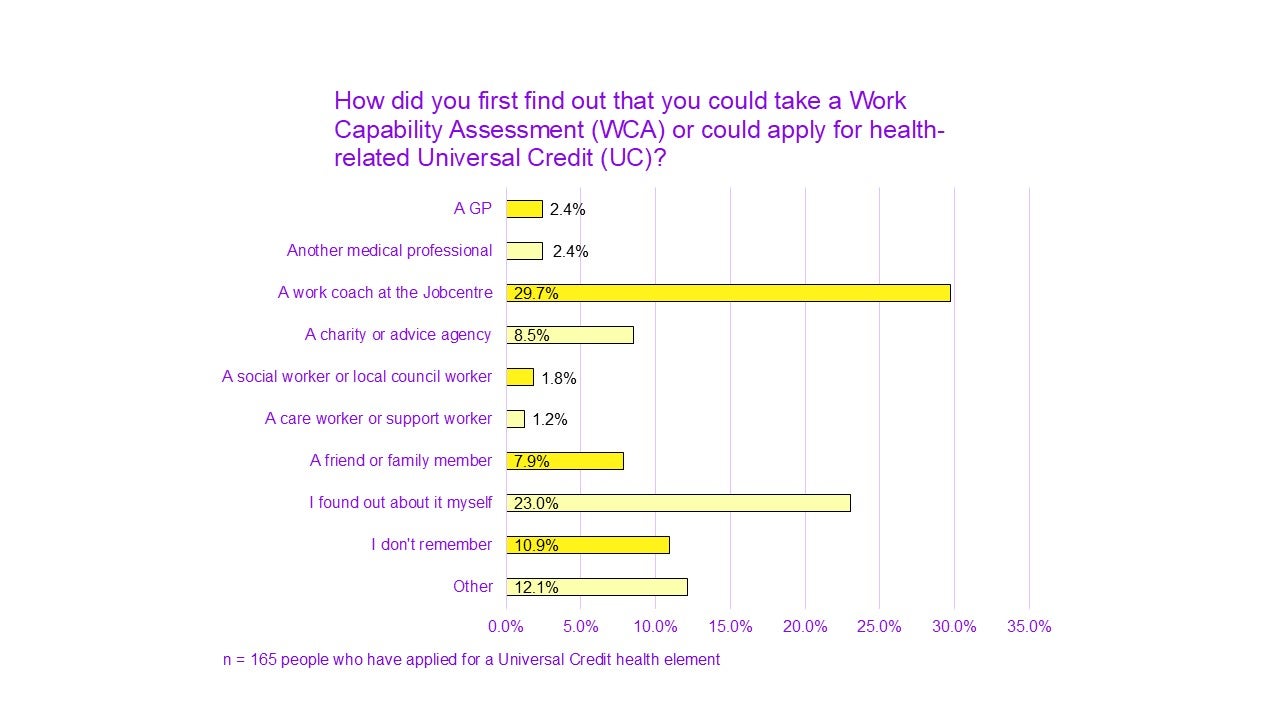
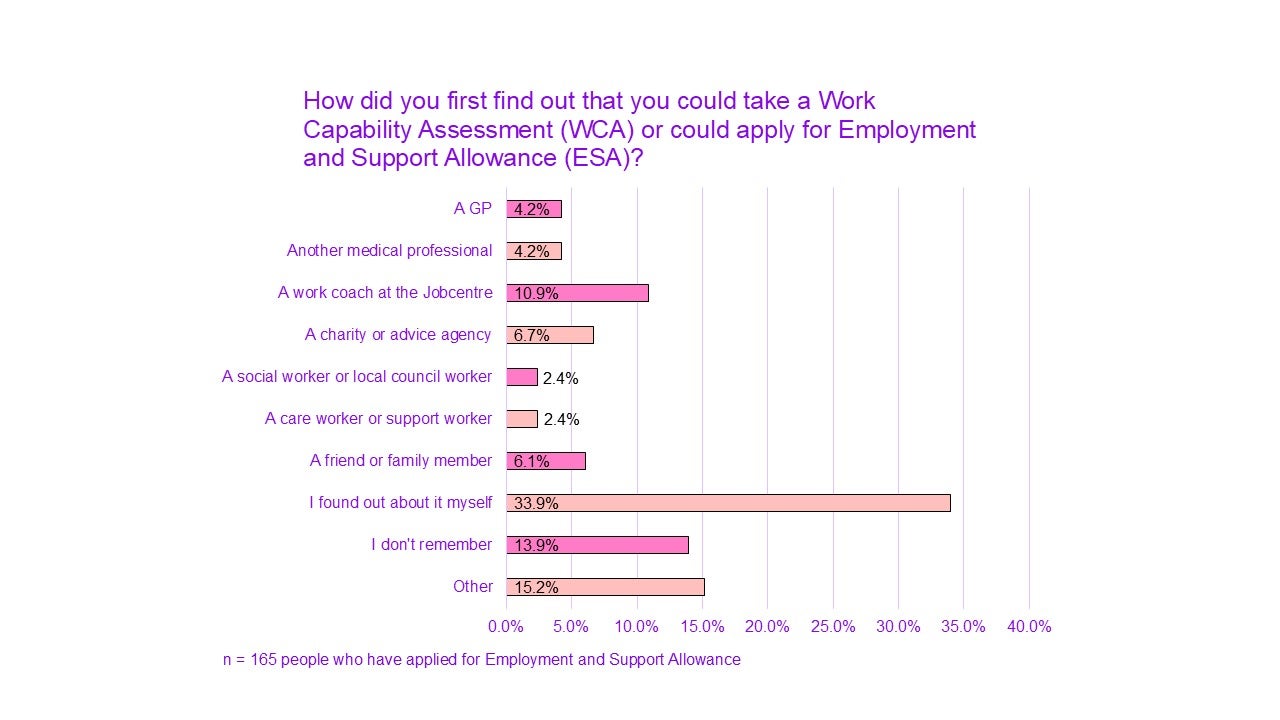
For those on Universal Credit (UC), 30% found out through a work coach at the Jobcentre. For those on ESA, only 11% through a work coach.
Some of the people we spoke to who had been advised by work coaches to take the WCA said this happened when work coaches noticed their access needs:

To be honest, I didn't even know that there was this Work Related [benefit], so I was just using Universal Credit as a top-up. And then, when I couldn't work I was just on Universal Credit and that's when my coach suggested it. So, I'm very lucky that I had a very good Work Coach because he saw I needed it and I didn't know that I could have that.
In some cases people did not seem to be proactively made aware of the possibility of claiming work-related disability benefits.
Most had to learn about their claiming options when they were already struggling with their health and finances. Some only found out about it coincidentally or when others mentioned it to them:

It was a long process because I didn't realise I should have been on it because I didn't receive sick pay when I should have to begin with. So, I had to chase it up. And then, when it came to that process we only realised by accident that I should have been receiving extra benefits. So, it was definitely a delayed process.
Many people have told us they struggled to find information about the benefits they were entitled to. Some have tried to receive information at the Jobcentre but were misdirected or dismissed:

And I had a bit of a long fight with the Jobcentre about different benefits that I may or may not be[...] suitable for. But they didn't ever really actually suggest that and it was a friend of mine that actually said, 'Oh, I've got Limited Capability and you should ask the Jobcentre about it.' And I think, like, it literally took a year before I was able to actually get anything properly progressed from the Jobcentre because everyone seemed to think it wasn't relevant to me or my situation was different, 'Oh, no. That's not quite right for you.' So, I think I wasn't really provided with any information about that and I, kind of, had to do it all off my own back and find out about it from a friend and Citizens Advice.
Low awareness of the Work Capability Assessment process and its details
Similar to eligibility, many claimants did not have clear information about the process before applying. Many started their journey not knowing what to expect. This included details about:
- the initial claiming paperwork
- the assessment appointment
- the possible outcomes and grouping following the decision
- the different conditions for each group
Some explained they were only directed to the general option of applying, and not provided with additional information:

I knew nothing. I didn't even know that it would be a bit of extra for me. I was just told, 'You need to go and do this. It'll take the place of your Universal Credit.' And I did it and, yes, I'm getting more from it than I did from my Universal Credit because then I didn't have to now work anymore because I can't. So, it was much better for me but I really didn't know what to expect at all.
We found that many people who are currently claiming work-related benefits did not know about the possible outcome options or did not understand their impact before claiming. Only around 42% of people applying for UC and 54% of people applying for ESA knew about the categories they could be put in if they were found to have limited capability for work.
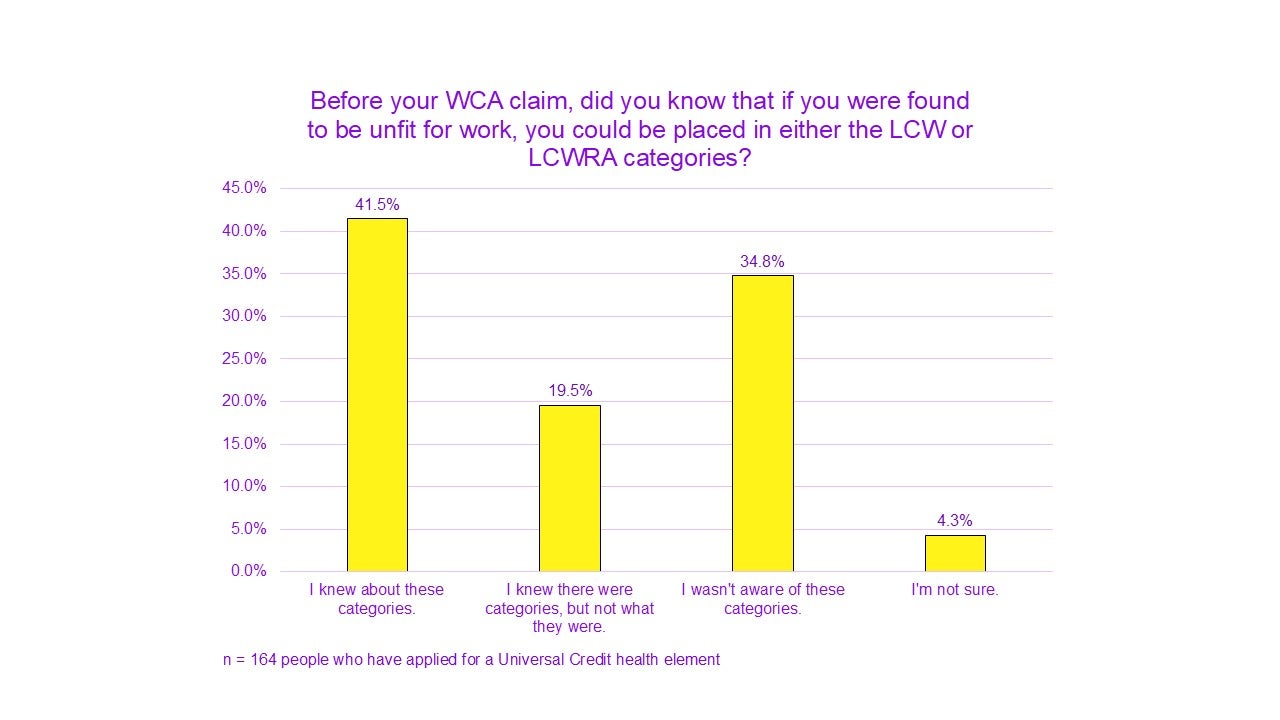
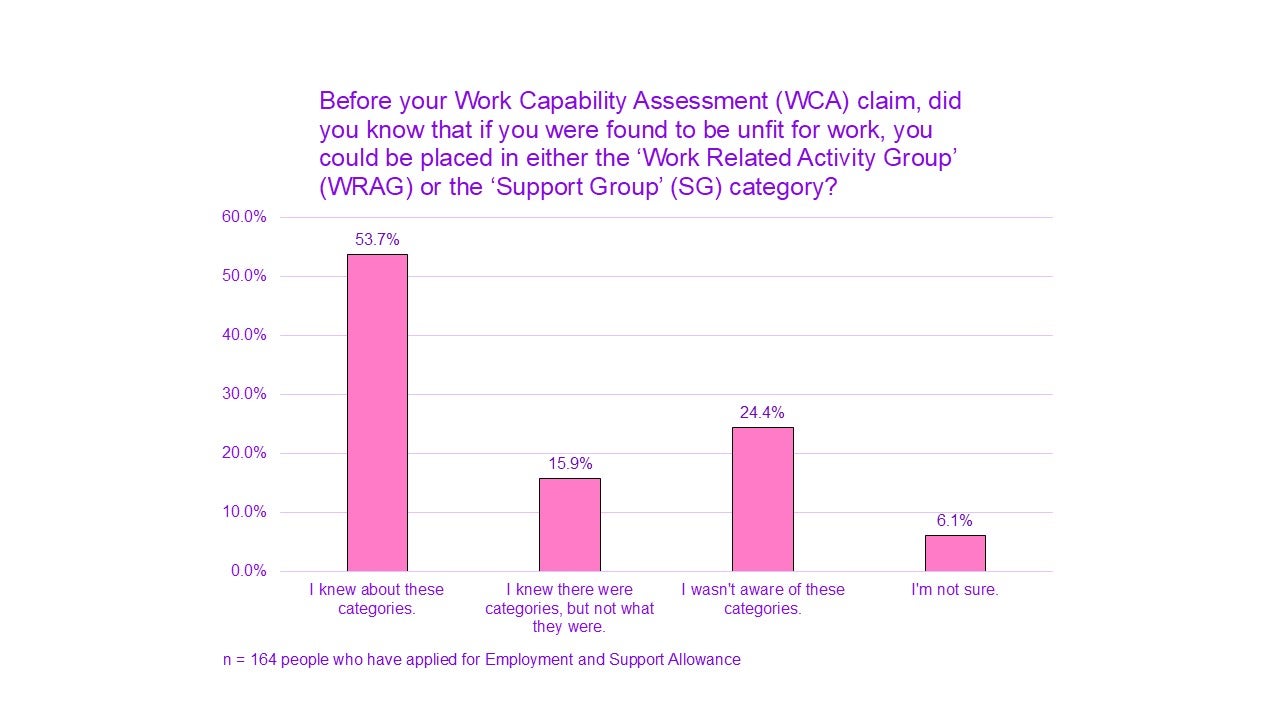
46% of people applying for UC and 50% of people applying for ESA said they weren’t aware of the possible extra income if they were put in the Limited Capability for Work and Work-Related Activity (LCWRA) or Support Group.
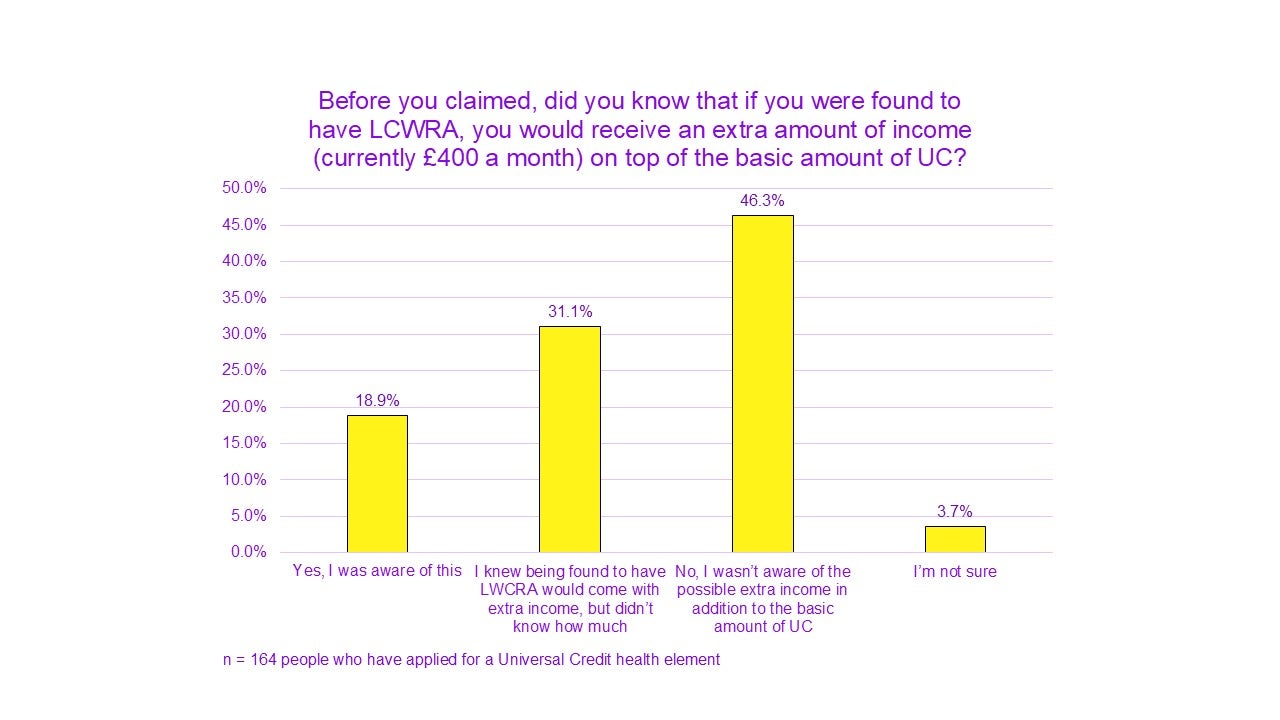
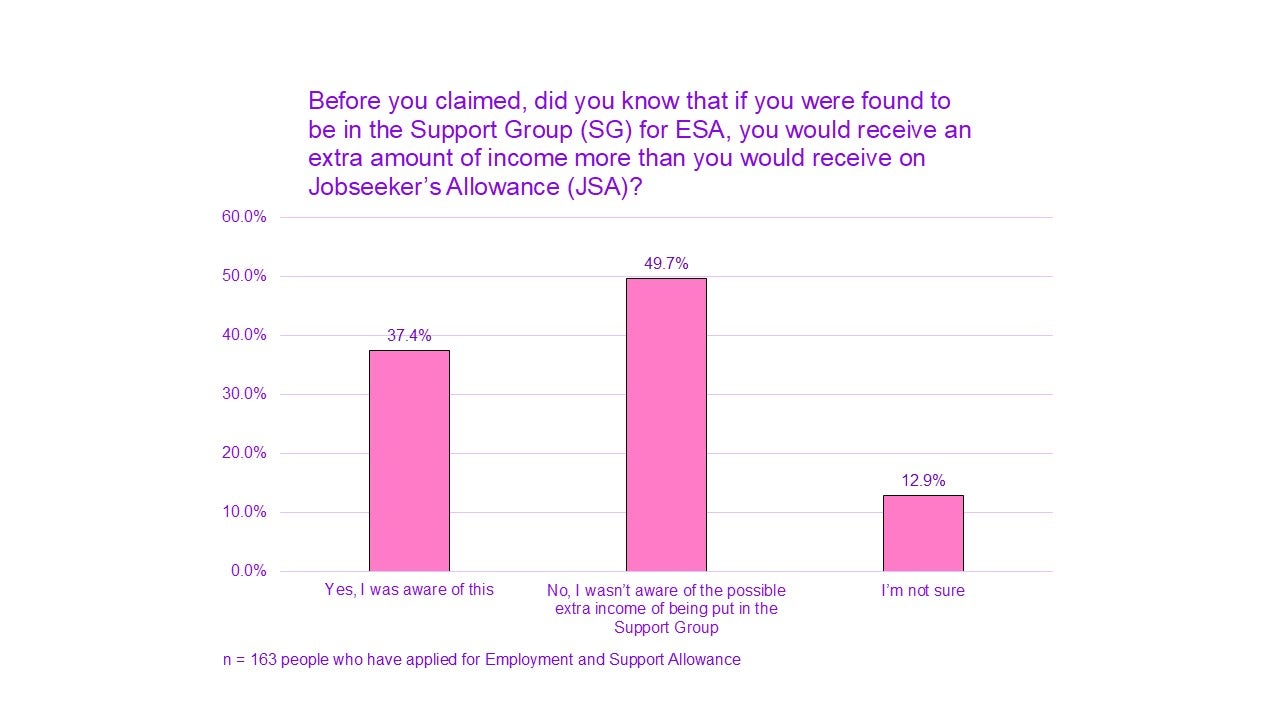
Before claiming, 61% of UC and 55% of ESA applicants were not aware of what the different groups meant in terms of possible conditions and sanctions.
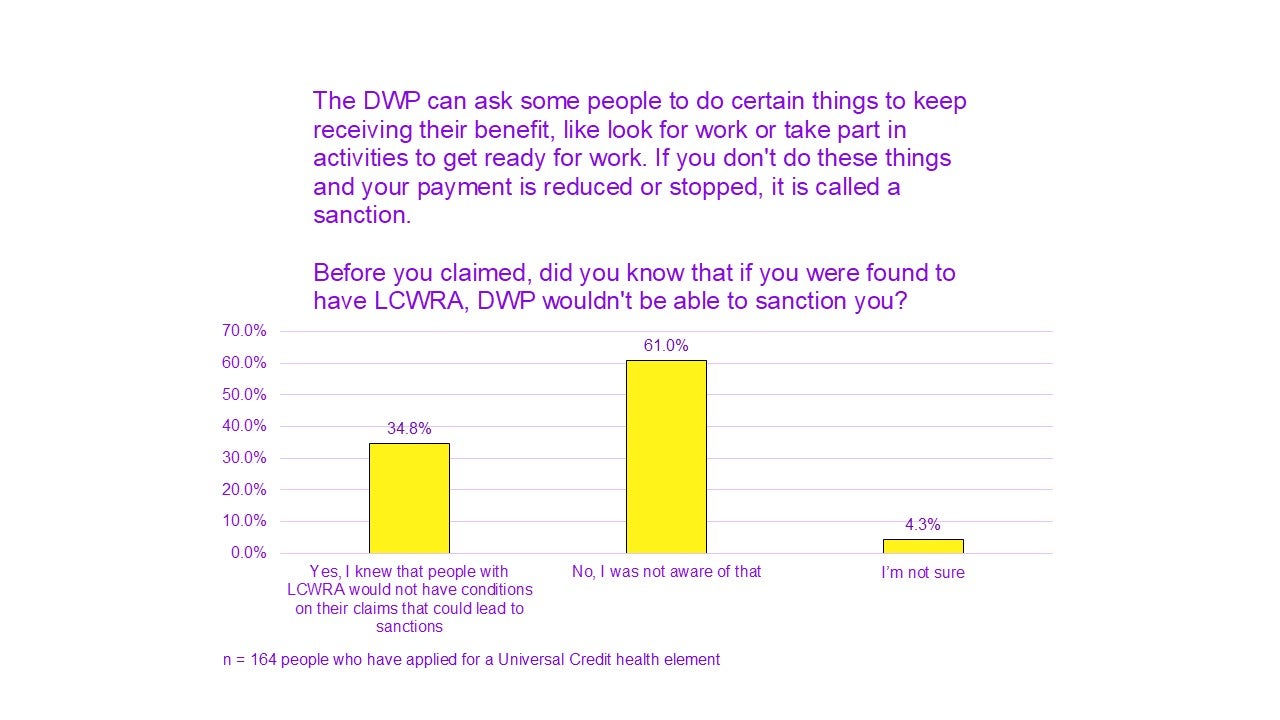
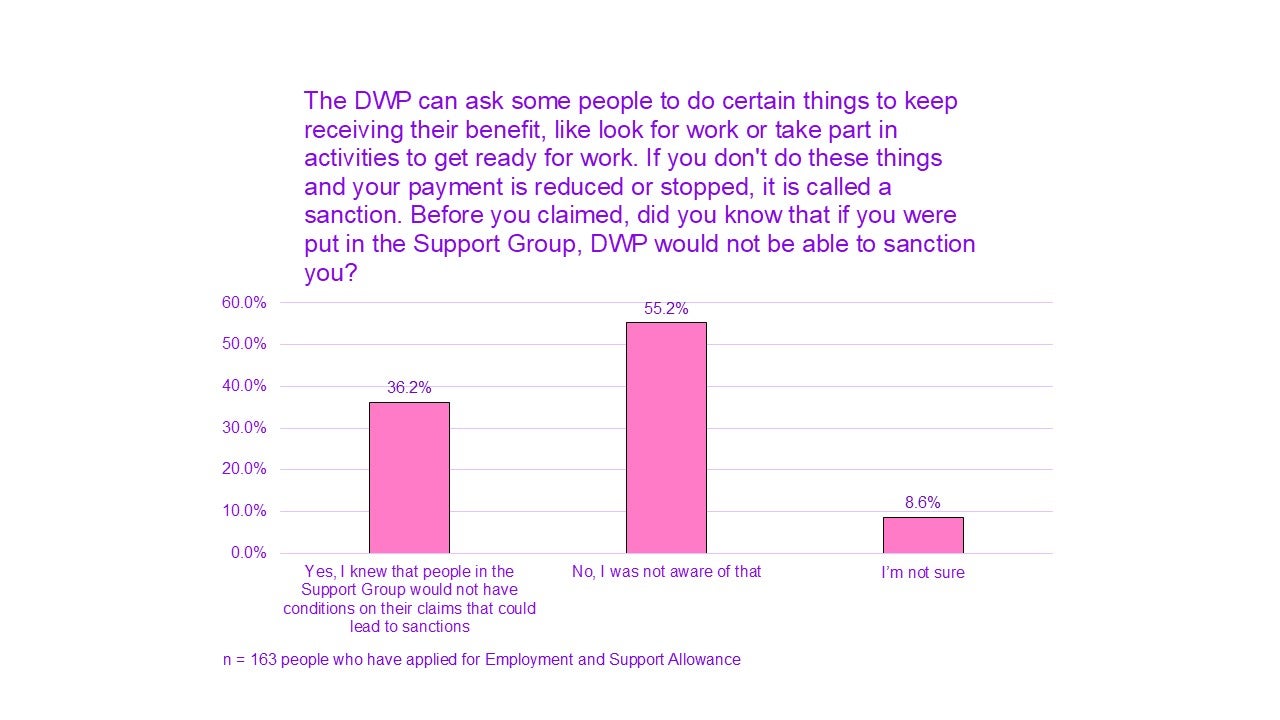
Assessment experiences
This section relates to people’s experiences at their assessment appointment. People’s overall opinions were more negative than positive, both in our discussions and on our surveys. Some have had a positive experience and felt lucky to have their needs acknowledged and validated. However, negative experiences were considerably more common. Some explained that although their assessment was straightforward, its emotional impact was still negative.
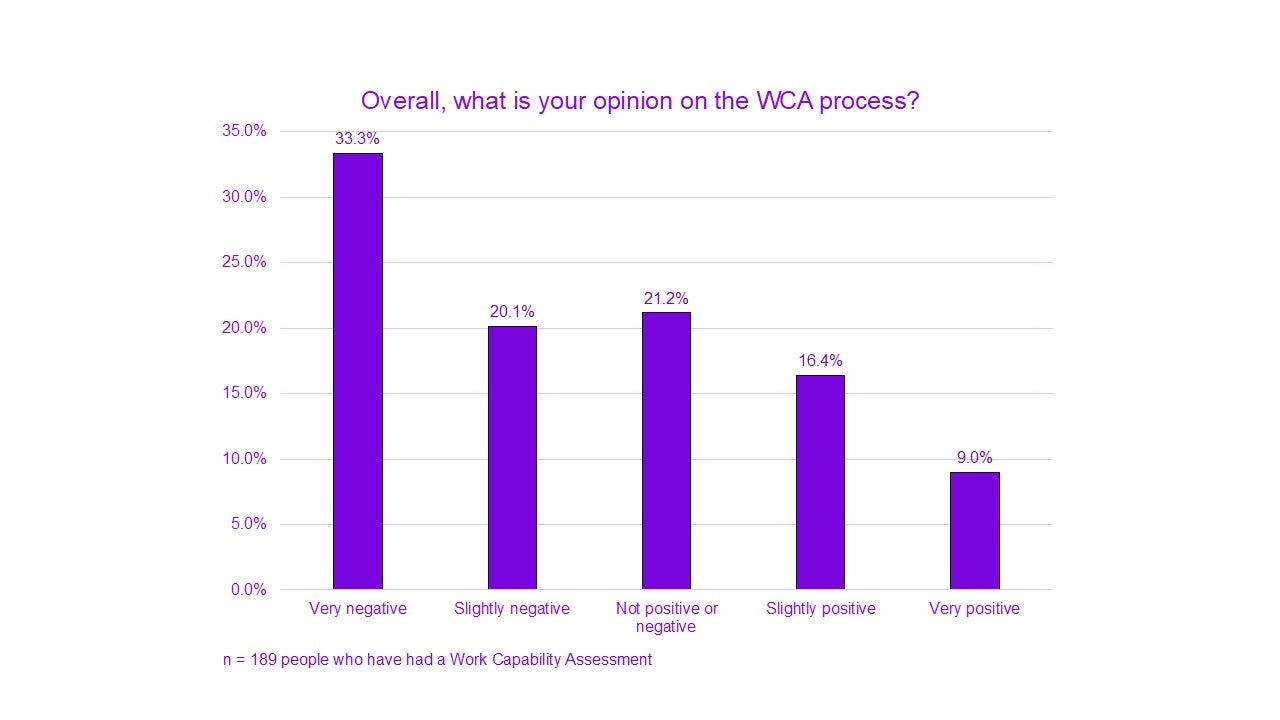
Unfit for purpose: a flawed structure
Inaccurate and unfair
Less than half (49%) of survey respondents felt the Work Capability Assessment (WCA) accurately captured the reality of their capability for work and work-related activities. A similar proportion (48%) felt the assessor at their WCA was able to make fair judgements on their capability for work and work-related activities.
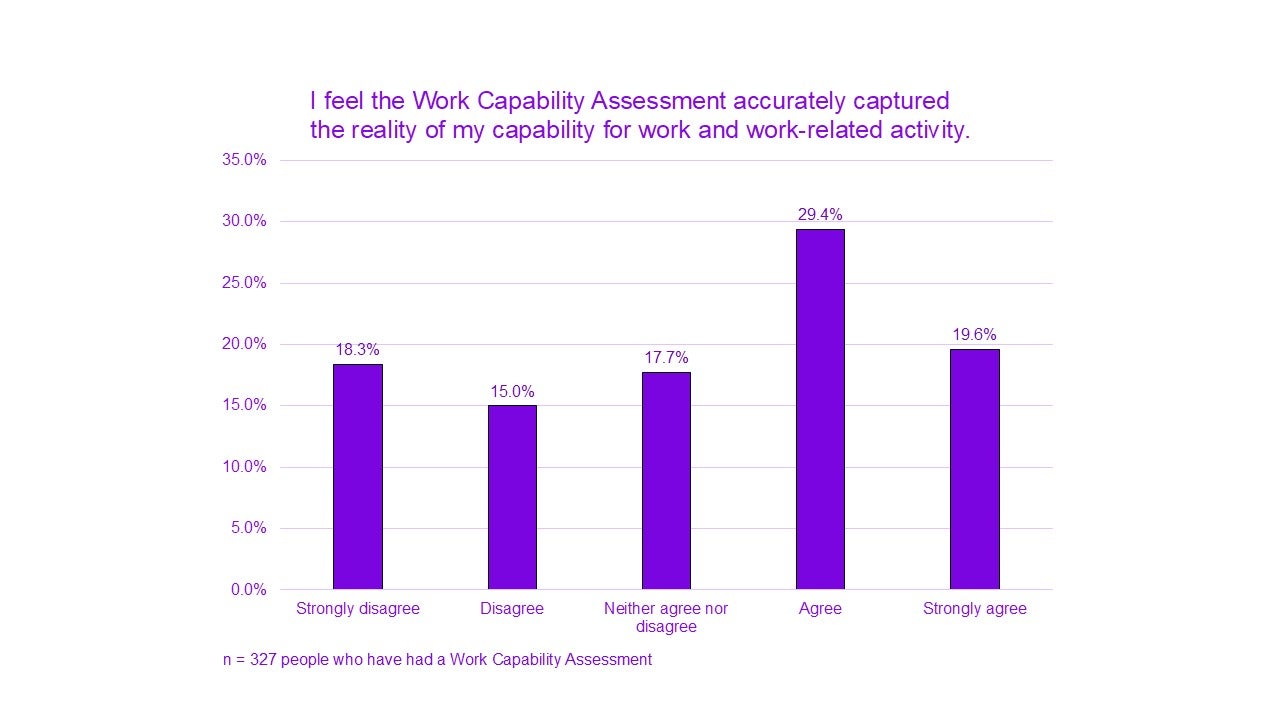
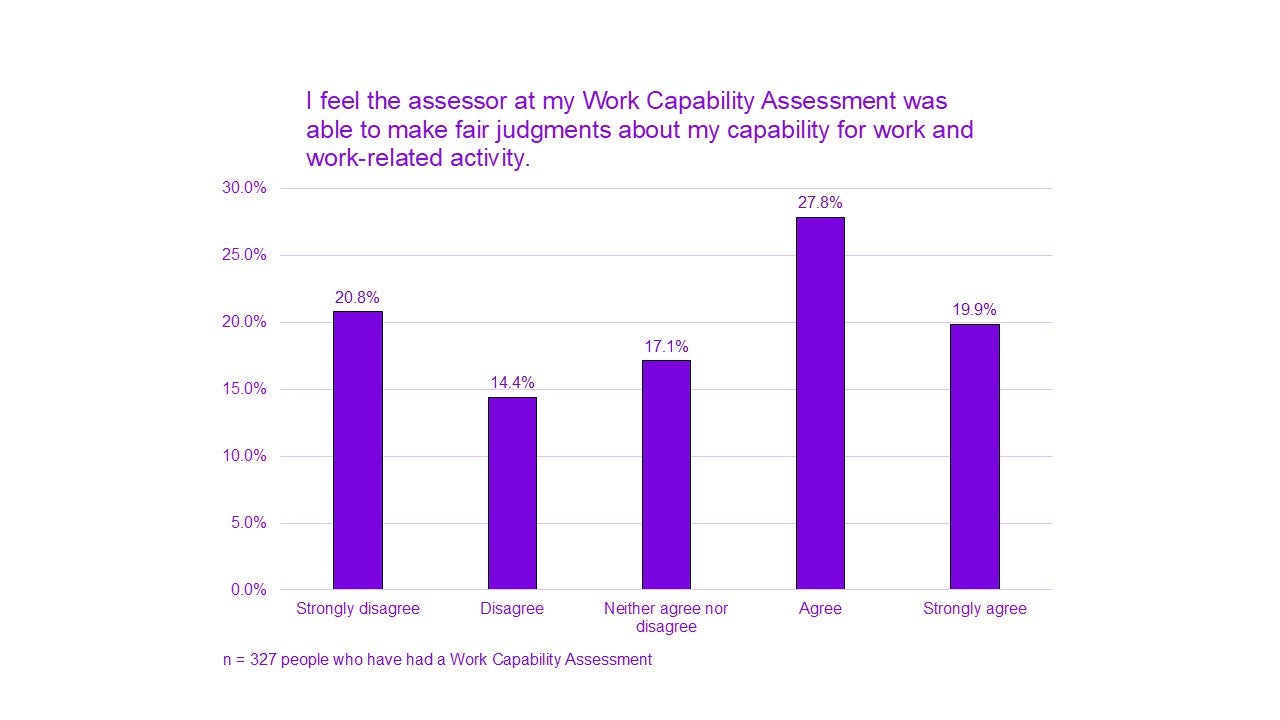
Assessors’ lack of knowledge in disability and access needs was obvious in many people’s experiences. This seemed to lead to superficial, inaccurate or simply wrong judgements about their capability:

It's quite hard, really, it's quite a hard thing to go through. It's difficult for somebody like myself, because we're, kind of, able-bodied, and obviously I can converse, everything is okay in that way, but quite often though, when you go for the assessment, they don't understand blindness and hearing impairments.” “…it's being assessed by someone who sometimes doesn't even know what your condition is, they literally said, 'I've never heard of that condition.' It's like, 'Okay, so how can you assess the validity of my claim if you've never heard of my conditions?
Inaccessible process and appointments
Many have shared finding different elements of the WCA process difficult. Sometimes it was nearly impossible. This was due to accessibility not being considered for the various stages of the process.
Several people have mentioned the capability for work questionnaire (UC50 or ESA50) to be extremely lengthy and confusing. They said they had to seek help for completing them. People said they were not offered help completing these questionnaires at the Jobcentre. Some have mentioned that when they asked for help, they were told it was not available:

I did try and ask the Jobcentre if they had someone in there that could help me fill out the forms because I really struggled with that and they said, 'Oh, no. We can't do that. That's not something we help with. You'll have to find someone else to help you, like a friend or family member.'
Indeed, people described getting help from Citizens Advice Bureau, friends or family instead.
The phrasing and focus of the questionnaire did not accurately capture the impact and barriers of many conditions and impairments, as one participant explained:

The questions are not phrased in a way suitable for mental or physical stuff, e.g. ADHD, autism, osteoarthritis, all fluctuating conditions impacting on our ability all the time, and you are asked to bring medications and physio stuff like squeezy balls etc.
Some have also mentioned struggling or not being able to access:
- information about the assessment appointment (including directions on how to get to the assessment centre)
- the assessment centre itself (the environment, building, and the room)
- requests made by assessors as part of the assessment
For example, one participant is legally blind and has a hearing impairment. She shared feeling lost when no adjustments were made to aid her in finding her way at the location of the assessment. She was also called to the room verbally only and was shown things physically on a screen and asked to sign it.
This lack of accessibility was also sometimes used against claimants. This was the case for the following participant whose assessment was held in a room with a door not wide enough to fit her wheelchair:

My very first assessment was in a room that wasn't even wide enough for my wheelchair. I had to close my wheelchair down and go through the door. So, of course, that went against me straight away. But that's not my fault that the door wasn't wide enough. She reported that I didn't look dizzy.
A slow and lengthy process
Although most were accepting of this reality, for many, the WCA claiming process took several months. The process was even longer for those who:
- were unwell (spending some or much of their time in the hospital)
- awaiting diagnosis
- had to appeal on their assessment’s decisions
This was at a time where they had no income from work, or their previous work income was stopped suddenly due to the changes in their health situation.
People having to request Mandatory Reconsiderations (where decisions are reviewed) or challenging the benefit decision at a tribunal adds significant delay.

It takes too long to get through to DWP to get forms, complete them, then the assessments and correct decisions.
Our discussions were focused on current claimants. This means the people we spoke to in depth all eventually managed to receive an award of health-related Universal Credit. But the lack of timely systemic protection for those who need it can cause real harm.
A discouraging and degrading experience
For many people, the timing of the assessment often found them in a particularly sensitive point. Many people were uncertain and anxious about their future and their capabilities. Some were still grieving over the changes to their health. The lack of informed expectations seemed to contribute to people’s worries and fears ahead of their assessment.
The assessment situation placed people in a highly vulnerable position. Claimants found themselves powerless in front of assessors. These judgements determined a meaningful part of their future. But assessors had no personal knowledge of them and their needs. There was also a sense that assessors were trying to challenge people’s barriers and symptoms, to be able to deny or reduce their eligibility.
The assessment seemed to focus solely on restrictions, rather than skills, abilities or potential. People said this forced a grim outlook on the future and on people’s worth. This was experienced as damaging to people’s self-esteem. It was also counterproductive to their potential future work prospects.

It, kind of, confirms the disability in the sense that you have the restriction, so it's going to be a lot harder for you to do anything in that way. I think it makes you think so much more about the process of working, in the sense of just applying for jobs and stipulating your disability in the sense of, will employers see this and then not want to employ you at all? Because you have this limitation. Definitely, I think it does impact your mental health as well with the anxiety towards it all.
Many have said they faced cold, uncompassionate and harsh treatment by their assessors. Some cases reached abusive levels:

I was able to walk very short distances with a stick and I was using a mobility scooter. The assessor picked up my stick and moved it to the other side of the room and said, 'Go and get your stick.' Not, 'Please-,' 'Go and get your stick,' and told me to get up without using the arms of the chair or holding on to the desk in front of me and I said, 'I'm not going to be able to do that,' and she said, 'No, go on. Do it.' I must have been about 25/26 at the time. I was in tears. It was 45 minutes in there. She wanted me also-, I've got PTSD and she asked me why I had PTSD. She wanted me to detail why I had PTSD and I said to her, 'That's not appropriate,' and then she said, 'Everything is appropriate in this room.' Utterly abusive and humiliating, and I was in tears, and when she opened the room she shouted, 'I'm sure you'll get what you want.'
Many described leaving the assessment in tears. They referred to their experience as traumatic or shared this experience led to a difficult period in terms of their mental health:

'I found it a really traumatic experience, the whole process broke me a bit.
For some, assessment decisions have had a long-term impact:

I knew I couldn't work because my body was telling me, 'You can't work.' So it wasn't that, but it was the fact that having it acknowledged and confirmed, literally I went suicidal to be honest with you. I got some help and I've been working on it ever since but, yes, I'm still battling with it. But, yes, it had a major impact on me.
No decision-making transparency, no objective records
Most claimants did not expect an accurate guide to the way WCA decisions are determined. But it appears that none of the way these decisions are made was shared with claimants at any stage. This meant people were not always able to make sense of their assessment decisions. They also could not understand exactly how their capabilities were judged. This was especially crucial if they wanted to appeal.
Currently, no objective records of assessments are made routinely available. The DWP’s current policy for recording of assessments states claimants have no legal right to a recorded assessment. The DWP has no obligation to provide them with one.
Audio recordings can be made available when asked for in advance, but this option does not seem to be advertised broadly. Access to assessment records is normally limited to the form filled at the assessment by the assessor. This is not offered to claimants but needs to be requested. One participant told us they managed to receive a copy of this form, but struggled to understand it as much of it was redacted:

I also requested a copy of my form, assessment, for my records after the appointment. I was sent around the houses obtaining it. Also, when it came it had more redactions than readable wording.
It is concerning that objective records are not available. There have been complaints on assessors' report. Several participants and survey respondents mentioned that assessors made false claims. Other times, they misrepresented what people had said on assessment records:

And they then actively lied on the form even though I was recording it.
Assessments are generally outsourced to third-party contractors. They are profiting from conducting these assessments:

…the attitude, the inaccuracies, the literally being brought to tears by DWP staff, by Capita, Maximus, you name it, new name third-party company employed by DWP.
Without an objective recording, most disabled claimants do not have evidence when trying to challenge accuracy of assessments and decisions or when complaining about assessors.
Experiences once awarded
Jobcentre engagement
Mutual suspicion
Claimants’ overall views of the DWP and Jobcentres were considerably more negative than positive. This is perhaps not surprising given the general lack of trust people have felt for the DWP over the years (Glover, 2019; Social Security Advisory Committee, 2020).
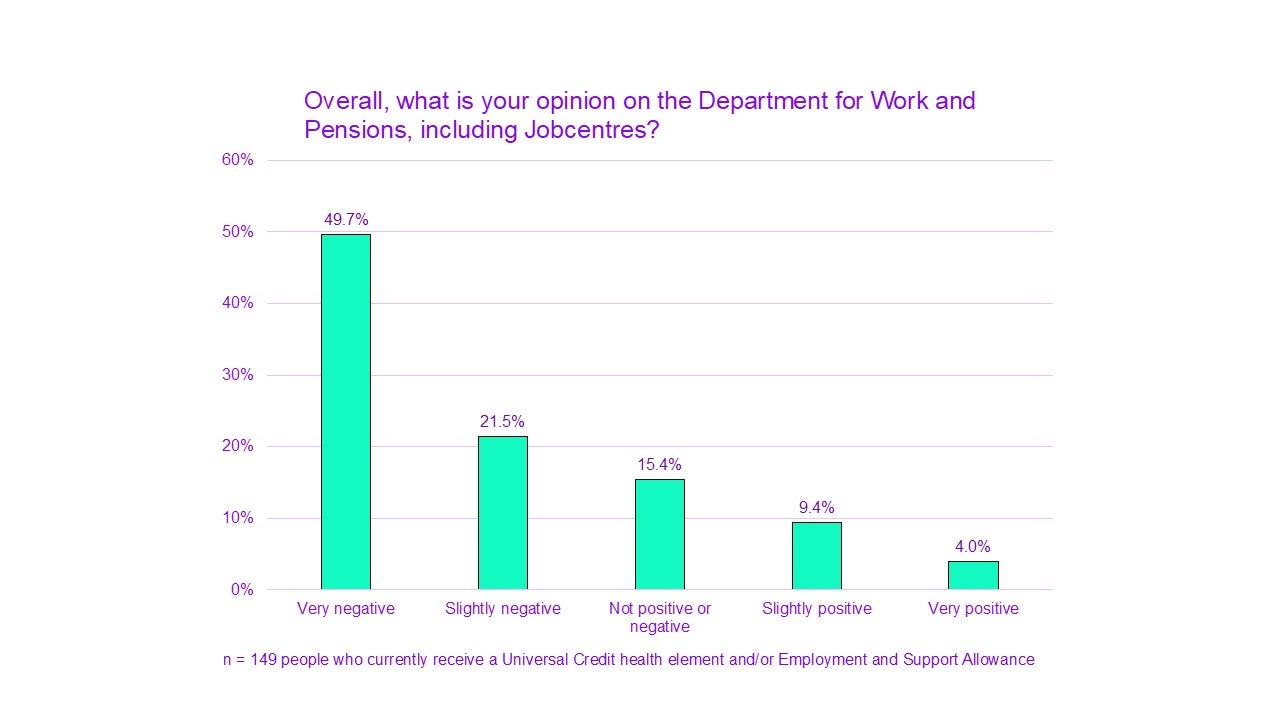
People have repeatedly mentioned feeling like they had to navigate the system’s suspicion towards them. People said that instead of being supported and understood, they felt monitored and penalised:

I think they put it on this sense of, 'We're watching what you do'. And it's that sense of they're waiting to catch you out when it's not necessarily that you're doing that, you're trying to just live your life. Everybody deserves to work, everybody deserves a sense of independence and do what they do, but it sometimes feels like you're punished for doing that in the way of if you want to go work, if you want to do something to get your independence back, they'll take that as a completely different sense of things in a way to gain more money back for the government than helping you.
Lack of communication and few to no contact options
Many claimants said they had very infrequent or no contact from the DWP, Jobcentre or work coach since they started receiving work-related disability benefits. This was nearly half for those receiving Limited Capability for Work and Work-Related Activity (LCWRA). This was part of what made Jobcentre employment support difficult to access for those who wanted or needed it.
![A chart titled "Since you started receiving [LCW, LCWRA or ESA], how often has [Universal Credit (UC) or] the DWP contacted you? This contact could be through the DWP, Jobcentre, or your work coach”.
I don’t know had 4.9% for LCW, 12.2% for LCWRA.
Never had 22.0% for LCW, 30.1% for LCWRA.
Less than once every couple of years had 7.3% for LCW, 13.5% for LCWRA.
Once every couple of years had 4.9% for LCW, 9.6% for LCWRA.
Once every year had 4.9% for LCW, 8.3% for LCWRA.
Once every 6 months had 14.6% for LCW, 6.4% for LCWRA.
Once every 3 months had 22.0% for LCW, 8.3% for LCWRA.
Once a month had 7.3% for LCW, 8.3% for LCWRA.
More than once a month had 12.2%for LCW, 3.2% for LCWRA.
n = 197 people. 118 currently receive a health element of Universal Credit, of which 31 have LCW and 87 and LCWRA. 79 currently receive Employment and Support Allowance, of which 10 are in WRAG and 69 in SG.](https://assets-eu-01.kc-usercontent.com:443/73ea709e-f9f8-0168-3842-ebd7ad1e23ac/4e2775fa-45e4-4c1a-8285-630fcfaa0870/Updated%20contact.jpg)
This was also true for when claimants had questions or needed benefit-related support. In our interviews and discussions, many have told us they struggled to contact the DWP or Jobcentre when they needed to:

… I also was just left without a work coach or anyone to be able to contact after getting put on LCWRA without warning.
A central communication tool is the journal. It is accessed through someone’s online Universal Credit account. This is used to update information, log required activities, and communicate about your claim. Claimants can leave messages for a work coach and receive messages back.
Many have told us they were directed to their journals with questions. Yet they received unreasonably late replies, and sometimes no replies at all:

If you've put a request into the journal you don't always get a reply. And you can write things several times and still not get a reply, and I think that's just rudeness. I know people are busy but it's their job to answer things on your journal. You've got no other way of contacting them, because if you ring up they say, 'Write it in your journal.'
A substantial amount of disabled people need support around their benefits. But there seems to be no service in place to support their needs as they come up and provide them with information. This means people were sometimes waiting for weeks, months or even longer for replies to their questions:

I've been asking for over a year and not been given an answer, even by employment work coaches, as they don't know, what income does our [National Insurance] NI contribution stop?
In some cases, this extreme lack of response left people in a helpless position and raised worries about sanctions:

I filled these journals in and they've not been looked at for weeks, I've asked a question and nobody's looked at it for weeks and weeks and weeks and then all of a sudden you get a response. But that's weeks down the line, you know, it's really difficult to even ring up your own local Jobcentre because it all goes through to one place to ask them a question. But you might need to contact that particular place to say, 'I can't come in and do this today.' And then you've not turned up and nobody's read your journal, nobody knows and then the next thing there's sanctions being applied.
This is also a significant barrier for those who are ready to move towards work. The difficulties with contacting the DWP or Jobcentre make it difficult to get support:

… I think the lack of communication in everything makes it so difficult overall to get anywhere with support.
Unsupported and misguided: difficulty accessing reliable information
Alongside the issues with communication, people struggled with the content of the answers they were looking for. It seems people were often not given clear, basic information about their benefits when they started to claim. So, they had to try and find information themselves. For many, it was difficult to receive accurate and reliable information about their rights and conditions. Even if they were current claimants at the Jobcentre:

I didn't know where to find the payments or anything like that, so I didn't know how to apply for an interim payment or anything because they don't tell you. You have to work it out yourself.” “You ask on the UC Journal and they give vague answers or incorrect answers.
It seemed that many struggled to find accessible information. One participant described their worries after being refused help from the DWP:

…Universal Credit is not clear, not transparent. And we are both autistic and we have both been asking for some organisation to provide us support, even the DWP and they've said, 'We are not an advice charity, we cannot provide support. Go to a charity.' There's no one that can provide us with that support. So, it literally feels like you could-, no, walking on eggshells. You could do anything, it feels arbitrary. You could look at somebody wrong in the Jobcentre and they could accuse you of abuse and you get your benefits sanctioned. Who knows what could happen?
Some described being misdirected, while others said they had to fight for things they knew they were eligible for. This was sometimes at a cost to people’s employment, financial or health situation. One participant, for example, was told they could not have a carer present at their job interview when they needed help to sign an expected contract:

Well, the only way or support I could do it is my auntie being there but I can't say this, 'Can my auntie come to an interview with me?' 'No.' How can she come in an interview and read anything to me? I have to read it by law. If I can't read it, how can I sign it? See where I'm stuck? I am stuck. I said this to the Jobcentre. They said, 'No, you can't take your carer to a job interview.' Thank you. 'That will look bad on you'.
Benefit details and permissions unclear
Following from the previously described issues, we found that a significant proportion of people were unaware or unsure about the details of their benefits. More specifically, people appear to be unsure about:
- Accurate award amount
- Work allowance: more specifically, LCWRA people were unsure about whether or not they’re allowed to work. They were also unsure how that might affect their award payments and entitlement
- If they were allowed to study while claiming
People explained they could see how much they were meant to be paid. Payment amounts are listed by element and by any other people on the claim. Deductions are also listed. But people often found these hard to understand. This means people were unable to work out if they were receiving the right amount. This made detecting underpayments very difficult.
Disabled people receiving these benefits are allowed to work. But there are slightly different rules between each group.
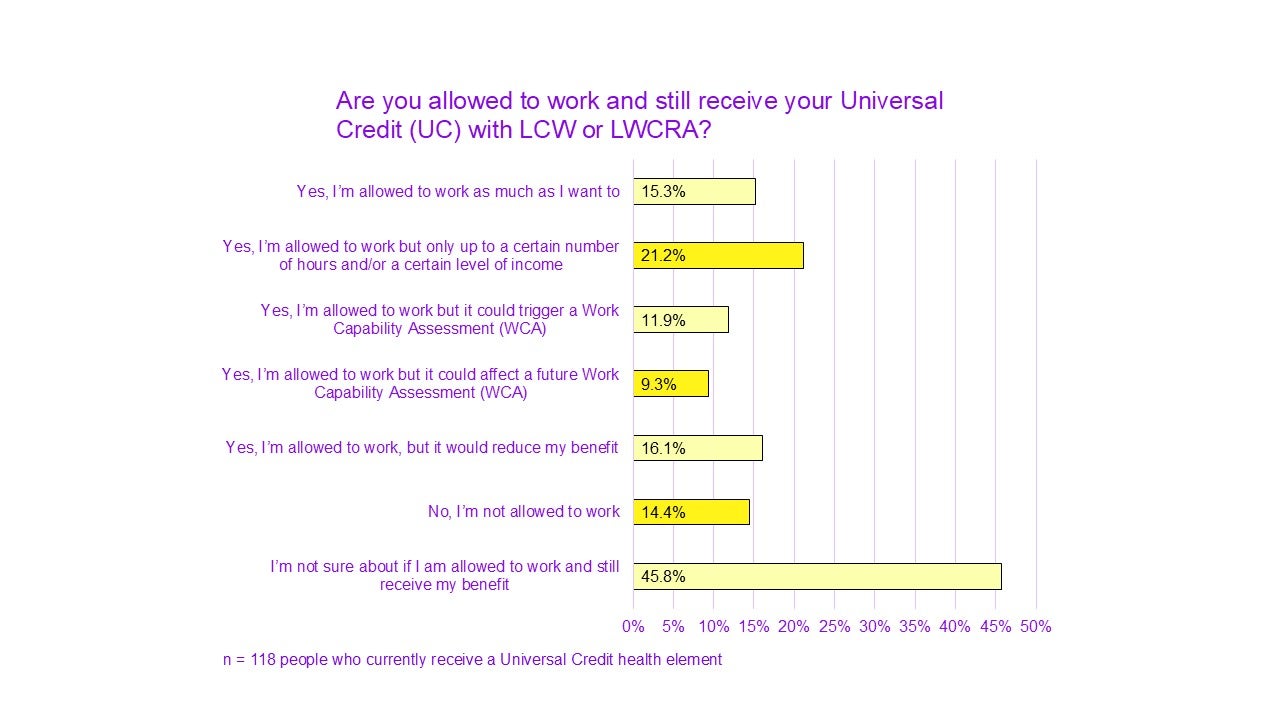
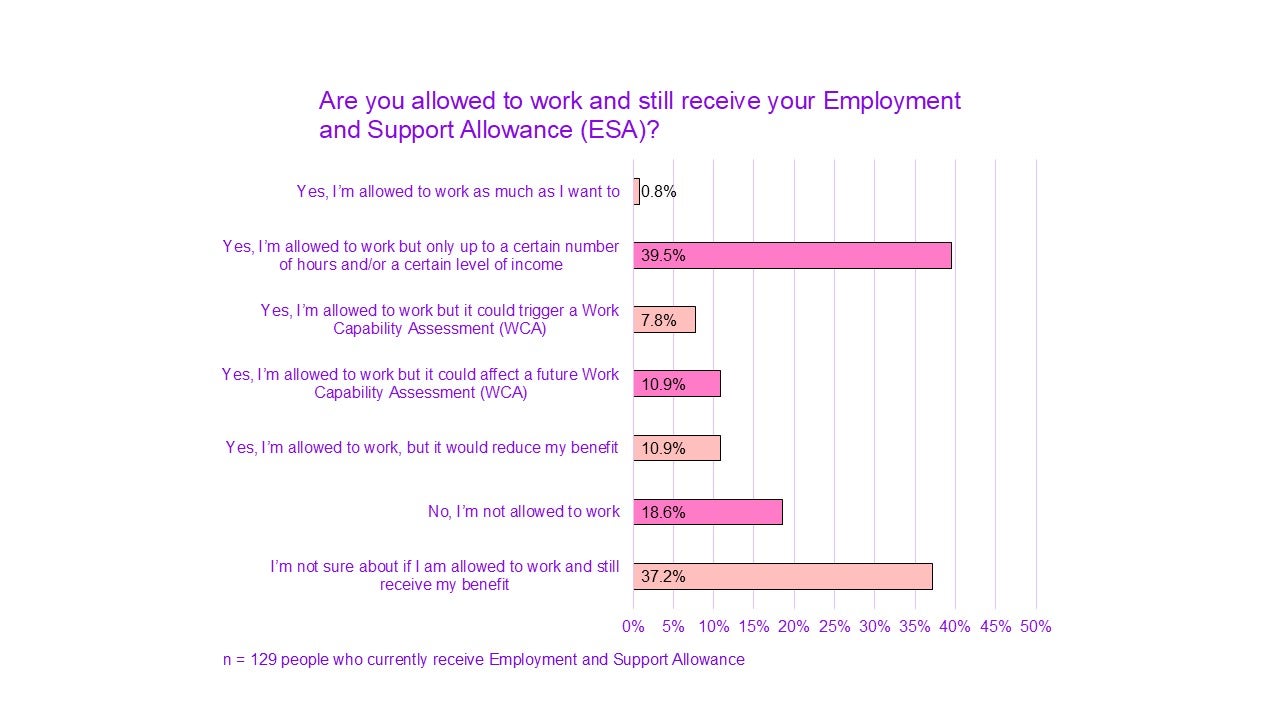
Overall, we found that 41.3% of 247 UC and ESA claimants were unsure if they are allowed to work while receiving their benefit. Nearly 17% (16.6%) thought they were not allowed to work at all.
There was also belief that working could trigger a Work Capability Assessment or affect a future assessment. Even though these benefits are for people who have limited capability for work rather than no capability at all.
Some of the people we spoke to were working. This was particularly on a self-employed basis where they could control and limit the work they were doing when needed. But others who were interested in such options had been told they were more limited or were given inaccurate information:

I spent over a year arguing with the Jobcentre and Universal Credit about getting the correct information regarding me working. So, the whole time they gave me wrong information in regards to-, they kept saying you had a certain amount of work hours that you could do in a month, which isn't correct on limited capability work related activity. It's a work allowance which, again, they wouldn't give me, and then they did, they gave it to me wrong. I worked that out. And then when I went self employed they gave me so much wrong information and I spent 3 or 4 months trying to get an appointment to talk about it with a self employed work coach.
One participant had been told they could not do any paid work at all. They became quite distressed during a group discussion where other participants were discussing their work while receiving Limited Capability for Work (LCW) or Limited Capability for Work-Related Capability (LCWRA):

They did categorically tell me, 'No, you cannot do any work whatsoever. Anything you make, pound for pound, we take it out of your allowance.' That is news to me. I'd really like to be pointed in a direction of any information about that because to be perfectly honest, this is actually almost bringing me to tears because I just feel lied to.
People also shared they were not told about how the transition away from benefits would work, if their paid work took them over the work allowance:

I also read that your claim remains open for 6 months after you start working above your UC cut-off. I was never told this by anyone in DWP.
Work coach experiences
Compliance over support
In line with people’s ratings of general views on DWP and Jobcentre support, we found only 11.3% of current claimants felt supported by work coaches.
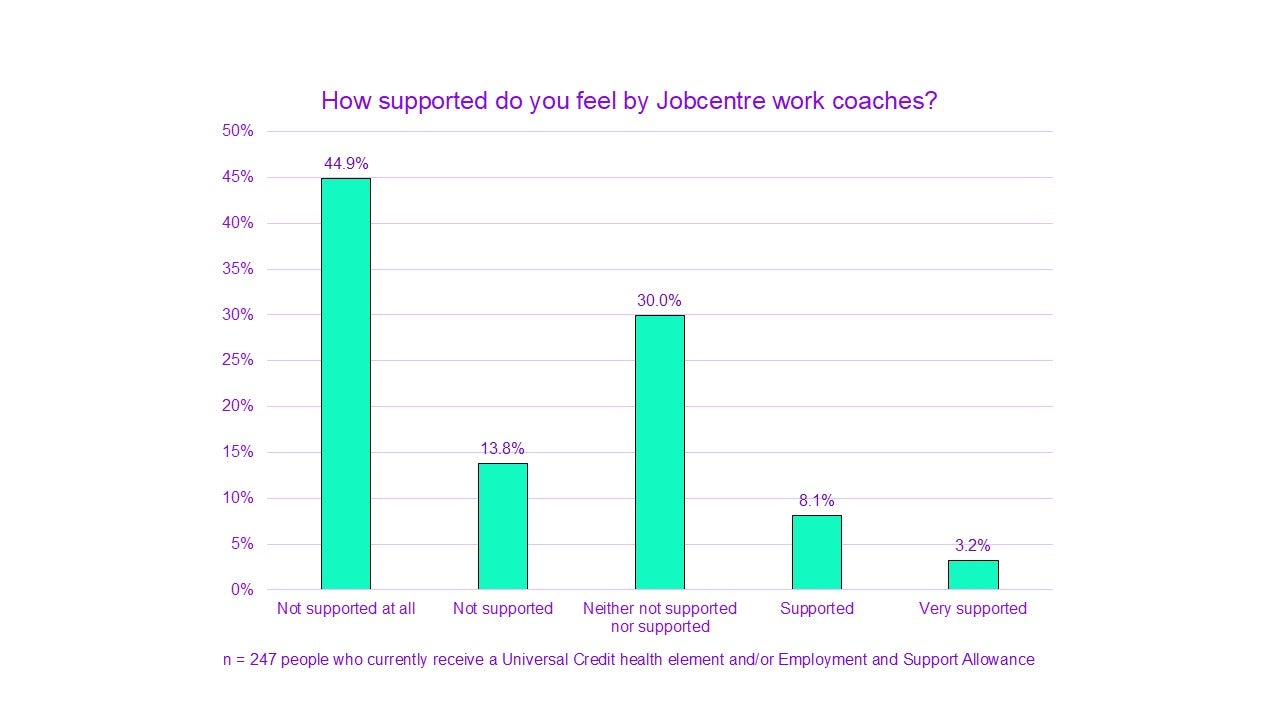
This is likely linked to the low frequency and quality of contact people had with work coaches.
People generally felt looked down upon and inspected, and wished for a more supportive attitude:

The Jobcentre staff treat you like you're incapable and offer no actual helpful support. We have enough struggles with health conditions, so it would have been nice to feel like the coach has empathy, and a want to help.” “I think, the government sees it just as, 'We're paying you money. Prove to us that you need the money'. And that's it. There's no, sort of, actual support or comfort for us trying to live.
An unempathetic, black and white approach: no individual support
An experience that was very common among people interacting with work coaches was feeling a lack of empathy. People did not feel like their individual circumstances were heard and considered. They did not feel like work coaches cared much about their goals or needs. Instead, they felt decisions were made for them based on external considerations and targets.
Only 12% said they trust work coaches to have their best interest in mind.
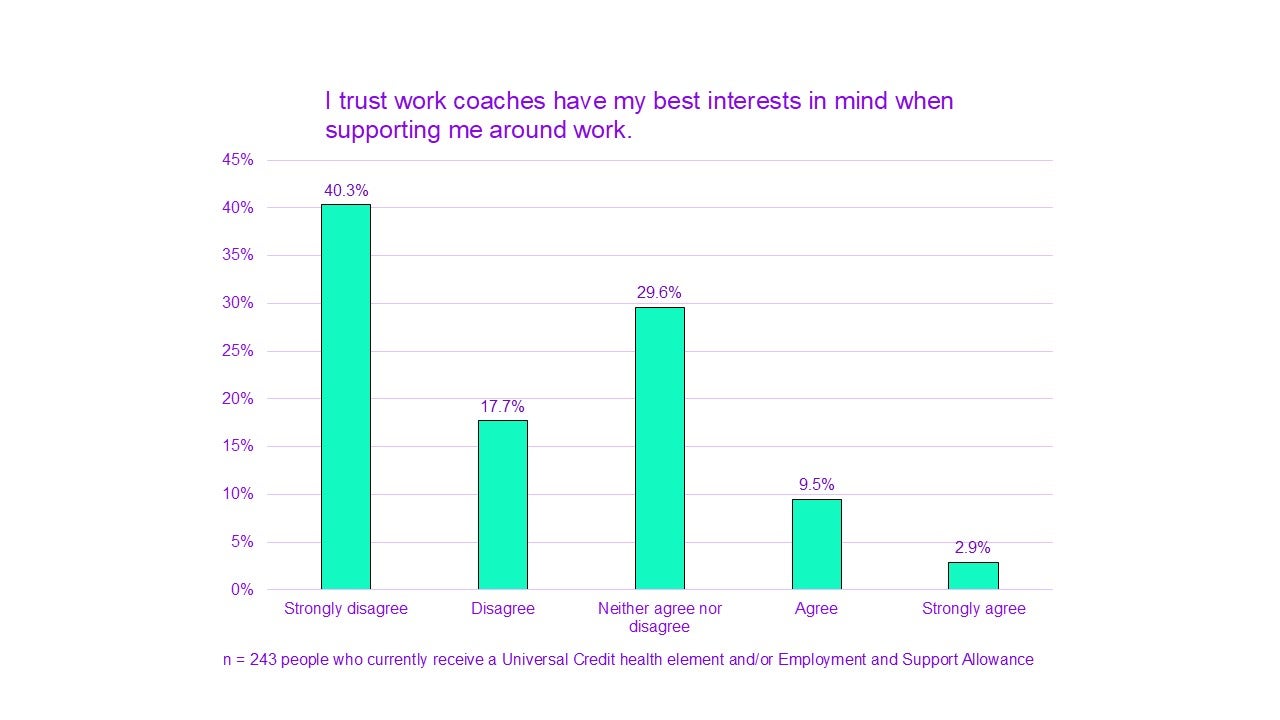
The binary approach that seemed to guide such decisions focused on labelling people as working or non-working only. This led to ignoring people's needs:

It's very much, sort of, they put everybody in 1 box and if you don't fit in that 1 box then, you know, you're not going to really get supported in the way you need.
Only 11% said work coaches were able to make helpful suggestions based on their individual circumstances and needs.
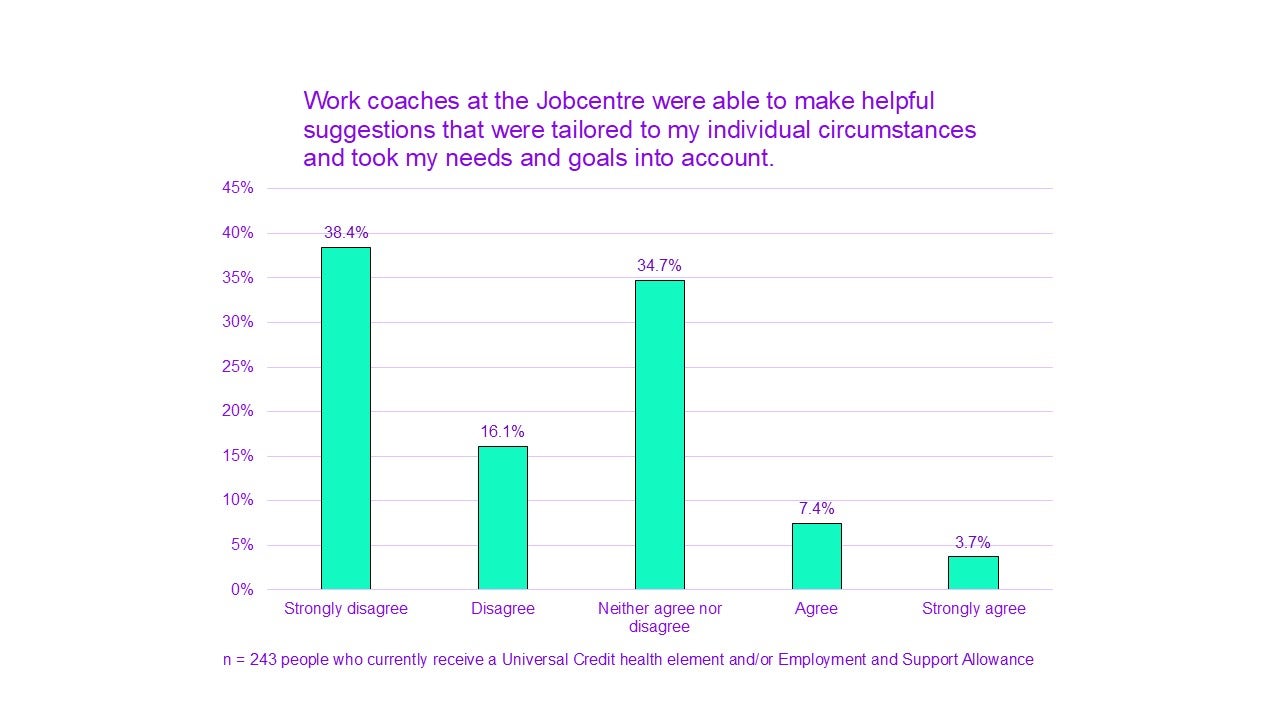
There did not seem to be much room for efforts to find solutions to suit personal requirements. More specifically, people we spoke with said the type of things they felt were not taken into consideration were:
- individual access needs
- personal interests and skills
- the fluctuating nature of certain conditions
- flexible (few hours a week) and self-employment options
Some have said these types of harsh and uncompassionate interactions had a negative impact on their self-esteem and mental health:

..I feel like I was treated like, 'Oh, yes. It doesn't matter about that because we just want you to, kind of, find a job.' And even though they hadn't had a decision back yet that I couldn't actually work and that's the reason I had been let go from my last job at that time they didn't really, like, consider that. So, I think I went through probably about 3 or 4 different work coaches and they were all pretty much the same. So, it was, kind of, a really frustrating process when you're struggling with your health. And then, it also made my mental health decline. So, I was just, like, 'All I want you to do is just help me here, rather than, you know, just ignore me and make me feel like I'm not a human.
The obligation attached to those meetings with work coaches has made such experiences feel even worse:

I think that it would be very helpful if the Jobcentre coaches had some kind of disability awareness training and they were taught, like, how to talk to people in those situations because I think the problem is lack of empathy. But also, you don't feel like you're being heard if you're having a conversation with them and then you just, kind of, go away back into the world thinking, 'Okay, I'm never going to be able to better myself,' because you're made to feel a bit like that. And it's really, like, degrading, really, to have to be almost forced to go to those meetings, but then having those experiences every time.
Highly variable level of knowledge and support
Work coaches’ lack of knowledge was one of the most frequently mentioned issues throughout our research. This mainly related to 2 types of knowledge:
- Knowledge about work and benefits
- Knowledge and understanding about disability
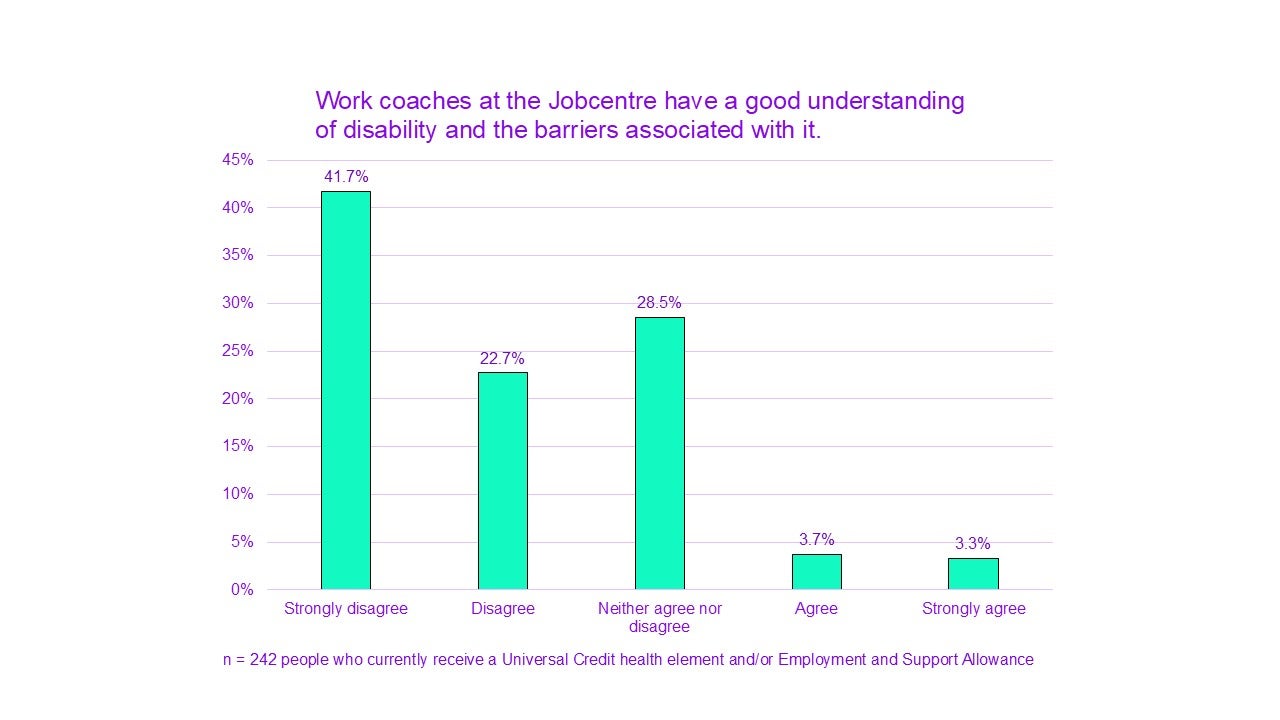
Only 7% of disabled claimants said work coaches had a good understanding of disability and the barriers associated with it.
People frequently emphasised a great need for extensive training to resolve this issue. Most claimants told us they did not have one or 2 dedicated coaches. And part of the problem also seemed to be that the level of knowledge varied considerably between different work coaches, as well as their general attitude:

I don't always get the same 1 and, depending on which 1 I get, some are more understanding than others.
This also meant people had to repeatedly explain their circumstances and often upsetting barriers to someone they did not know:

When I had more than one coach, it was just really distressing because it was a new person each time, having to explain my difficulties over and over again.
Positive experiences of work coaches
Only a couple of the people we spoke with had positive relationships with work coaches. While they were uncommon, the impact it had on their experience was very meaningful:

I had a very different job coach. I think I've been very blessed for the whole journey. When I first started with my work coach, they put me onto a place called Mentor, which helps for self-employment, and things like that. And I did a few courses through them, and thought I was just-, I couldn't. My brain was dead, and foggy, going through this, and then my work coach noticed that, 'Actually, you know what?' 'This is not working for you,' and that's when he suggested the work-related assessment.
Similarly, one participant said she was able to access disability work coaches following a move from Limited Capability for Work and Work-Related Activity (LCWRA) to Limited Capability for Work (LCW). She found this changed her experience entirely:

I asked for the disability work coaches, basically for the fact that it easier to speak to somebody that deals with disabilities than being pushed into work before I'm ready. …They're not forcing me into work, they're letting me do things at my pace.
In contrast to most people’s experiences, this shows the difference a knowledgeable, kind and sensitive attitude from work coaches can have on disabled claimants and their claiming journey.
Barriers to sustainable work
A significant proportion of disabled people we spoke to or surveyed told us they were interested in working now or in the future. However, the many issues in the job market and benefit system that make this difficult.
On one of our surveys, we asked people to rate several potential barriers that might make it difficult for them to work. This included moving into work, or working more than they already are.
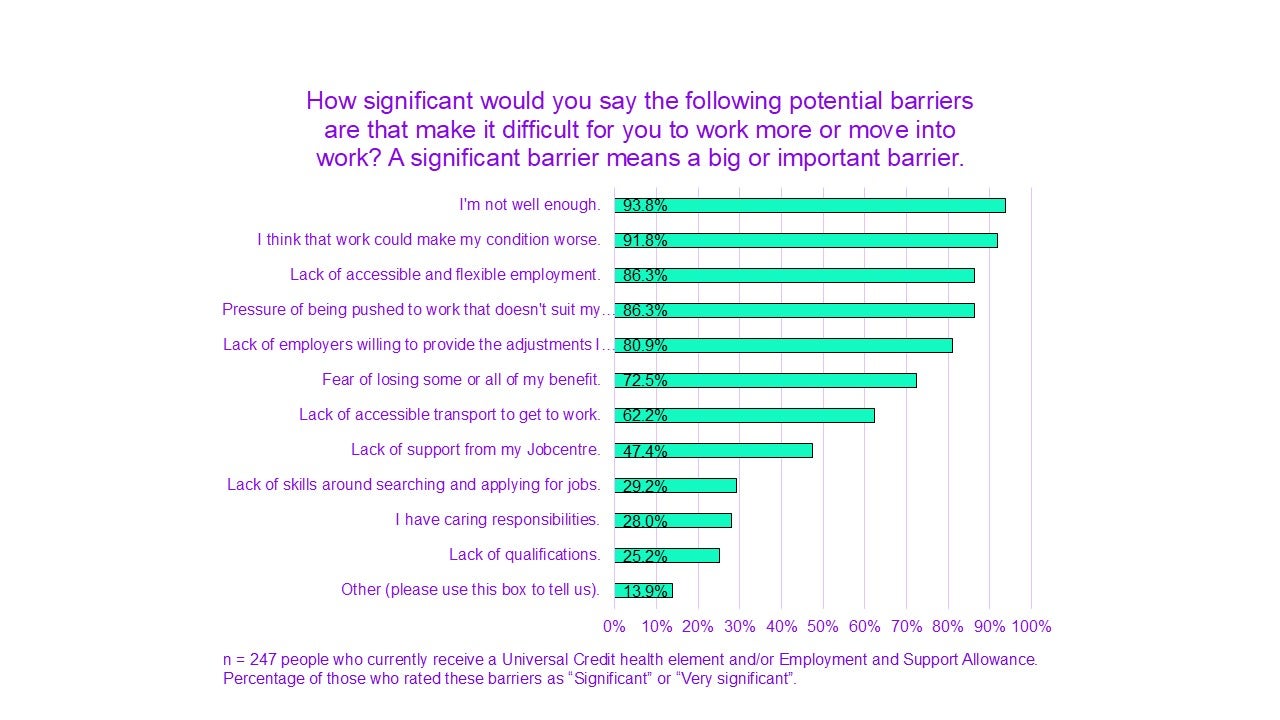
As will be described later, some of these barriers were created by the structure of the benefit system. Many others are about wider challenges for disabled people, such as:
- attitudes
- employers
- transport accessibility
Other than barriers about health, the joint more significant barrier (alongside lack of accessible and flexible employment) was one created by the system: being pushed to work that does not suit people’s needs and capabilities. Similarly, many rated fear of losing their benefits as a significant barrier, although health concerns and lack of accessible employment options were rated as significant barriers by more people.
People also said that a lack of employers willing to provide their adjustments was a significant barrier. A lack of accessible transport also came up high. People were more divided about lack of Jobcentre support as a barrier, although this may be due to issues to do with trust as well. Still nearly 50% rated it as a significant barrier. Caring responsibilities were not as widely considered to be a significant barrier. This is likely due to it not applying to many respondents.
Most of these barriers are not currently being addressed by the DWP in terms of offered support or targeted solutions. The exception would be Access to Work. This aims to support disabled people with transport, equipment and support needs in the workplace. Another exception is the Disability Confident scheme. Employers sign up to meet certain standards for disabled applicants and employees. Although these do not appear to be effective enough at removing barriers to employment for disabled people.
Most Jobcentre support currently offered is focused on searching and applying for work or gaining confidence and qualifications. These were described as less significant barriers to disabled claimants.
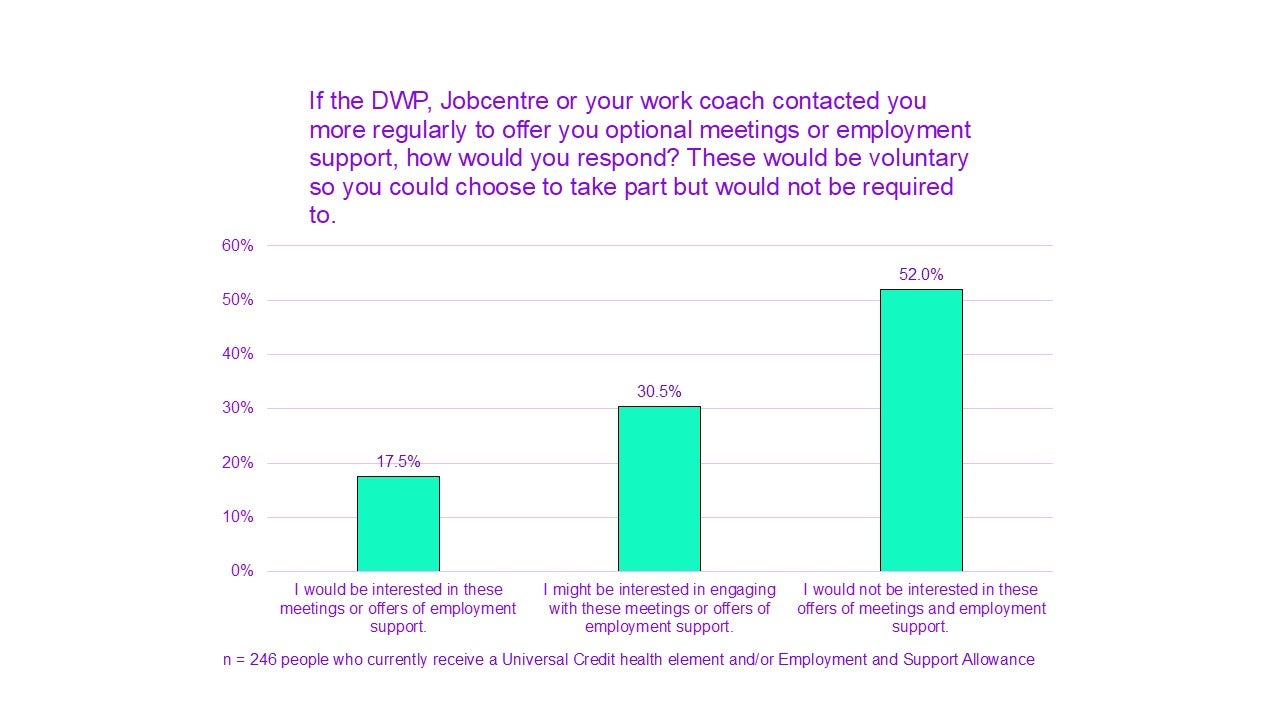
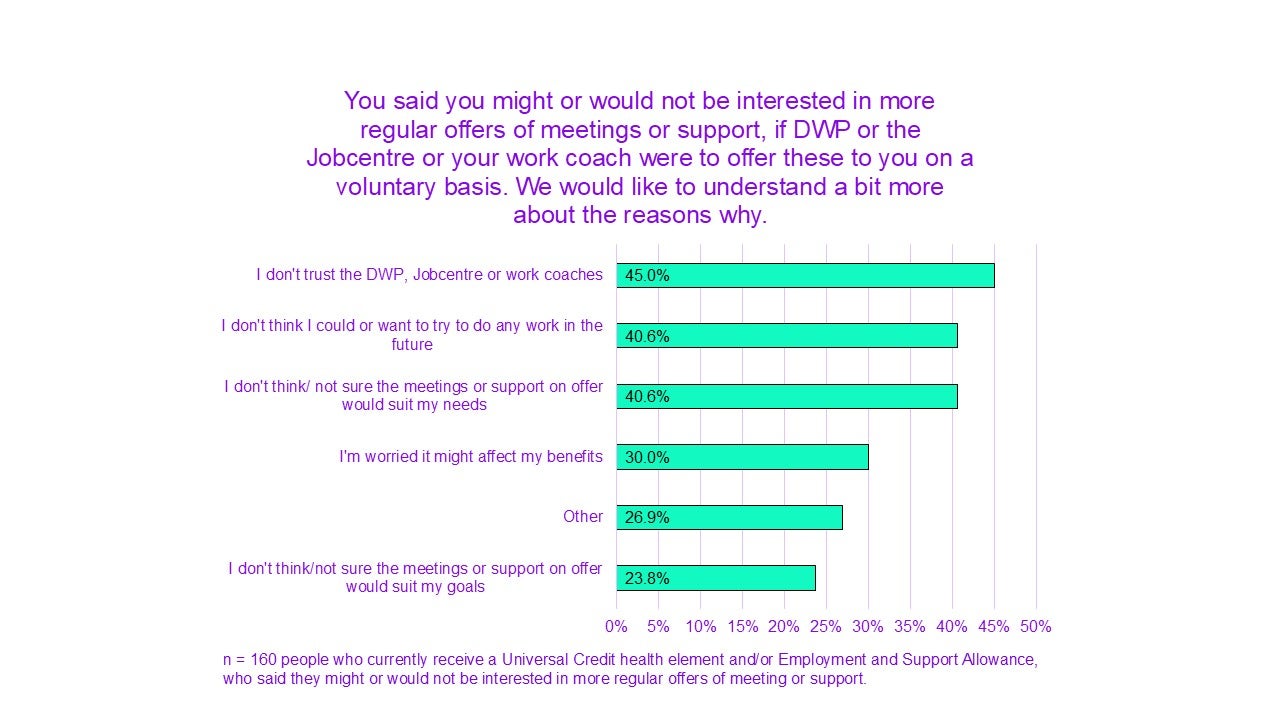
The job market
Many participants have indicated one of the main issues may be the job market itself. Given disabled people’s experiences of employment and looking to work, it became clear that major barriers with the current state of the job market must be addressed for any reform to bring about meaningful change.
Lack of suitable, safe working options
Many people highlighted that unlike some public perceptions and political portrayals, the job market did not offer remotely enough suitable options for disabled people. This includes:
- Availability of flexible, part-time and fully remote jobs
- Accessibility
- Availability of adjustments in the workplace, and employers willing to put them in place

It's also, I would say, how many workplaces have adequate wheelchair access? I can barely get in the majority of shops, let alone the majority of offices. So, how on Earth am I then expected to go and work away from my home? But then, there aren't the actual remote positions available, because there is now this massive push to back to the office. So, that falls completely flat on its face.
People have also pointed out the lack of enforcement of the Equality Act 2010 and other employment laws. This meant the availability of flexible and accessible jobs remains low. And employers or other organisations can continue to discriminate, not make adjustments and otherwise penalise disabled people.
The high cost and emotional demands of legally challenging discrimination means this is out of reach for many. Even with Legal Aid funding in eligible cases. Those harmed by violations of such laws are left unprotected and powerless against it:

So, as of April this year, am I right in thinking that anybody from their first day of work could apply for flexible hours? I think that's the rules that came into place, but that just doesn't seem to work in practice and like so much of the Equality Act and so many other pieces of non-criminal acts, if you find that your employer isn't standing up to it and you're not in a profession which comes under a union or you're not part of that union for whatever reason, you're stuffed.
Some have emphasised the absurdity of the government placing the responsibility of moving into work on disabled individuals, when so little is done to properly support them and enable it:

You know, people shouldn't be reliant on having to jump through hoops on their own. Too many people are having to fight battles on their own and they shouldn't be having to and it's beyond frustrating. I've seen so many people lose jobs because, yes, their conditions have worsened and I think that it's not just unfair, it is actually illegal, but the fact that we don't have anybody backing us up is ridiculous.” Lack of support to stay in work.
People we spoke with also mentioned additional issues they struggled with at work. They needed adequate support to be able to maintain their employment. At the same time, there was a need to make sure any health or care commitments could be continued without harm to their health or financial situation. This needed to be in place routinely for long-term conditions or impairments, or when their health might deteriorate. Some of the support elements people mentioned needing included:
- Time off for attending appointments
- Appropriate adjustments
- Adequate Sick Pay policies for when people are not well enough to work
- Flexibility for those with caring responsibilities
Some have also pointed to barriers that could arise from external factors, namely health and social care. With inadequate social care, work or work-related activities become impossible or unsustainable for some:

It's this constant thing of, 'Well, you know, volunteering is good for your mental health.' Okay, cool. Burnout is also not good for your mental health. How can you be volunteering if you don't have the support hours to physically get out of the front door?
Others had been waiting for a long time for planned NHS treatment or were not eligible for it in the first place. High thresholds for referrals and long waiting lists were repeatedly mentioned. Some people also had conditions or impairments which could not be improved through better access to health services. Lack of NHS help can cause extended periods of poor or worsened health and wellbeing. Some people directly linked this to the increase in those unable to sustain full-time work due to health or disability:

Health-related worklessness? Get the flipping NHS sorted out, and get mental health services sorted out, and you might have some chance of getting people back to work.
One participant also highlighted the added challenge of working while being an unpaid carer. This could apply to being a disabled parent of disabled children or young people. But also to having caring responsibilities for another disabled adult.

One thing that I feel is not being talked about here in at all in any shape or form though is how many disabled people are also disabled parents of disabled children. That is part and parcel of why they drop in and out of work is sometimes they are dropping in and out of work because of their own health. Sometimes they are dropping in and out of work because they needed to be staying at home and caring for their children.
A fear-filled system: risks created by the benefit system
Risks created or worsened by the benefit system were major barriers for many considering a move into work. This seemed to be mainly due to the way the system is structured and the way it operates.
A major characteristic of the work-related benefit system is fear. Current claimants did not have a sense of being cared for or supported when they are struggling. As a result, they were continually worried about aspects of their claiming and their potential consequences. Fear was a dominant feeling associated with the system. This included fear about:
- Potentially losing your award or eligibility
- Not knowing when you may get reassessed
- Being pushed to work
- Sanctions
This added stress to people’s lives and had a negative impact on their well-being.
Worries about engaging with work-related support
The current system is set up so that any engagement towards work appears to introduce additional risks. This puts people off trying and makes thinking about support much more stressful than it should be.
![A chart titled "You have said you are worried about your benefits being affected if you engage with appointments or support. I worry engaging with appointments or support could affect my benefits because:”
It could result in me being asked to do things that I cannot do, which might result in my benefit being sanctioned had 78.0%.
It could trigger a WCA reassessment (or affect a future reassessment), at which I might be found ‘fit for work’ had 76.0%.
It could trigger a WCA reassessment (or affect a future reassessment), at which I might lose the protection from being sanctioned that [having LCWRA or being in the SG] provides had 74.0%.
It could affect my Personal Independence Payment (PIP) award had 70.0%.
It could trigger a WCA reassessment (or affect a future reassessment), at which I might lose the extra financial support attached to [having Limited Capability for Work and Work-Related Activity (LCWRA) or being in the SG] had 70.0%.
Something else had 24.0%.
n = 50 people who currently receive a Universal Credit health element and/or Employment and Support Allowance, who said they were worried their benefits might be affected if they engaged with appointments or support.](https://assets-eu-01.kc-usercontent.com:443/73ea709e-f9f8-0168-3842-ebd7ad1e23ac/e01cf983-bade-4b3a-90a8-3bec6d9ad6be/Losing%20benefits%20support.jpg)
All of these worries are significant barriers for engaging with work-related support: 78% of people worried that they could then be asked to do things that they could not do, which would result in a sanction.
76% were worried it could trigger a WCA which could result in them being found “fit to work”.
A constant worry for many was that any step towards trying out work or volunteering could trigger a reassessment or being pushed into work:

I think if they used it in the way of, 'You're able to sit and do a course, so you're able to go to work full time', that would definitely be something that I would probably be more hesitant around. Because these courses, sort of, you do it at your own pace, you can take as long as you want and everything's really spaced out to allow that.”
This may be part of the reason why 34% of survey respondents had chosen to use support from non-DWP organisations.
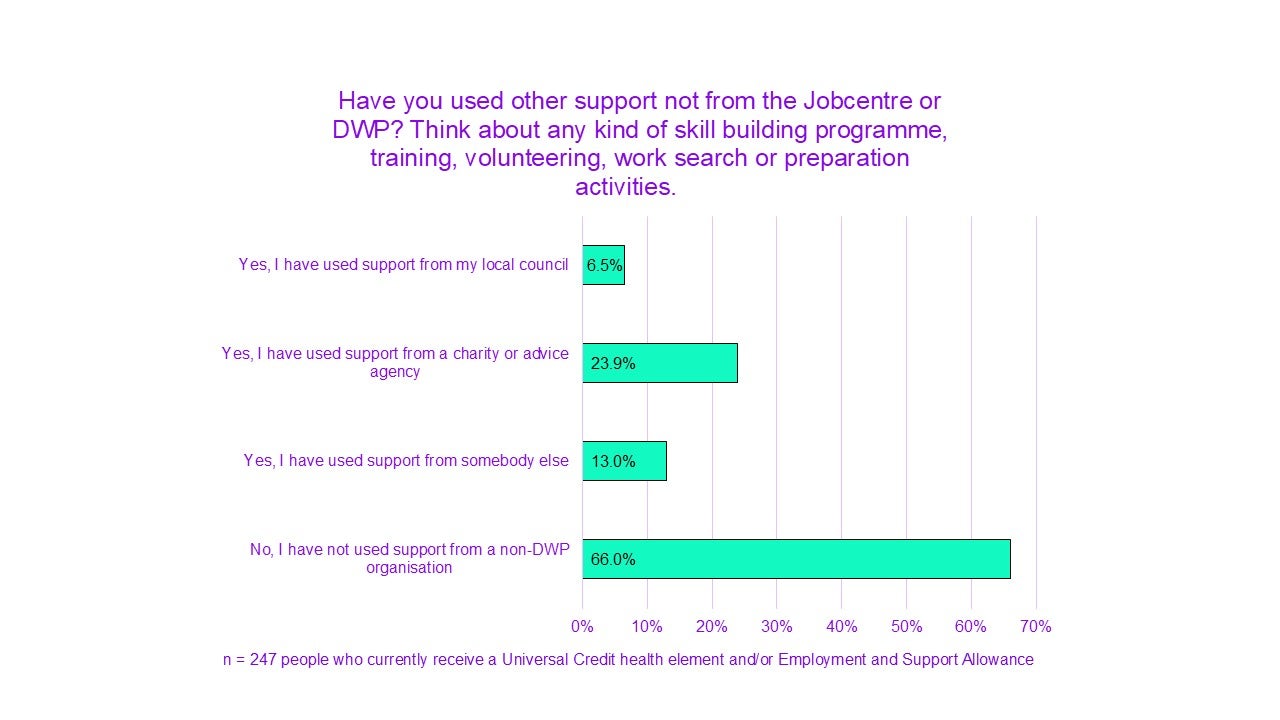
Information sharing between support organisations and the DWP was a worry for many. People were aware that engaging with work-related support and services could be noted by DWP:

You know, who do you trust? That's the biggest issue. It's like you can't trust anybody because you don't know if they're going to go and talk to someone else who will then contact you and say, 'Well, we've heard from Mr, you know, So and So that you're doing volunteering, so that means you're capable to work.
Fear of being pushed to work
![A chart titled "You’ve said you’d be worried about losing some or all of your benefit if you move into work or take on more work. Worry that moving into work or taking on more work, could result in my losing my benefits because:”
It could mean I come off [UC or ESA] but then if the job doesn’t work out, I’ll not be able to reclaim all my previous health-related entitlements had 62.1%.
It could mean I come off [UC or ESA] but then if the job doesn’t work out, I’ll have to go through the stress and worry of another WCA had 59.8%.
It could trigger a WCA reassessment (or affect a future reassessment), at which I might lose the extra financial support attached to [having LCWRA] or being in the [Support Group] had 50.7%.
It could trigger a WCA reassessment (or affect a future reassessment), at which I might lose the protection from being sanctioned that [having LCWRA or being in the SG] provides had 49.8%.
It could trigger a WCA reassessment (or affect a future reassessment), at which I might be found ‘fit for work’ had 47.5%.
It could affect my Personal Independence Payment (PIP) award had 42.5%.
It could mean I lose as much in benefits as I gain in earnings from work had 42.0%.
The additional income from work will not be enough to make it worthwhile had 38.8%.
I worry about getting by during a period between my benefit stopping and being paid my first pay cheque had 36.5%.
I worry about having to claim UC if the job doesn’t work out and I can no longer reclaim ESA had 26.9%.
Something else had 11.4%.
n = 219 people who currently receive a Universal Credit health element and/or Employment and Support Allowance, who n = 219 people who currently receive a Universal Credit health element and/or Employment and Support Allowance, who said they’d be worried about losing some or all of their benefit if they move into work or take on more work.](https://assets-eu-01.kc-usercontent.com:443/73ea709e-f9f8-0168-3842-ebd7ad1e23ac/5c234221-3b2b-4702-950e-51e5eee4dc37/Losing%20benefits%20work.jpg)
People are worried that if they try work and their job does not work out, it will be hard to reclaim with their previous entitlements (62%). And they will have to go through the stress and worry of another WCA (60%). People also worried it could trigger a new WCA, for those who would work while staying on UC or ESA (under the earnings limit).
A fear of being pushed into work was an extremely common theme throughout our discussions. This related to both being pushed to work when unable or not ready for it and being pushed to work that was unsuitable.
This fear appeared to be a result of a combination of factors:
- Worries about potential harm to people’s health
- Being actively pushed to work
- The DWP’s general perceived aim and approach
- Work coaches’ attitudes and lack of understanding of disability and access needs
- A lack of control over decisions
- A lack of trust in the DWP and work coaches
- Social and political pressure
Several people have told us they have been pushed in that way or threatened:

Basically, I got told, 'You need to go to work full-time, if you don't go to work, then we could sanction you.
People worried about the way being pushed to work could influence their physical and mental health. The also worried about how they will be treated once that happens:

And we said at the time, the biggest fear for a lot of people is if you push them into doing something, they haven't got a fallback, and how quickly can they fall back? Well, they're saying that you will be able to go back, but what do you have to prove, though, to do that? Am I then going to have to go through the process of saying, 'Well, actually, no, I can't do this'? And then they're going to say, 'Well, what if you did it this way?' Or, 'What if you did it that way?' We've no trust in them, that's the problem, that they will look after us.
Those who choose to move into or towards work are doing so knowing it could pose risks to their health, wellbeing and financial situation:

And I think that is definitely a concern, where if you go to work and then that they decide that you can't have this support anymore, in my head I might say, 'Well, if I get a job but then I realise I can't work it because I'm not well enough, then if I lose this money, then I've just shot myself in the foot'. So, it's this process of waiting to see if I get better which, with my condition, it's not likely I will get better, but then trying to find a job where the employer will make adaptions and adjustments and I can also work it to the level I can work it and finding a balance between working the hours to earn enough money to cover the loss that I'll then get from the benefits, if that makes sense.
![A chart titled "You’ve said you’d be worried about losing some or all of your benefit if you move into work or take on more work. Worry that moving into work or taking on more work, could result in my losing my benefits because:”
It could mean I come off [UC or ESA] but then if the job doesn’t work out, I’ll not be able to reclaim all my previous health-related entitlements had 62.1%.
It could mean I come off [UC or ESA] but then if the job doesn’t work out, I’ll have to go through the stress and worry of another WCA had 59.8%.
It could trigger a WCA reassessment (or affect a future reassessment), at which I might lose the extra financial support attached to [having LCWRA] or being in the [Support Group] had 50.7%.
It could trigger a WCA reassessment (or affect a future reassessment), at which I might lose the protection from being sanctioned that [having LCWRA or being in the SG] provides had 49.8%.
It could trigger a WCA reassessment (or affect a future reassessment), at which I might be found ‘fit for work’ had 47.5%.
It could affect my Personal Independence Payment (PIP) award had 42.5%.
It could mean I lose as much in benefits as I gain in earnings from work had 42.0%.
The additional income from work will not be enough to make it worthwhile had 38.8%.
I worry about getting by during a period between my benefit stopping and being paid my first pay cheque had 36.5%.
I worry about having to claim UC if the job doesn’t work out and I can no longer reclaim ESA had 26.9%.
Something else had 11.4%.
n = 219 people who currently receive a Universal Credit health element and/or Employment and Support Allowance, who n = 219 people who currently receive a Universal Credit health element and/or Employment and Support Allowance, who said they’d be worried about losing some or all of their benefit if they move into work or take on more work.](https://assets-eu-01.kc-usercontent.com:443/73ea709e-f9f8-0168-3842-ebd7ad1e23ac/5c234221-3b2b-4702-950e-51e5eee4dc37/Losing%20benefits%20work.jpg)
The risk of losing your award or having it reduced
People were also worried about how other choices and actions might result in them losing their award, partially or entirely. Many have mentioned they felt nervous even about asking about the potential effect of such actions.
Some of these choices included education:

I know that you have to apply for, well, I would have to apply for a grant to do a uni course. I don't have that amount of money. We're not allowed to have that amount of money. And then I know that how that works is you lose part of your Universal Credit and it puts your Limited Capability for Work-Related Activity (LCWRA) at risk. Especially if you're doing something regular, when it comes for review that's at risk anyway, but it immediately puts it at risk from that point onwards.
People who were self-employed were also to nervous to ask about the implications of needing to save for tax:

I was just going to add in, because I still haven't found an answer yet, about being self-employed but in the system, that I need to save money, basically, to pay tax at the end of the year, and that goes above the threshold, and it's really problem-, I haven't been able to ask them because I don't want to get into trouble or have my stuff stopped. So, I'm just, kind of, winging it and hoping it's going to be alright, but I've really got no idea. But it's not right, it can't be right.
The threat of sanctions
Another major systemic element that created fear was sanctions. This threat was perpetuated by work coaches’ statements as well as people’s own experiences or those of others.
Sanctions often appeared to be applied in a very harsh manner. There seemed to be no consideration of circumstances or difficulties guiding sanctions. There also seemed to be no space for investigating the reasons why people failed to meet their obligations:

What if they're undiagnosed? Because that's the thing my partner's son is going through at the moment. He's been sanctioned, yes. They gave him £30 to live on for an entire month because he missed an appointment. Yes, they sanctioned him for 42 days because he missed one appointment. Do you understand that? That's just mean to the core. And he was 19 years old.
The speed in which they were applied has made the threat even more imminent and stressful:

Because it's like everything, you put people on the back foot straight away. I think that's the problem with all these sort of organisations. There's no humanity. And I don't mean you have to be softly, softly, but you know, why nobody's asked questions, it's just like, 'Bam. Sanctioned'. Because that happened to me, you know? They sanctioned me. Before they'd even seen my bank statements, I was sanctioned, so I wasn't going to get paid that day. And it was my payday as well.
This threat was perceived as so volatile that some avoided enquiring about their own situation:

Generally, you can't even go into the Jobcentre and ask them because you're admitting something which might trigger a sanction or something, you know.
Disabled people experienced sanctions as a part of the system that felt particularly cruel and undignified. Perhaps most of all, it contributed to the lack of trust people felt for the benefit system:

I don't think it's supportive. I, sort of, think it's a fear-mongering method more than support.
A few have commented on the way this type of pressure only led the opposite of the desired outcomes:

Never [helpful], the extra pressure, stresses make my conditions worse and then make me need NHS services more and for longer. It's a vicious cycle.
DWP work support
Lack of information, support, and guidance
In most cases, work support available at the Jobcentre appears to be far from adequate. Of the people were surveyed who have been contacted at least once by the DWP, Jobcentre or a work coach, nearly 66% of current health-related UC or ESA claimants said they have been offered no support.
We asked about types of support that the DWP say they offer.
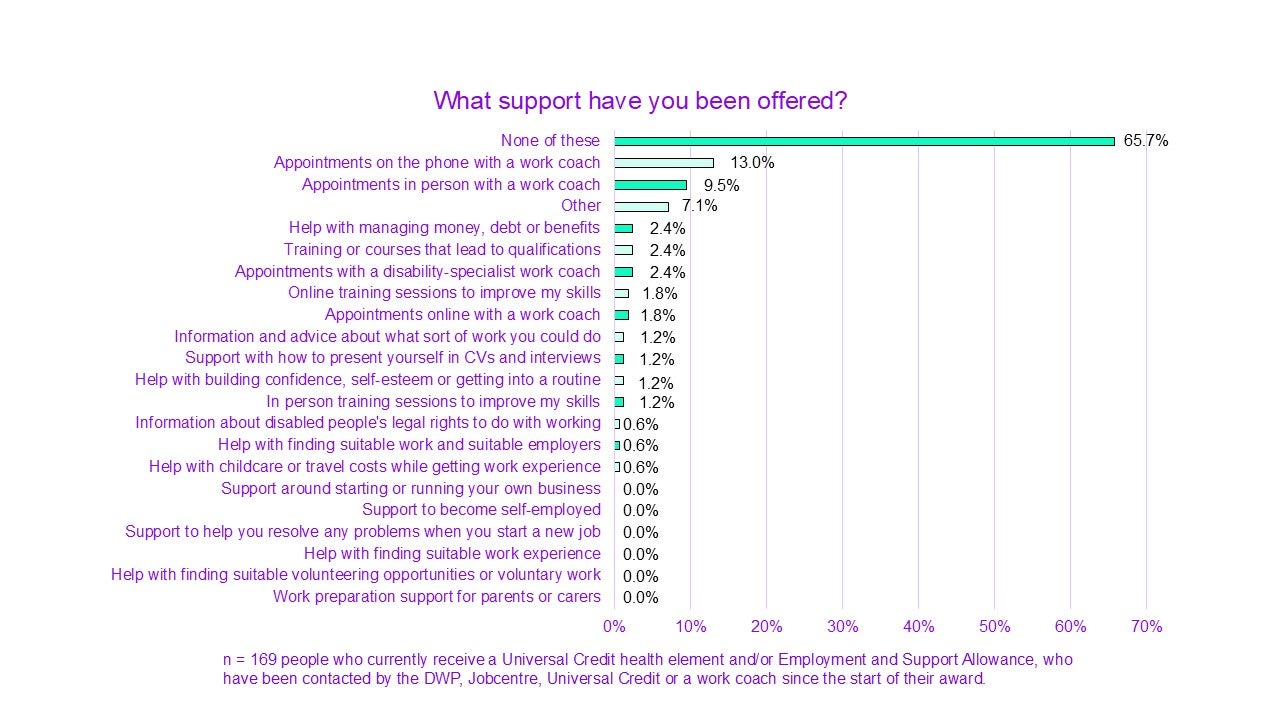
None of the respondents said they were offered:
- Work preparation support for parents or carers
- Help with finding suitable volunteering opportunities or voluntary work
- Help with finding suitable work experience
- Support to help you resolve any problems when you start a new job
- Support to become self-employed
- Information and advice about what sort of work you could do
- Support around starting or running your own business
These findings are inconsistent with the DWP’s formally stated list of available support services (DWP, 2024c; DWP, 2024d). This could mean that in reality, some of these services are not directly available to claimants, or simply not actively offered.
People who were interested in trying to move into work said they were missing support that would be tailored to their needs, goals and skills. They also mentioned missing a barrier-focused approach:

It would be easier if someone actually gave me a bit more support to try and see where my barrier is. I don't want to stay voluntary for the rest of my life.
In cases where people had been made to leave work because of their condition, specialised support seemed especially warranted:

I haven't been referred for any support. And, ironically enough, in my journey of working, I had a problem with my employer at the time. So, I was trying to figure out that because I got sacked based off of this condition. So, it was dealing with all of that rather than help finding employment and, at the minute, I'm still trying to figure out the support aspect of how to go back into employment and all of that. I'm lucky enough where I see specialists for my condition. So, they're helping but even they're, sort of, sat there going, 'We're not entirely sure of what to do or what not to do'.
People mentioned they have not been actively offered information or support. This made it harder to navigate the process of trying out or moving into work. Some of those who were working were self-employed.
Often this was to manage work around their impairments and also to avoid unfair attitudes or behaviour by employers. But there seemed to be a lack of guidance for people interested in self-employment:

I would love to be able to have the information and support to be able to set my own business up, but I don't have a clue where to start because I've never been supported in the first place very well, anyway.
Another important issue several participants mentioned was the lack of more specialised support for young disabled people. Their employment position may be different as they could be coming out of education with little to no work experience. For some, their education or qualifications were disrupted due to access failures or periods of illness. For others who do have basic qualifications, the standard offer for young people may not work. In such cases, people could require additional informed guidance:

I think for young people when you leave school there's so much given to you and it's like, 'Do this. Do this. Do this'. But then when you're stuck in the situation of being disabled it's like, 'I can't do this. Is there more support tailored to people who necessarily can't fit the direct routes that other people are taking?' Because I'm in the situation now where I was lucky I did well in my A-Levels but it's, sort of, 'Where do I go from here?' Because I'm on such a fresh start again. Like, my old employer isn't going to take me back.
Specific employability schemes were not always helpful or appropriate for many young people. These, however, tended to be the main offer, especially for those leaving Special Educational Needs and Disabilities (SEND) settings:

There needs to be a consistent help, support for those leaving special needs college through to work or other opportunities to get out of the house, and better checks, more flexibility for those who are made to feel the only option for after college is a supported internship.
For households with disabled adults and disabled young people, the impact of poor services impacts the whole family. In some cases, specialist schemes to support transition and employability for young people have had a poor impact:

My eldest son and rest of our family had a very negative experience, from a supposedly support(ive) internship, that made all of our health needs worse. We are still struggling to recover from.
Lack of accessible training and funding opportunities
An additional barrier for moving towards work was a lack of suitable training options. There was a sense that training and courses offered through the Jobcentre are limited. This was the case for people who:
- had no or fewer qualifications
- sought professional development
- wanted or needed to move career
For higher education, Student Finance criteria is rigid and the rules about studying and claiming benefits can be strict. Apprenticeships are available to people in work and rely on a minimum of work hours.
Jobcentres could offer more skill-based training courses that lead to a qualification. Or simple funding to help people develop needed skills or retrain for specific careers. This would enable people to move towards relevant work, building on existing skills:

There's so little funding available in terms of training. I do have a degree but it's in an area that I could never go back to because, you know, I've got a music degree. The music industry is so inaccessible. It's inaccessible to a fault. I could not work in the music industry. Also, it's London-centric. I don't live in London so there are no jobs for me, and so I would need to re-skill but there's no funding available for me to do that so I'm stuck unless I fund it myself.
Issues with Access to work
Access to Work is a government grant scheme which supports disabled people in work. Access to Work might pay for:
- a British Sign Language interpreter
- extra transport costs, such as a taxi where no public transport is available
- specialist equipment
You must be in or about to start paid work to apply for it.
People have described struggling to make use of Access to Work support. It has been hard to understand:

I think even with, like, the Access to Work scheme, that's a nightmare to try and understand in itself, and that's supposed to be helpful.
Some have commented on the unreasonable complexity of the scheme and admin required:

The admin just with trying to handle Access to Work is a nightmare. You know, it's been nearly a year since I've had to deal with Access to Work, but yes, that was part of why I'd stopped doing any kind of part-time work because it was too much. Access to Work was adding on too many hours. It was almost taking over from what I was actually trying to do.
Some people also described the limitations of assessments and support offered through Access to Work. Often these did not capture or address people’s main challenges at work:

The assessment I had for Access to Work, the brief assessment I had, was shocking. And he focused on, 'Oh you've got dyslexia. Okay, I'll give you this, this, this, this', and didn't focus on the fact that I'm a full-time wheelchair user. And didn't focus on any of the other stuff. And I was, like, 'I managed to get through my degree with really very little assistance with my dyslexia. What I need help with is lifting and shifting stuff, because I can't do that.
Another participant who was considering a job offer where she would need a support worker, explained the workplace would not provide this for her. To be able to receive this support from Access to Work, she would need to pay the support worker herself and claim the money back later. This was not possible and so she could not take the job offer.
Proposals for reform and areas for change
We have introduced and asked about different policy proposals at several stages of this study. Some of these proposals were based on proposals in the previous government’s white paper (DWP, 2023). Other proposals were from other organisations, though sometimes with significant changes. Others echoed suggested alternative solutions or were developed from what people have told us at different stages of our project.
At the end of our second survey, we asked people if they had any ideas about how the DWP could better support disabled people who want to move into or look for work. We have analysed these responses by the type of desired changes they have mentioned. The most common themes people wished for are (in order of highest frequency):
- More information and support around work (including finding suitable work opportunities, courses and training, more individualised support, adjustments help and Access to Work changes, and support while in work)
- Improved knowledge of disability among staff (including training and suggestions to have disabled people as staff or involved in DWP’s decisions)
- Removing the risk from the process of trying out work and moving into work (including allowing a grace period and changing work restrictions)
- Having the DWP work directly with employers to improve conditions and address lack of opportunities
- An empathetic approach based on listening and respect for lived experience
- Changing punitive culture, reducing pressure and accepting people’s needs, barriers and goals.
- Better communication and clarity of information
- Stop the spreading of stigma that harms disabled people and shames those who need to claim benefits
- Restore trust
All of these themes have repeated themselves throughout our discussions and survey findings.
Given the breadth of the issues people described, many problems are not addressed by existing proposals. Nor are they all covered by the newly developed proposals we presented. In this section we will therefore present the responses to each proposal, followed by the additional changes people wished for.
In deliberative groups, we used 6 criteria that were important to disabled people. These were developed through earlier qualitative and quantitative analysis:
- Effective. How big a difference it would make at helping people into sustainable work or to increase earnings.
- Safe. How much it would help reduce the risk of trying work. Or engaging with employment support.
- Dignified. How much it would improve people’s experience of the system.
- Fair. How much fairer it would make the system feel.
- Trustworthy. How much it would help increase trust.
- Inclusive. How it positively or negatively impacts diverse disabled people.
Discussions were not limited to these criteria. But we asked about how effective, safe, dignified, fair, trustworthy or inclusive the proposals may be.
Improving or reducing assessments
Proposals to change assessments
LCWRA element and protection from sanctions to be linked to PIP or a WCA (white paper with modifications)
At an early stage of this study, we asked about the proposal for Limited Capability for Work and Work-Related Activity (LCWRA) income and protection from sanctions to only be awarded to disabled people receiving Personal Independence Payment (PIP). This idea was based on proposals in the previous government’s white paper (DWP, 2023).
There was a strong negative response from disabled people during the first qualitative stage of this research. We then moved to discuss and present another version. For this one, we added significant changes to try to address concerns raised about the original white paper proposals.
Like the white paper proposal, if someone who receives PIP claims Universal Credit (UC) then they would automatically be awarded the LCWRA element of UC. This would remove the need to go through the Work Capability Assessment.
However, in our modified proposal, people who do not receive PIP would still be able to apply for the Work Capability Assessment (WCA). In that case, they could go through the work-related assessment, like the current process.
We have also removed the part of original white paper proposal that said work coaches will decide about conditions and sanctions. Instead, on our modified proposal, all claimants would automatically be protected from sanctions.
We have presented this proposal in our survey to respondents in 2 different contexts. The first context was reducing worries about trying to work or engaging with employment support. This is because, under this modified white paper proposal, entitlement would be based on a PIP award for many people, rather than on the WCA. When asked:
- 86.9% of respondents agreed with this proposal
of which:
- 63.4% strongly agreed
- and 23.5% agreed
The second context was reducing the number of stressful assessments for many disabled people. This is because some people would not need to have a Work Capability Assessment (WCA) as well as a Personal Independence Payment (PIP) assessment. When asked:
- 86.2% of 559 respondents agreed with this proposal
of which:
- 59.6% strongly agreed
- and 29.7% agreed
Our survey showed a broad agreement to this proposal as captured by a single statement question. On the other hand, qualitative discussions tended to view it more negatively. While the proposal had an initial appeal, longer discussions revealed considerable concerns regarding how this could be implemented.
People were unclear on how the merge of 2 different assessments that are normally meant for 2 different purposes would work. Some thought this may be another way of trying to push people into work:

The biggest issue that I've got with the Work Capability Assessment and the PIP assessment being the same is that you can still work when you are claiming PIP. And, that, to me, is what is going to push people back into work.
Many have commented this proposal could be good in theory in terms of having one instead of 2 assessments. But, with the state and structure of the benefit system, this proposal raised serious concerns.
One participant described the main appeal of this proposal as driven by the level of distress caused by assessments:

It would be nice to have one assessment to a degree because you haven't got to go through the deliberating and heart-wrenching assessments at 2 different times. Because when I had the letters on the doorstep years ago saying, 'It's up for renewal,' and what have you, my heart sank. It makes you nervous, it makes you sick and what have you. In a way, having one would be great, but I don't think it will work.
We have asked on our survey about people's view on their PIP assessment, like we did for the WCA. Agreement levels were somewhat lower for PIP in comparison.
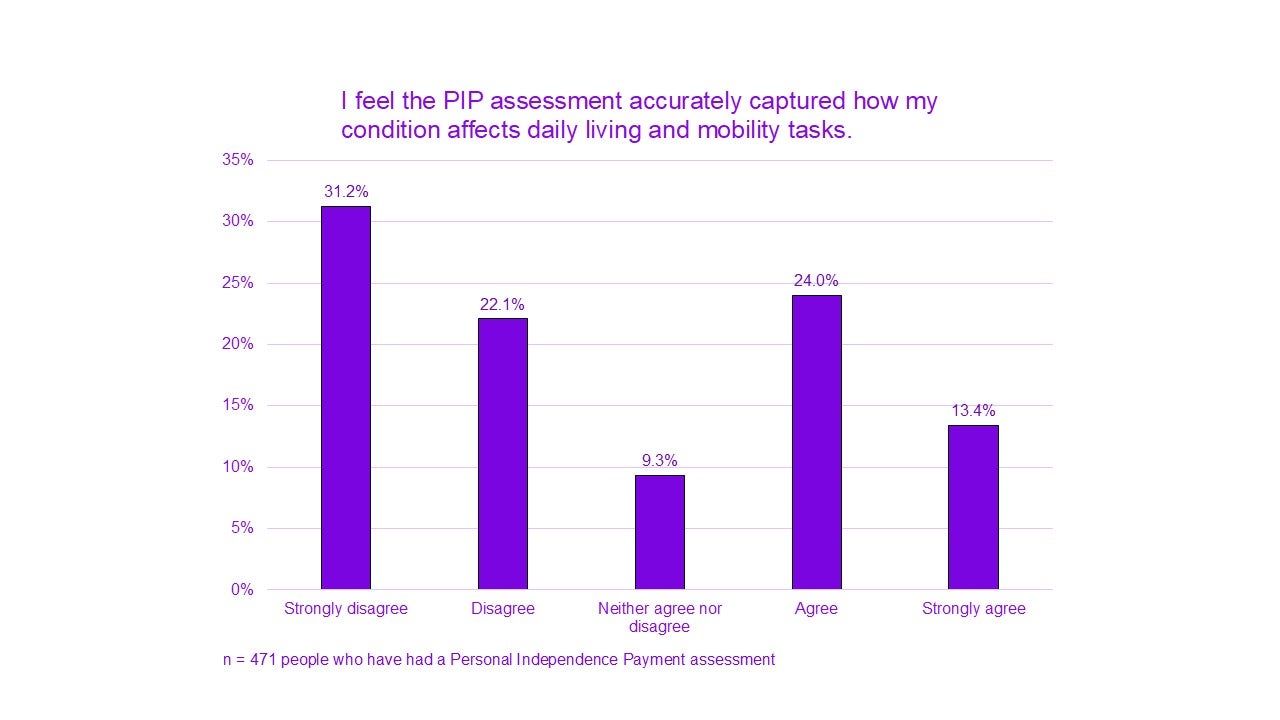
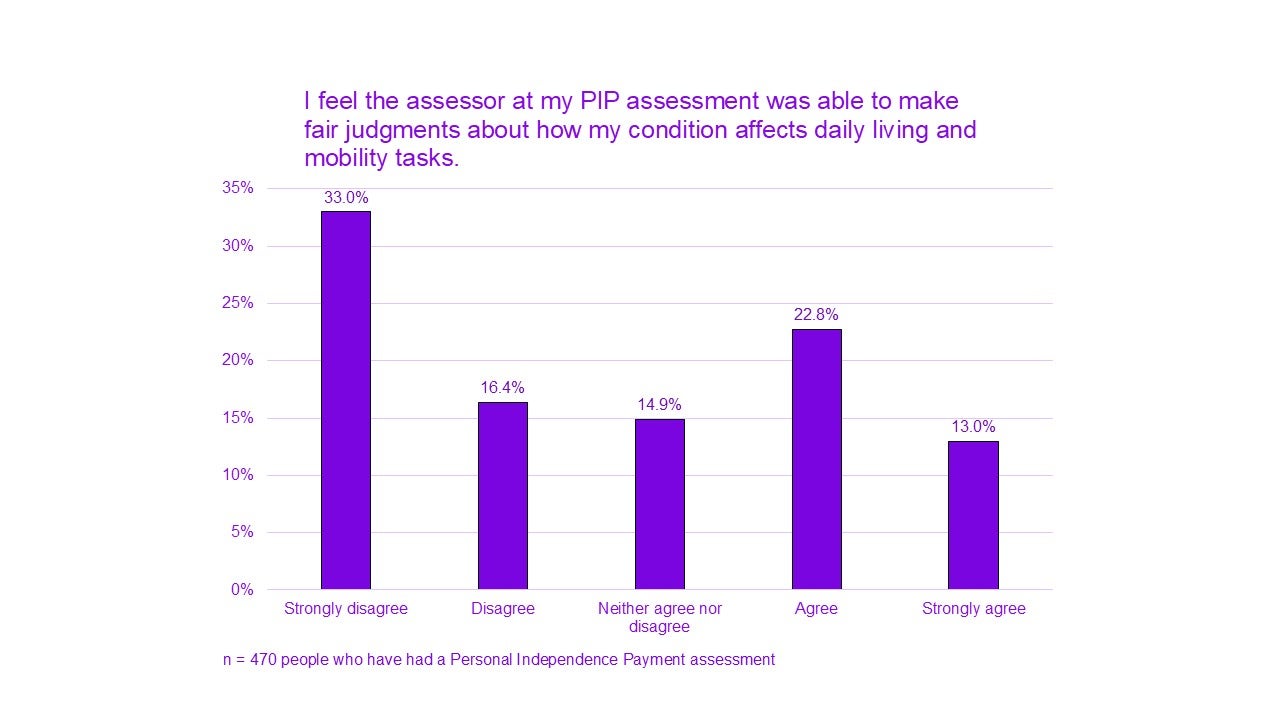
There was a perception that PIP was a less inclusive assessment. PIP assessments are not aiming to check if people have limited capability for work. Instead, they focus on people having care and support needs or mobility barriers over a certain threshold. People can have limited capability for work without having support needs or mobility barriers.
Many disabled people are not eligible for PIP under the current criteria. And many people who are eligible struggle to be awarded their entitlement. People therefore worried about those this could exclude:

It will feel fairer for those who fit DWP criteria, but many of us don't, and it will feel worse for those who don't potentially.” “Not safe, as it only applies to whatever conditions DWP feel are okay at the time.” “Neurodiverse people get completely left behind. If you're an adult who has been newly diagnosed you've got no hope. No hope in hell. It also leaves behind so many people with mental health conditions as well. There are lots of people who have quite significant social care needs who don't necessarily get PIP.
People have also explained that basing this on PIP posed substantial risks. PIP tended to be more readily reduced or stopped when it was reassessed. Along with waiting and appeal process times, this meant many may be left uncovered for long periods of time:

… for me every time I get PIP, every time it's at a review, I lose it and it takes 2 years to get it back. But I always get it back and then I get backdated, and yes, that's, sort of, fine in a way but it's also not because then you spend 2 years with no money. And I have extra care needs and extra medical needs that I need that money for.
Having one assessment for both Universal Credit (UC) and Personal Independence Payment (PIP) could have a negative impact. Someone could lose both after a reassessment. Even if this was later overturned at tribunal, there would be a long period of time where people do not have the financial support they need to live:

…because so many of us either get our claim reduced or stopped at review and the wait times are disastrous, but it just doesn't make any sense that you'll lose pretty much all of your money for a couple of years, and even if I'm smart with my savings, I'm so smart, but there's a restriction. You can't have more than £6,000 in savings and that is not enough to cover 2 years of no benefits.
Appropriate assessors: independent specialists (Scope)
The idea of specialist assessors was based on Scope’s previous “Disability Benefits Without the Fight” campaign (Scope, 2024b). We sought to refine it based on people’s views.
People we spoke with have said medical opinions from their professionals or records are often ignored. DWP decision-makers often overrule them and prioritise benefit assessment reports. In addition, most do not think that current assessors have the professional background to make these types of judgements. Current claimants tend to suspect that non-specialist assessors are driven by considerations that do not align with claimants’ real health situation and best interests:

I don't think having nurses, in particular, or, you know, nurses or physiotherapists from external companies dealing with these assessments is even ethical.
People therefore appreciated the option of having more weight given to medical opinions:

…I think this is the biggest downfall for me, it's the fact that you have to sit in those assessments with medical information, medical test results, and then be marked down by somebody who doesn't know the first thing about your illness.
We first explored the idea of involving people’s own doctors in assessments. People generally liked the option of having the views of someone who personally knows them as part of their assessment:

At the end of the day, your doctors, your consultants, etc, the ones that you've been seeing for years, they know more about your condition, how they affect you, than a stranger would that you meet for an hour in a building.
It also reduces the pressure to explain a significant amount of complex health and contextual information in a short period:

My GP has a much wider understanding of my health and my situation than what I can capture in a single assessment.
At the same time, a few concerns were raised that required consideration:
- High stakes: too much riding on one person’s views
- Some may not have a GP or a good relationship with their GP
- This could affect patients’ relationship or trust with their GP
- Expertise: GPs often lack knowledge and expertise in specific conditions. But not everybody has specialists or consultants
- Concerns over increased workload and limited NHS capacity
- Whether the same level of detailed evidence would be required. And if the level of required sensitive information could be reduced
Much of these concerns seemed to focus on the option of GPs involvement in particular. This has also led some to reflect on the importance of the independence of assessors to ensure more objective decisions:

Almost like what the ideal is an independent assessor. Somebody who is not linked to DWP at all, who is properly trained, or even that the training is conducted by an independent.
We have combined the need for specialism with the element of independence and presented it on our survey. This was one of the most popular proposals with survey respondents. There was a 94.6% agreement that if there is an independent assessment, it should be conducted by a specialist in the claimants’ medical conditions. Out of this 94.6% agreement, 69.1% Strongly agreed and 25.5% agreed.
To be able to compare between different options, we have presented survey respondents with several options for who the assessor should be. When asked to choose one type of professional who should conduct assessments, disabled people seemed to have a clear preference for their own medical consultants or specialists. This was closely followed by independent medical specialists. GPs were less popular, although views varied considerably between ESA and UC claimants. The current model of independent non-specialist assessors and also social workers were very unpopular choices (less than 5% for each).
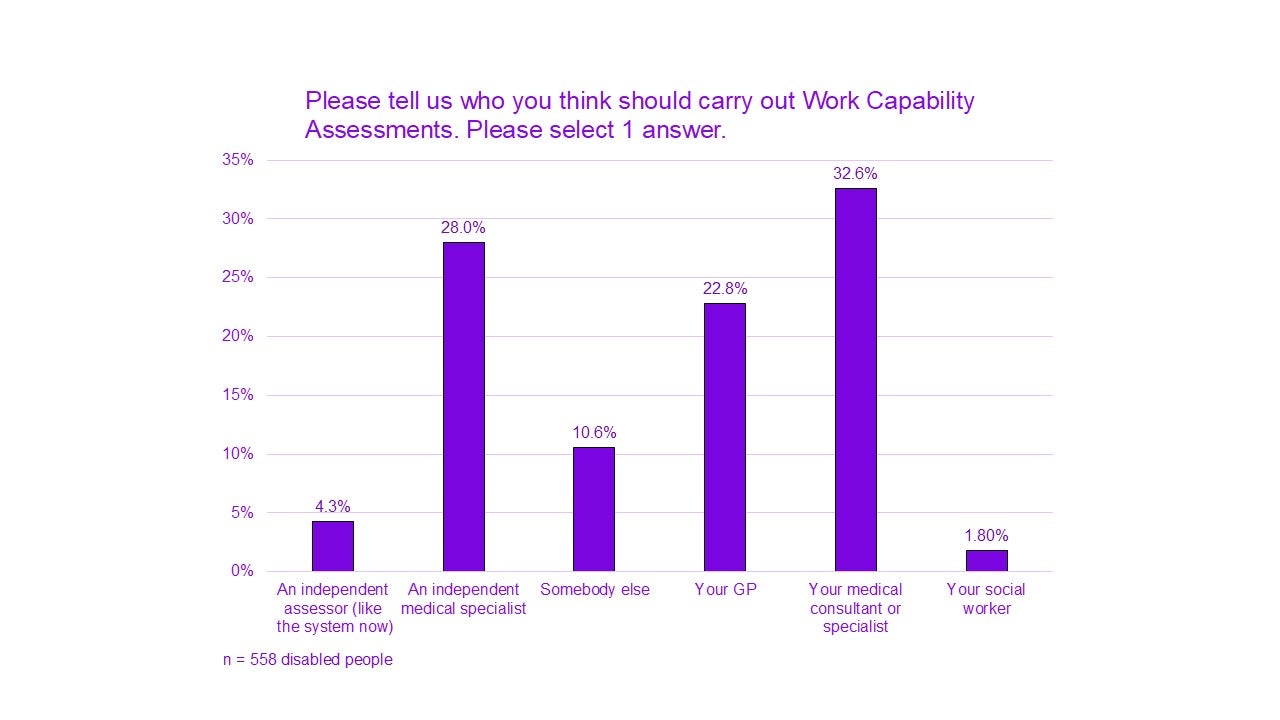
It is, however, important to note that not all disabled people have the option of providing evidence from their own professionals, and they should have alternate routes for accessing benefits.
Additional desired changes to assessments
Involve disabled people: in individual decisions and general design
In line with people’s general wishes about reforms in the benefit system, people also wished to see disabled people involved in designing the assessment process itself. This suggestion was the most popular one presented on our survey.
People have also mentioned their inability to influence anything that has been decided about their own work capabilities:

It should always be an interaction between the actual claimant and the person doing it.
This led to the suggestion that an agreement between assessor and claimant could be sought as part of the assessment. 82% thought that the assessor and the claimant should agree the impact of somebody’s condition and their barrier to work, as part of the WCA.
A more practical and respectful approach: focus on strengths and adjustments
Most people have shared their assessments left them feeling negatively about themselves and about their future. People had to explain all of their personal circumstances while no focus was placed on systemic barriers.
Those who were interested in working therefore wished assessments could focus more on individual strengths. And what they could do with appropriate adjustments in the future:

…it's so easy to throw people on the scrap heap when, really, they shouldn't be assessing you to see if you can't work. They should be assessing you to see if you can work and putting that support in place to do that.” “I think the assessment needs to change, I think that needs to be more much more friendly and not a case of what you can’t do, but more like what you need more help with, like more geared to the person rather than to a statistic.
At the same time, it is important to remember that many people are too ill to work, and their circumstances are not expected to change. People who were unable to work wished for an approach that would:
- prioritise their health
- avoid unnecessary interaction
- treat them with respect and understanding
Reduce and improve reassessments
Reassessments also appeared to be used to monitor disabled people. People felt reassessments placed them in an unnecessary risky position, without offering any focus on changes in support needs. While people agreed they were useful for short-term conditions, they seemed only partially justified for others. In most cases, they seemed completely unjustified:

… I think if there's an understanding where, 'Okay, this condition isn't going to change', so there's not necessarily any benefit to constantly going back at the same people when their condition isn't going to change and it's just going to add stress and make someone more ill, potentially.” “I have got a progressive illness, it isn't getting better, it just slowly gets worse. And there are a lot of progressive illnesses. So, I think it needs to be judged on why you need it, why you are unable to work. If you've, I don't know, had an operation or something, a major operation or something, and you can slowly go back to work, then that's different. But I don't see that separation with anything the DWP do. It's literally straight down the middle. If they had anything about them, anybody who has got a progressive illness would just be on it for life.
A more dignified approach would therefore:
- Considerably reduce the number of reassessments according to people’s conditions (extended periods or single assessments)
- Allow a brief assessment for those previously assessed
- Introduce the option to request an assessment in case your condition improves or worsens
There was also a suggestion that people with diagnoses of specific conditions would not need to have a WCA.
Protect claimants with mandatory recordings and transparent procedures
Some have commented on the unjust and imbalanced dynamics that characterise the assessment situation. Having recordings and official transcriptions available for all without them needing to be asked for would build trust and protect claimants.

Make it mandatory to have every assessment recorded because it means, hopefully, that way they won't lie.
Doctors, but not diagnoses
There was a general agreement when it came to doctors’ role in assessments. But their contribution was seen to serve a protective function and add evidence. An exclusive reliance on medical diagnosis received significantly less support.
54% of respondents disagreed that Work Capability Assessments should be based on medical diagnosis only. 16% neither agreed nor disagreed.
People have mentioned periods of having limited capability without a diagnosis. Some have more complicated or rare conditions, or take a very long time to get diagnosed. Yet that does not change their needs and difficulties. Some have pointed out that some conditions are not well characterised by a focus on medical needs. Such conditions may be better evidenced by social care or support needs:

I think that assessment from somebody's medical team is great, but I think it also needs to include social care team, because I'm thinking also about how many, particularly autistic adults, who may well have been diagnosed at an early age. They don't necessarily have a huge amount of medical input, but they have quite a bit of social care input.
We also know that not all disabled people need or can access either medical or social care support. The social care system is under strain. Many eligible needs are not being supported. In some cases, those who are expected to contribute to their care are unable to afford this. There is also a significant burden on disabled people to understand and navigate these processes.
A complete reliance on formal support structures to validate disability is therefore not appropriate. Many people are excluded or unable to access these, but they can be protective for those who do interact.
Repair broken trust
Proposals aimed at repairing trust and abolishing punitive culture
Remove all sanctions (Scope)
People viewed systemic use of threats and fear-inducing procedures as a central issue. This impaired trust and had a negative impact on people’s health and well-being. As we have seen, this was also a major barrier for engaging with support and moving into work. Instead, people sought a more supportive and understanding approach that could encourage and motivate them:

I think having people who are treating these people, seeing these people on a regular basis who can state, 'Okay, this person is going through this, but they cope with it in this way, this is how they manage, this is what they need', and actually finding the most supportive route, I think, would actually be more beneficial because you would probably find more people going to work, more people doing things because they're supported in it and encouraged in it instead of being forced into it and having the threat of sanctioning or having a work coach say, 'Well, I think you should work because I've seen this or you've done this'. I think that's definitely a better way to go about it.
Sanctions in particular were seen as harsh and completely unnecessary:

The punishment idea needs to be removed, it's no way to treat adults, it's no way to treat anyone.
We asked about sanctions twice on our survey. Both times, most agreed sanctions should be removed for everyone on UC. 75% of 221 current work-related disability benefit claimants thought sanctions should be removed, to reduce the risk of being found fit for work. And 76% thought they should be removed to improve trust and engagement.
Trust was a main issue and barrier that seemed to be linked to all facets of the benefit system and disabled people’s engagement with it. Repairing trust was therefore an obvious priority for any meaningful process of change:

If they're going to start doing something new, we need to go at it with optimism rather than scepticism. Because we have that opinion of them, and they have that opinion of us, and it's, kind of, like, a them-and-us thing and it shouldn't be, they should be there to help us.
Nothing about us without us
Much of people’s distrust seemed to come from engaging with a system not designed with disabled people’s needs and interests in mind. One important way of repairing trust and attempting to rectify the power imbalance was therefore involving disabled people in decision-making processes. Such involvement should be implemented throughout the whole system.

They need to put themselves in the shoes of a disabled person and think from that perspective a bit more rather than from their perspective. I think, if they had people on board, even if they're just, like, voluntary people who were disabled or unwell on the panel of this decision-making, that would make a difference. And also, that would give us more trust in them because we know that there's somebody fighting our corner.
On our survey, 99% agreed that if the goal is to increase fairness and trust, reforms to the benefit system should be designed in collaboration with disabled people.
Meaningful involvement was seen as a positive way of making sure people can be adequately supported. And to increase motivation for engagement. But those who have previously been part of government consultations have had discouraging experiences. Such processes often seem more tokenistic than a true effort to listen and implement changes:

That they listen to us. That they involve us in the decisions. You know, nothing about us without us and all that. I've been on focus groups, and that was quite a strong focus group, it was 4 or 5 times for that white paper. They didn't take the slightest bit of notice of anything that was said. And that's so, so disappointing, that you put your time into that and they still don't take any notice. …Yes, I think that's what it's got to be about, hasn't it? It's got to be about talking to people. Treat us like human beings. Don't treat us like a statistic, a fraud statistic.
More thorough and transparent procedures were seen as very important. These could help guarantee disabled people are equal partners in reform processes. And it would mean lived experience can become a central consideration to guide the deep transformation the system needs.
Additional desired changes around repairing trust
Prioritise support and accessibility for claimants
Part of what appeared to contribute to the lack of trust was a low prioritisation of basic support for claimants. Throughout their claiming journey, disabled people repeatedly struggled to access information and practical help:

There needs to be much clearer guidance as to what people can and can't do, and I think that having a much better user-led system for things like Access to Work.
People described a need for the following:
- A dedicated helpline service to offer timely support for prospective and current claimants
- Substantial improvement to journal communication
- Prioritising accessibility throughout the claiming journey, including:
- Clear and simple information about benefit-related options and processes available to all
- Accessible facilities and tools
- Accessible support options (appointments, training)
Some have also wished for an explicitly agreed link between different government departments to share information and prevent duplication.
Tackling barriers within the jobs and employment system
Proposals aimed at reducing employment barriers
Employment law enforcement (Scope)
Improving enforcement of employment laws was seen as a basic step to stopping disabled people leaving the workforce:
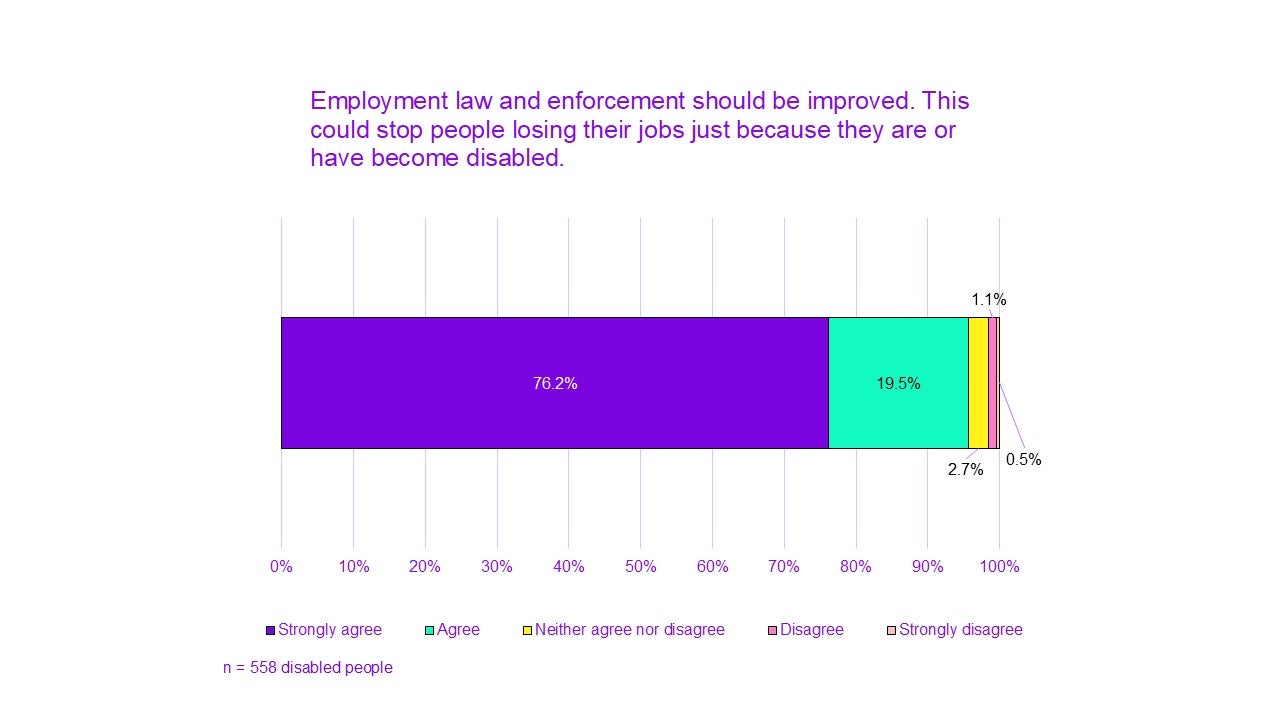
Improving employment law and enforcement to make more jobs available to disabled people was also favoured:
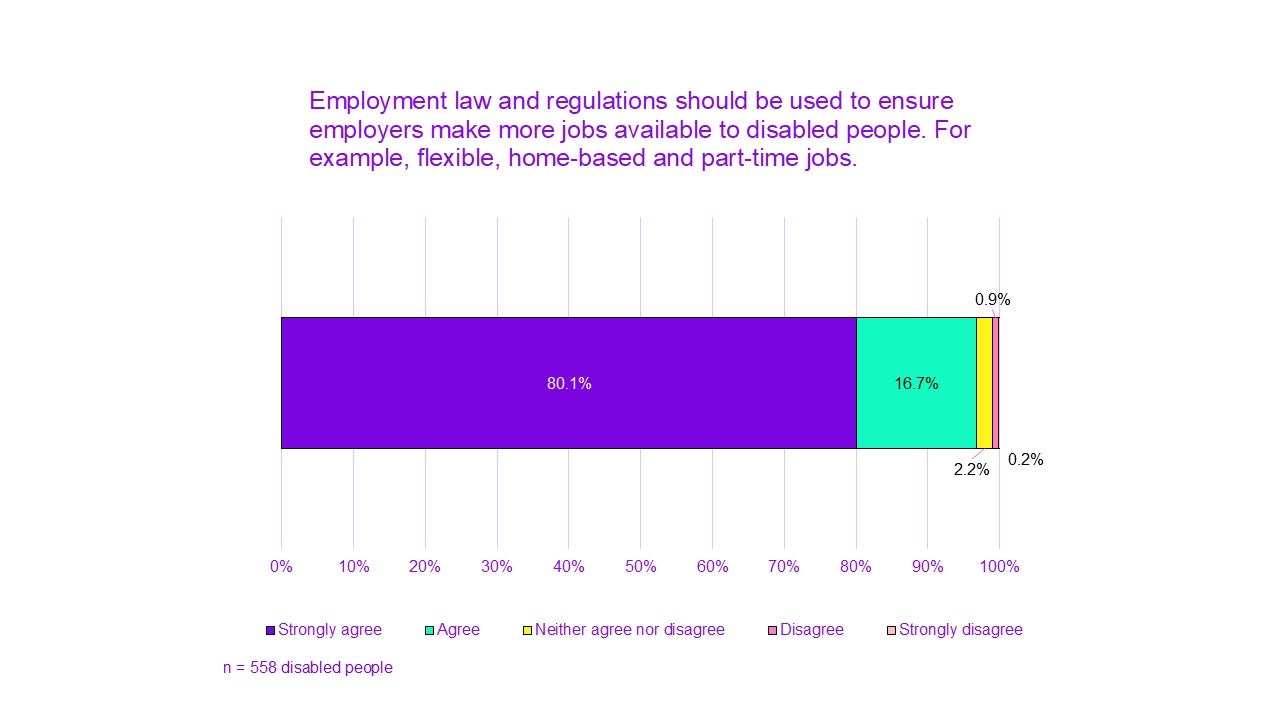
Enhanced and extended Statutory Sick Pay (JRF)
Entitlements such as Statutory Sick Pay (SSP) have also been raised in this context. SSP can be essential for supporting disabled people at work and preventing them falling out of employment completely. People also thought that more organisations should pay above the SSP required rate:

I think too many, even big organizations, are being allowed to get away with paying statutory. I honestly think that there should be- you know how organisations that have got more than 250 employees now have to publish gender pay gap reports? Now, surely, most of those are big enough to then pay a top up on top of statutory. If local councils can afford to pay their employees full rate of sick pay for 6 months, then why on earth can't reasonable sized businesses?”
We presented a proposal that SSP should be increased on our survey, based on a suggestion from the Resolution Foundation (The Resolution Foundation, 2023). This proposal received good support, with 86.9% agreement.
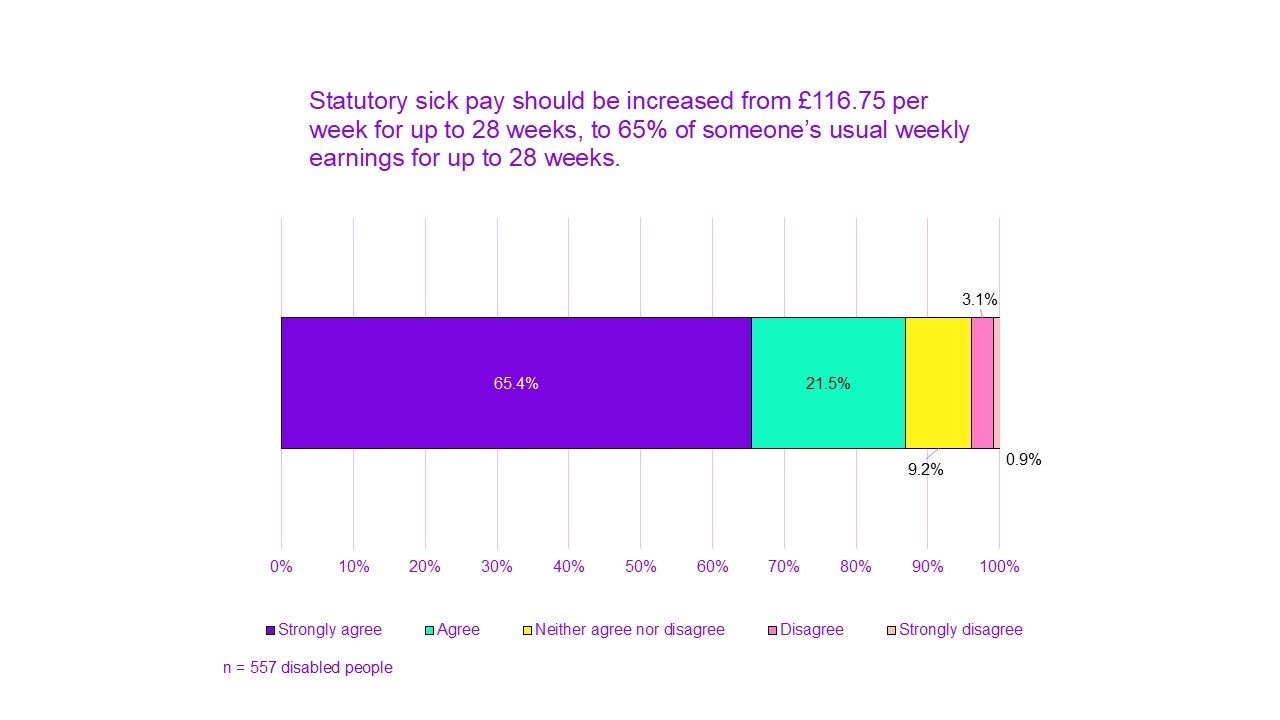
Additional desired changes around tackling employment barriers
Work directly with employers to improve conditions
Governments working with employers was similarly seen as a crucial step. This could allow meaningful changes to disabled people's ability to move into sustainable work. People considered the important of having continual support in place for employers. This would help them accommodate disabled staff:

But ways maybe if the employer needs help, then giving it to them to how to make it easier to bring people back into that state where a lot of people do want to work and a lot of people do want to do this, but they just don't know how or they don't have the support and the means of doing it.
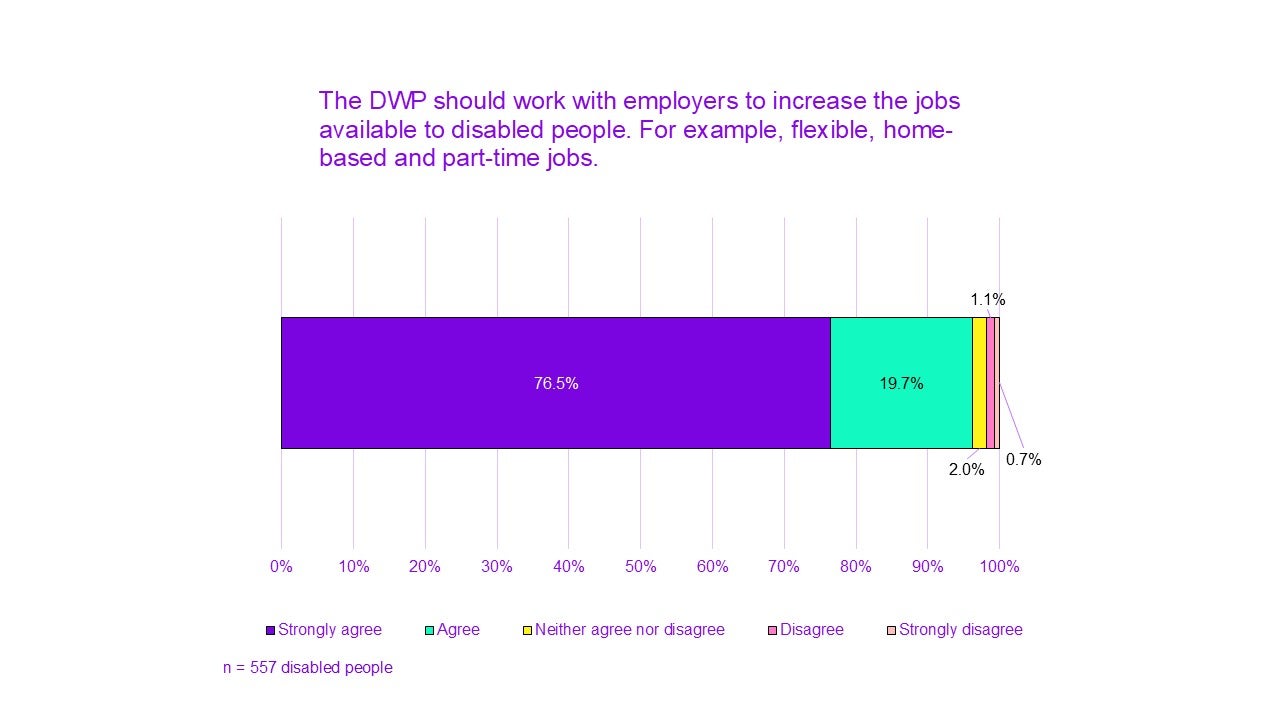
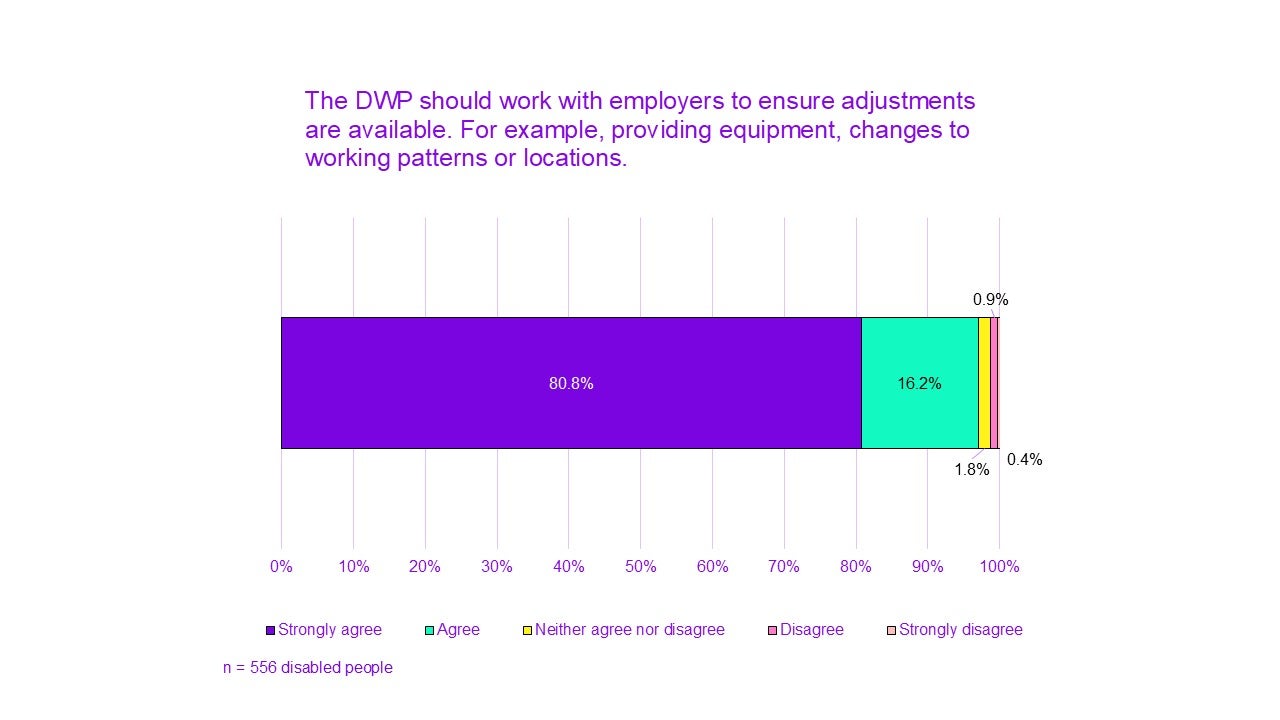
Dedicated legal aid for disabled people
We have heard from many who were forced out of their jobs when they became disabled or their condition worsened. For that reason, employment law enforcement alone is not enough.
Some have raised the need to have dedicated support in place for disabled people harmed by violations of these laws:

I got sacked from my last job and they couldn't give me a reason except for the fact that I couldn't come into the office because I was too unwell and they wouldn't make adaptions for me to work from home. So, I didn't know who to contact. Nobody could really help me at that point and I was so unwell that I didn't have the physical energy or strength to be able to fight it on my own and I think just having an in between person that you can say, 'Oh, crap. This has happened,' and explain the situation and they're able to actually help you and, like, advocate for you. I think that would really help because that's something that's obviously missing quite badly at the moment.
A list of proven disability-friendly employers
People have also wished for an available list of employers who have made adjustments and put disability-related policies in place available. They felt this could reflect the work of disability-friendly employers:

You know, if it was a normal, routine thing, and there was something there all the time, it would be a lot easier to place people in work. Because the DWP could have a list of companies or workplaces where those things-, so, if somebody like me went into the Jobcentre, they'd say, 'Look, we've got jobs here, here, and here that you could probably do’.
This would be in addition to the existing Disability Confident scheme, which many felt did not prove to be as helpful as they wished. Because it is a self-assessment scheme, it seemed that many organisations who advertise themselves as a Disability Confident Employer are not doing enough to recruit, retain and support disabled staff.
Reducing risks of engaging with support and trying work
Not everybody can move into work and nobody should be forced to before they are ready. Yet as we have seen, current practices created risks for those interested in trying out work as well. The following proposals and ideas aimed to make the move into work safer for those who are interested in trying.
Proposals aimed at reducing risks around moving into work
Work Transition Guarantee: protected benefit status for those trying out work (JRF with additional modifications)
The Work Transition Guarantee would require the law to say that if you move towards work (like engaging with employment support or trying a job), you cannot be reassessed and therefore cannot lose your health-related UC, protection from sanctions or your PIP for 2 years. And that people would be able to reclaim their old award straight away if they were not able to stay in work.
This suggestion aims to stop disabled people worrying that trying out work will mean they will be reassessed and lose their benefits. Or that they will become subject to more conditions that could lead to sanctions. Or that they’d be unable to reclaim.
It would not mean that people couldn’t request a reassessment if their needs changed and they wanted one sooner.
This suggestion generally received favourable responses from participants in our deliberative discussion groups. At the same time, people expressed some doubt about how this would be implemented. Some also mentioned that the risk of reassessment in this case is only delayed, rather than prevented.

Generally a better idea on how to approach work and not have the fear of being taken off those benefits, sort of, having that confirmation instead.
On our survey, we presented each element of this proposal separately:
- 95% of current claimants agreed that disabled people whose job did not work out should be able to access their old benefit straight away, if they reclaim Universal Credit within 2 years
- 85.9% strongly agreed
- 95% of current agreed that disabled people who engage with employment support should have their benefits protected and not be reassessed for any benefit within 2 years
- 81.8% strongly agreed
- 95% of current agreed that disabled people who try out work should have their benefits protected and not be reassessed for any benefit within 2 years
- 80.0% strongly agreed
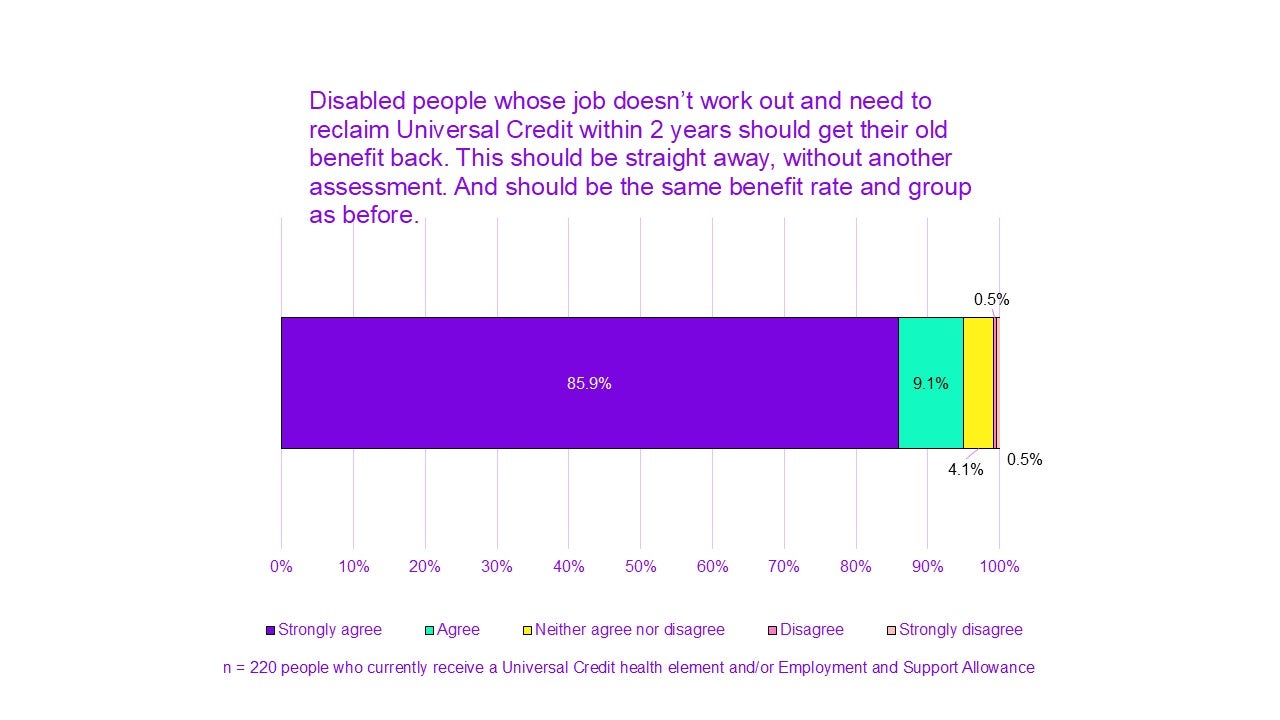
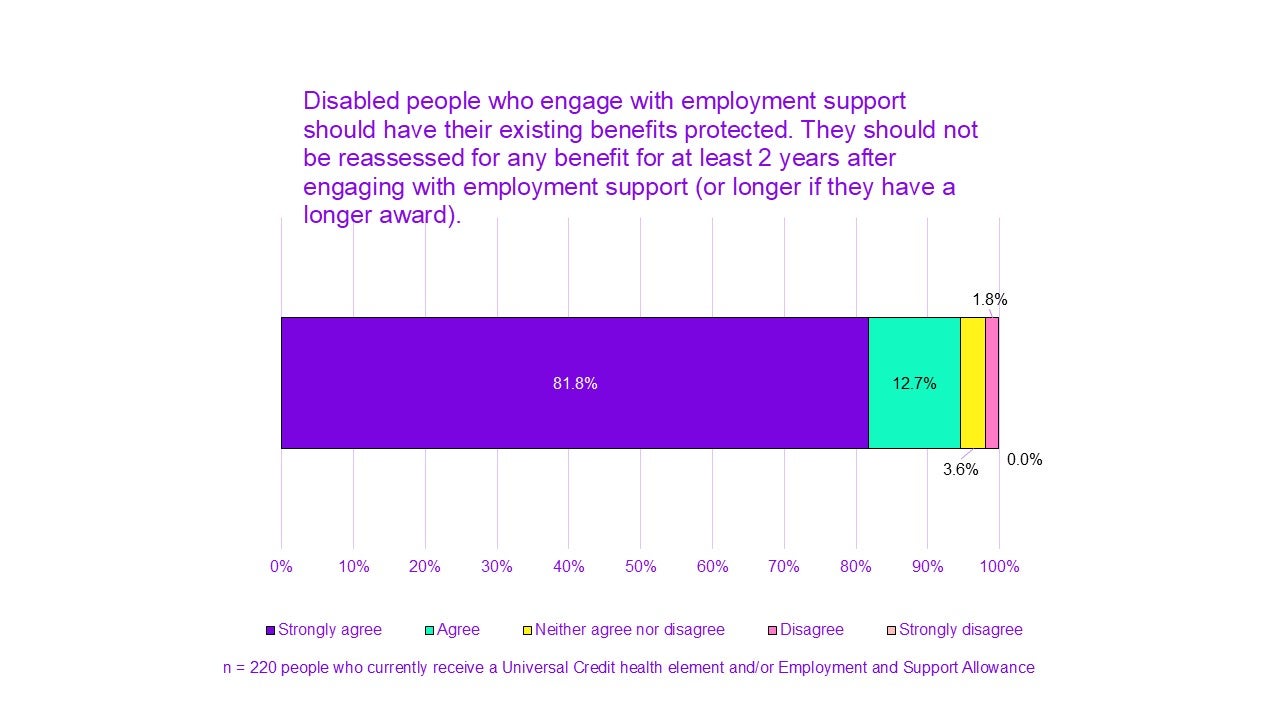
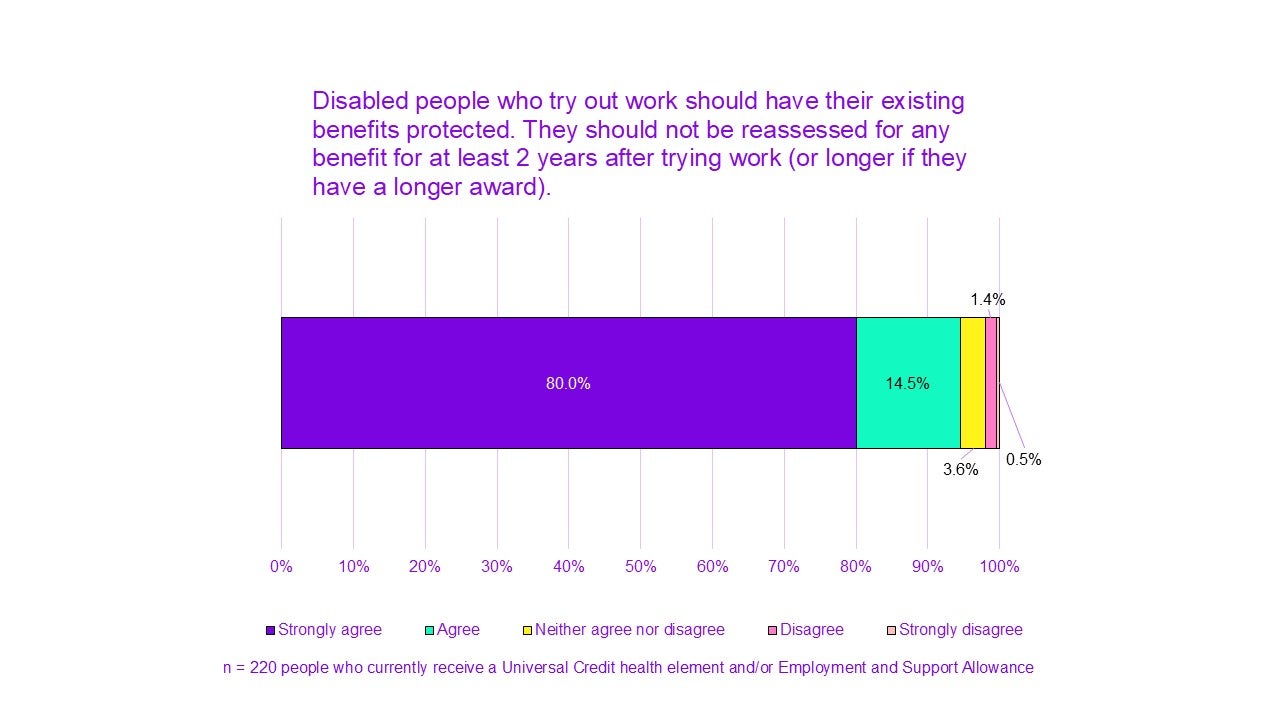
Some of the people we spoke with have felt additional levels of protection were needed to account for fluctuations in people’s condition:

If people were found fit for work, or that their condition did improve, that they could retain their benefits for 6 months whilst they went back into work, particularly if they had fluctuating conditions, so that, yes, you can get back into work and give it a good shot. Because there are so many people who have conditions where they might be fine for 2 or 3 months, and then all of a sudden, whoosh, here comes another big flare, and they're back in bed.
Being able to reclaim if needed was similarly important to enable people to enter employment and see how it works for them:

So, there needs to be support in that to go, 'Okay. If you need to come back onto benefits or if you need support, that's still here and we're not going to penalise you for it. We're going to understand that this is a step forward and we'll help you keep making those steps forwards.' Instead of make the step forward and then just get pushed back another ten.

That would all be quite helpful because like I say it's all well and good just having these ideas. Like I said, before I had this idea of could I work in a shop, could I work on a till? Which in my mind I think I could, but in reality I couldn't. So it would be nice though to go and experience some of these things to see whether you actually could do it. Because you don't know unless you've tried it really.
We therefore asked about if people should keep their work-related disability benefit entitlement for 6 months after they move into work. We clarified this suggestion with information on income levels for a 6-month period. When we presented it to more respondents, it did receive a good level of agreement (81.4%).
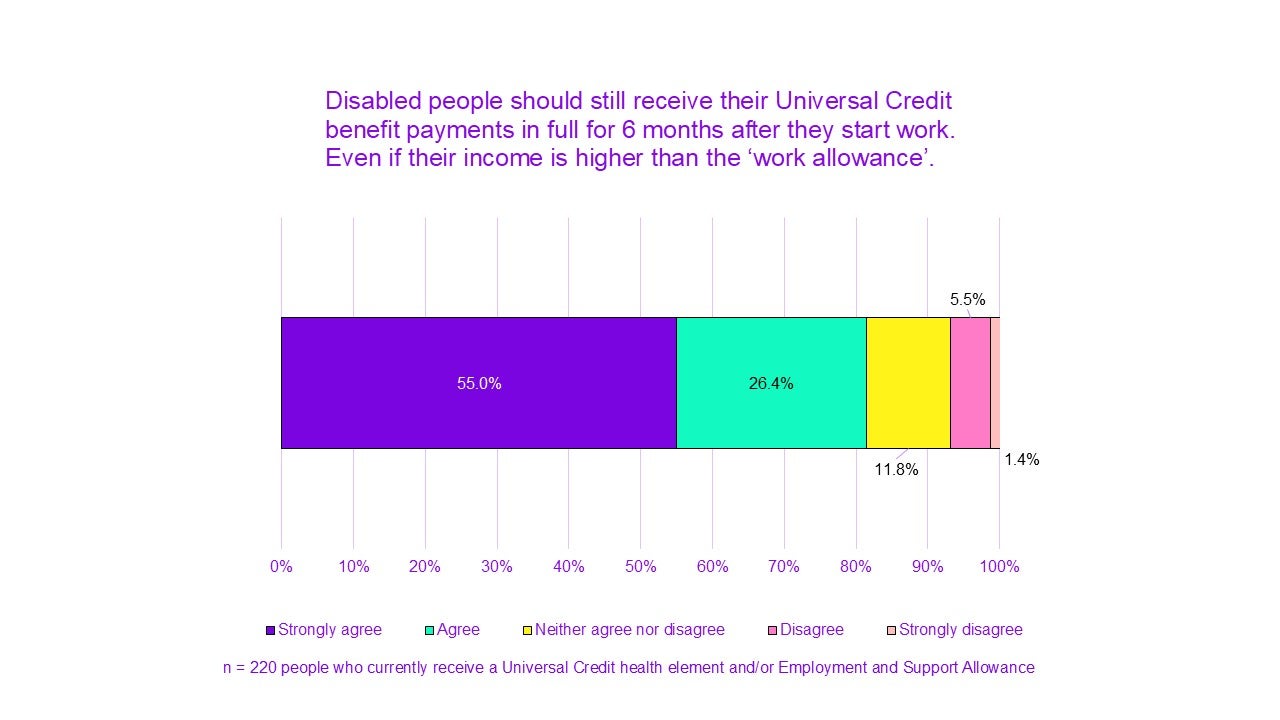
Protect and enhance UC: changing payment amounts to reduce financial risk
This proposal was to make Universal Credit stronger and more protected for all claimants. It proposed a higher basic rate of Universal Credit. And the reduction of sanctions for everyone, regardless of whether they were disabled.
The idea behind this proposal was that improving UC for all claimants (including people without health conditions) reduces the negative consequences for disabled people. This is because if they lose their additional health-related benefit support as a result of a reassessment, the basic UC rate they are left with would be higher than the current rate. This can, ultimately, lower the risks of trying work.
This proposal received a mixed and negative reaction in our deliberative discussion groups. This was despite the reduced risk associated with it and disabled claimants’ amount remaining the same. Most thought sanctions were unfair for everyone. They thought a more appropriate basic income level to meet increased living costs was needed for all. At the same time, discussion participants were bothered by the lack of acknowledgement of disabled people’s additional costs:

I'd welcome, as anybody else would welcome, a higher basic rate, because you just can't afford to live on what they give you as it is” “It still doesn't take into account the higher cost of living for disabled people.
We therefore added 2 variations to this question on our survey.
Disabled people getting the same overall payment but with a higher basic payment for all was less popular. With this proposal, disabled people were in effect losing the differential income.
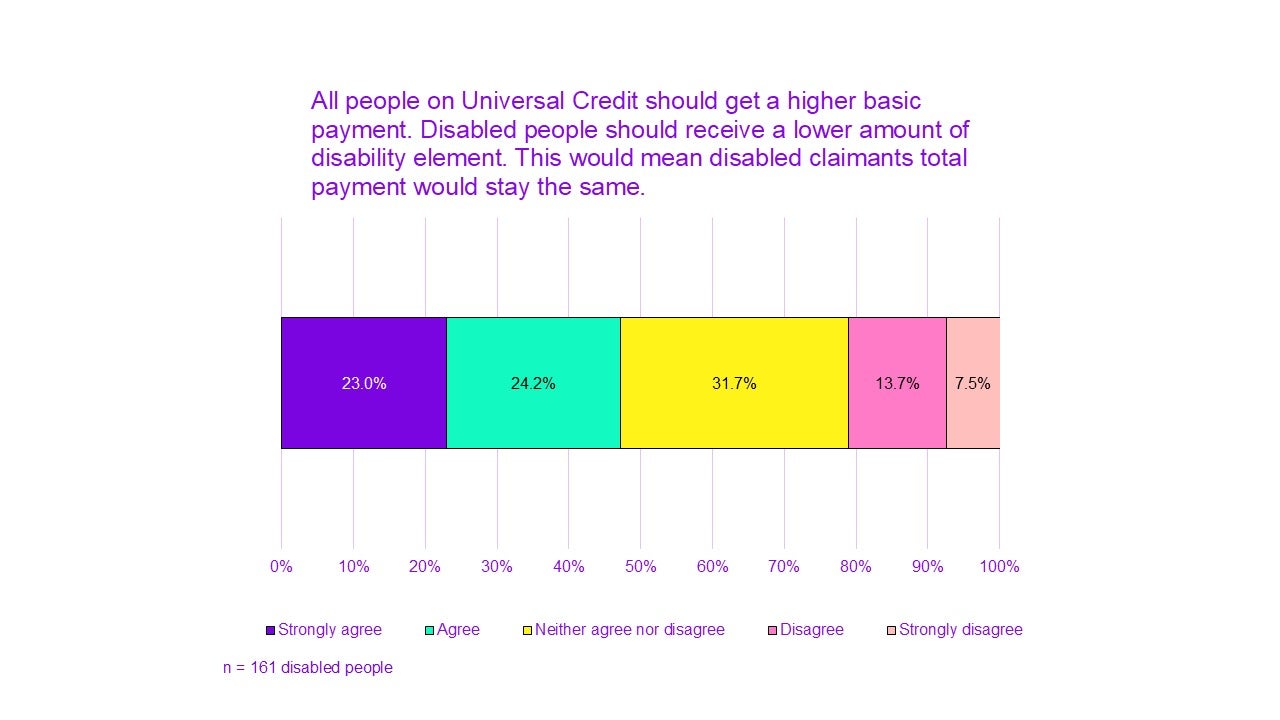
Another suggestion was that the basic rate would be increased, but the current disability element remains the same. In this case, all claimants receive more. This received significantly more support. Although it was still slightly less popular compared to other proposals.
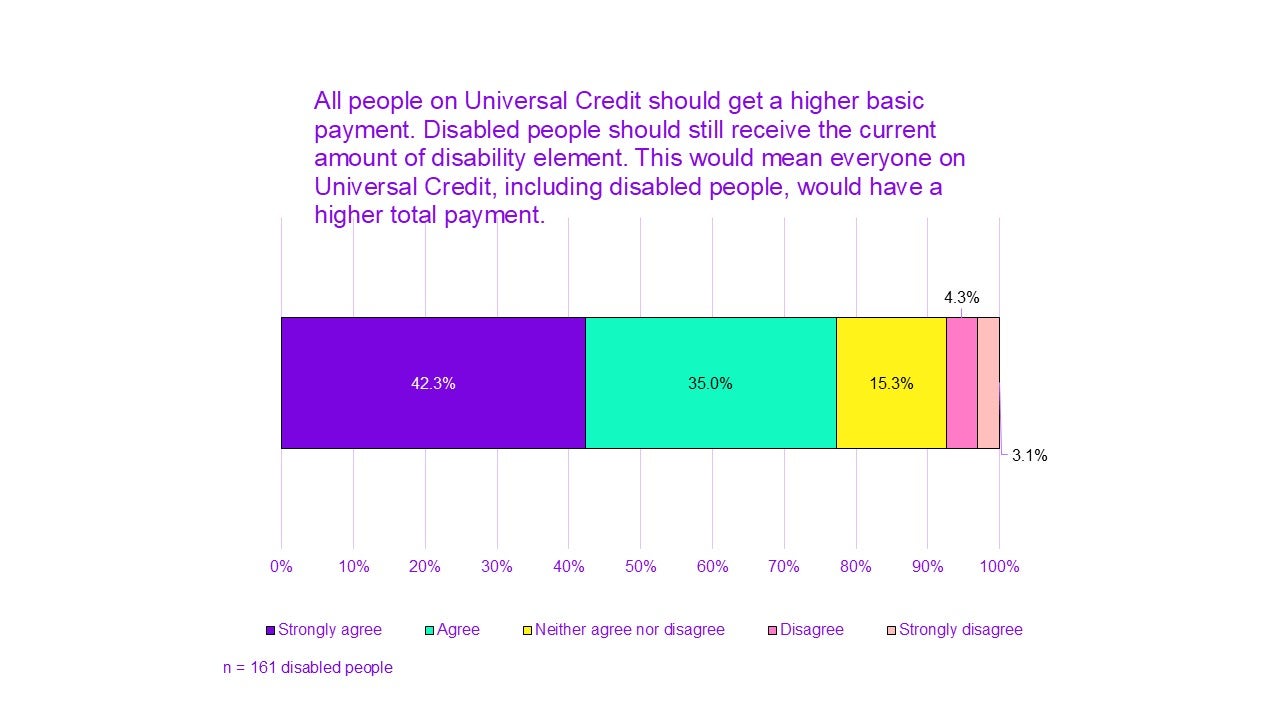
Disabled people’s additional desired changes to reducing risk
Remove conditions for moving into work
People wished for conditions around moving into work to be removed. They felt conditions attached to their claim were unfair, unhelpful and an additional burden on their health:

It's completely unfair because, if you're not well and you have health issues or that sort, then you can't be forced to follow up on work and commitments, because you have your own health worries to worry about. You can't have that, you know, the added stress as [participant] said as well. You need time to get better on your own, to get the right help, and with, you know, Universal Credit chasing you up on that, that's not going to help you. It's just going to make you feel worse. I know they want you to get back into work, but if they want you to get back into work, it has to be on your own terms.
Only 4% of respondents thought that there should be any conditions about getting ready or looking for work for disabled people who are getting Universal Credit.
Increasing work allowance
Currently, disabled people on Universal Credit have a ‘work allowance’. They can earn up to £404 a month before their benefits are affected (if their claim includes support for housing costs). Or up to £673 a month (if their claim does not include support for housing costs).
84.9% agreed that the ‘work allowance’ should be increased to £1,047 a month (the same as the personal tax allowance).
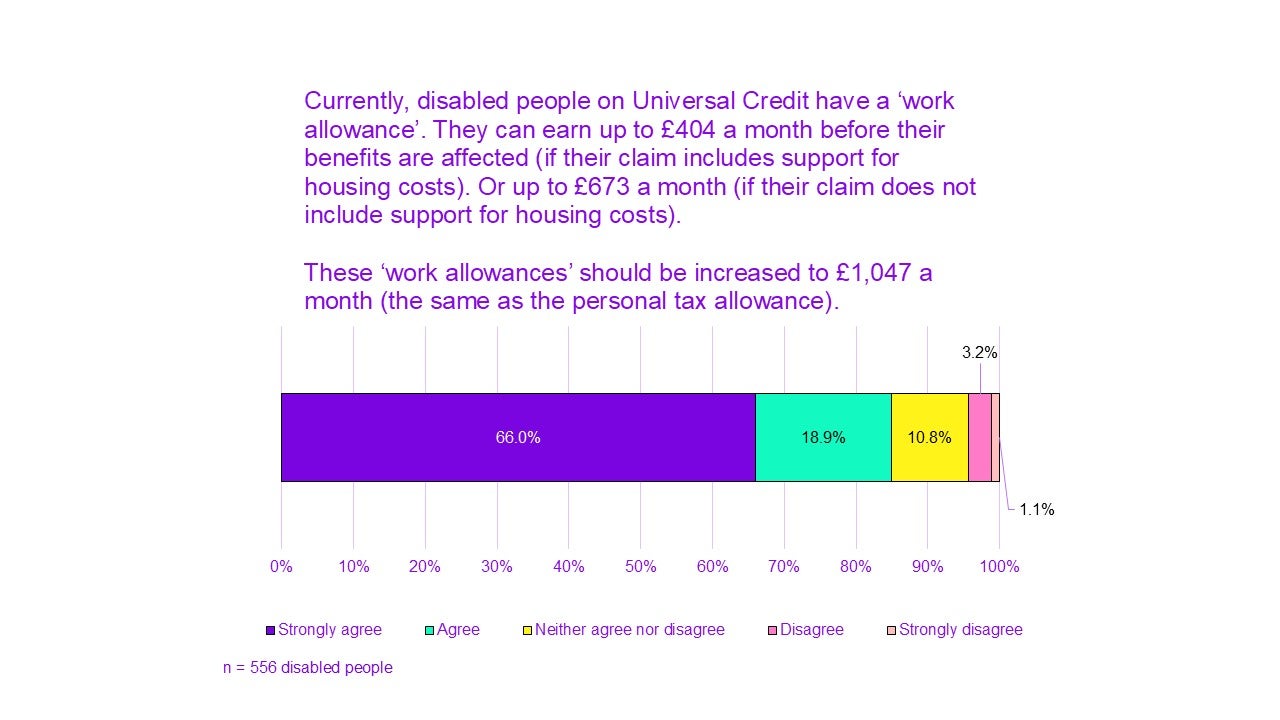
People thought increasing the work allowance also helps encourage people to try out work and reduce the risks. As their benefit would not start being reduced until they are earning a higher amount.
A few participants have also mentioned the difficulties caused by Carer’s Allowance being included in this calculation too. This meant claimants who received both UC and Carer’s allowance had a significantly reduced Universal Credit payment. This felt unfair as people’s caring roles were not optional, and often meant they were in greater need of financial support.
Increasing savings allowance
Currently, disabled people on Universal Credit can save up to £6,000 before their benefits are affected. And if they have £16,000 in savings, they cannot claim Universal Credit at all. People felt the savings allowance should be increased to support:
- periods out of work
- care expenses
- equipment and accessible housing
- difficulties of planning for life as a disabled person

And I think also, increasing the band of what you can have in savings. Because, as a disabled person, you spend so much money on medical bills and expenses and also you don't know what's going to come up to pay for if you need a doctor's appointment or private payment. And us, as any other person, want to save for a house or whatever we need to do, we should still have that right. But we're not allowed to save for a house because that then means we can't have that money also needed to spend for other things that, like, people who don't have those conditions need to pay for. And I think that needs to be acknowledged.
87.3% agreed that the ‘savings allowance’ for disabled people should be increased to be £16,000 before someone’s benefits are affected. 66.5% strongly agreed.
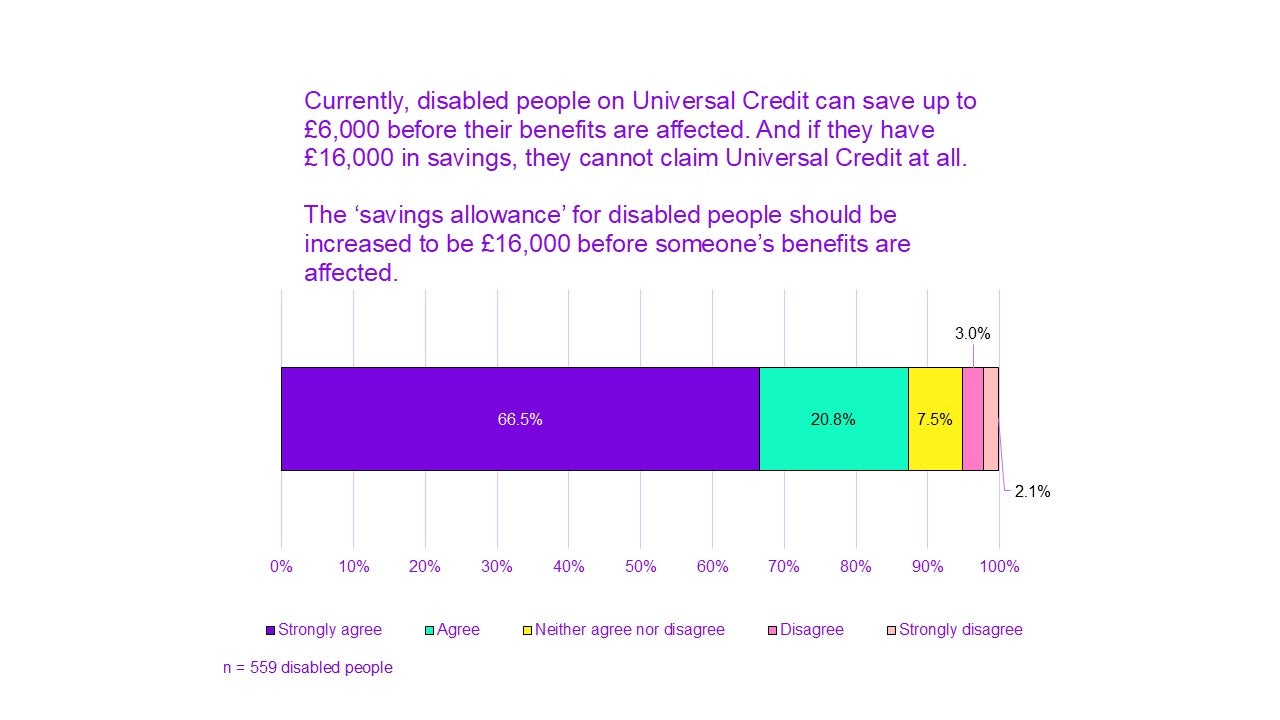
Improving employment support
Proposals aimed at improving Jobcentre engagement
Mandatory engagement (previous government)
This proposal was based on the general direction of policy set by previous governments. It generally stated that contact with work coaches should be one of the conditions to continue receiving your award. On our survey, we presented respondents with a proposal for mandatory engagement every 3 months. This was an unpopular proposal:
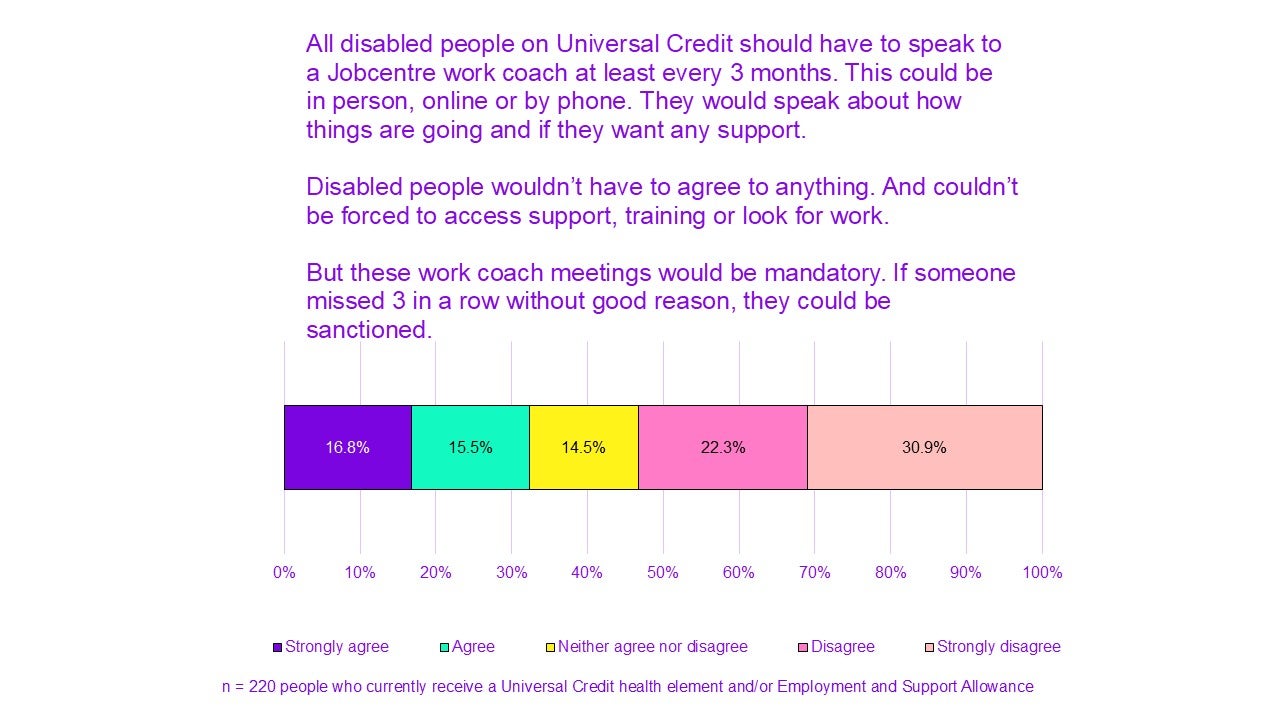
People felt adding contact as a condition would be unfair and unjustified. It's important to consider they have limited capability for work. So they viewed this proposition as adding unnecessary stress to an already stressful situation.

Well, I still go back to the long-term condition and the fact that things aren't going to change, so why would they be even contacting you in the first place? I mean, I probably wouldn't ignore them. Me, personally, I would probably respond and say what I'm saying now, that, 'Why do we need to qualify this? You've got all the information you need about me, you've got all my health records, they've all been shared at various assessments and what have you. So, why do you now need to come at me and say that you need to go to work?
People had concerns about something as important as their award being taken from them due to minor mistakes. This is because of the system's tendency to make harsh and quick judgements. Some worried about inability to maintain contact due to health or other valid reasons would not be accounted for:

'No, as your conditions may have gotten worse and be unable to get to speak to them.

I think they should find out why you're not getting in touch with them, because you could be in hospital, it could be many reasons why. You could be really unwell, you could have gone downhill, you could be in a mental health institute, you just don't know. You can't just make an assumption.
Additional desired changes to Jobcentre support
Listen rather than dictate: a more empathetic, personal treatment
A lack of empathy was one of the most common and noticeable issues people mentioned about their experience of engaging with contacts at the Jobcentre. People felt the often cold or unkind attitudes they experienced came from a lack of understanding and interest in their circumstances:

At the beginning, I was wishing that someone could come and spend one day with me to see how this affects me. Seeing me once a month or once a week will not give them the ability to assess properly.” “Respect, more respect for people with disabilities and people with illnesses… But it's more respect and understanding, rather than just saying, 'Oh, you know, scrap heap for you. You get this, that's the end of that.' And the way things are worded on the journal should be, you know, more respectfully written.
Instead, people wished for respectful communication based on listening and taking their personal needs into account.

Being treated like a person, a human being. Having understanding, patience. Actually getting to know the person and their struggles, and giving them the right advice.” “More training and empathy and a basic understanding of conditions and disabilities and how they affect us, instead of looking at us like we are fine and being lazy or deliberately difficult
Personal support and time invested to get to know people who were ready to engage were key. Many wished to be asked about their needs and to be listened to:

…Just involve us in anything that you're dealing with. Don't shut us out. Don't just come for us and say, 'You need to do this assessment', or, 'If you don't respond to this phone call within so-and-so'. You know, just ask us what you can do for us. Ask us what you can do to support us.” “A kind and supportive worker who listens and understands your needs so they can provide a more tailored experience for your needs.
This would enable individualised support that meets needs, goals, skills and preferences:

It would be really helpful just to, kind of, have more support and empathy from them, but also to not just be like, 'Oh, you have to go into full time work. You have to work at a supermarket.' How about something that's more tailored to your needs? Like, 'Okay, so, have you tried looking at the education route, the work route? Maybe you could do part time and maybe this kind of scenario would be good for you because it has wheelchair access, for example. And you can come in and out when you need to and you could only work a short amount a day
People wanted more options to discuss their circumstances and what might help at different points in their lives:

Probably more communication with the DWP and work coaches and guidance and understanding of where you are in your situation and your condition and how that looks with working. In the way of how if you go and get a job, they might view that as you're better because you're not at home all the time but, actually, you've just learnt how to manage your symptoms or you're just dealing with the pain of it, to be honest. You're just taking that hit and going, 'Okay, I need to take the cost of my health to do that'. And them speaking to you and supporting you through that and seeing that, 'Okay, this person still needs to receive this money', or, 'The employer needs to have maybe more information or help with the employer in understanding that', instead of viewing it as, 'Okay, you need a reassessment because this has changed so, actually, your condition has changed and you're better'.
People were interested in DWP support to stay in the workplace. They emphasised how receptive support that values lived experience could enable that:

When I could still go to work, it would have been nice to have still been able to go to work with some simple adaptions in a workplace, the lighting, the area where I worked. Working near to the entrance so that I don't have to walk through an office and risk falling over countless things or bumping into people and stuff like that. There's so many things that could be done, and they're really quite simple things that would-, probably if they listen to the people that were in that situation rather than just lumping everything together.
Comprehensive disability training and a standardised level of service
Work coaches’ training was a very common need people mentioned. People wished for a higher level of knowledge about disability and access needs that people might have. This would allow work coaches to adequately support disabled claimants. More specifically, people wished for a more nuanced understanding. One that would acknowledge diverse needs and not make assumptions about people:

You know, rather than someone just reading online, that's my condition, and thinking, 'Okay, well, that means she can't do this, this, and this.' They need to remove the barriers by a way of actually meeting with people with conditions and not-, because, you know, there could be 5 people that have a blindness, but blindness can be in varying degrees. I know mine's perhaps one of the worst, more severe end of the scale, but there are also other people that might be in the middle or the lower end of the scale that could do a lot more. So, where they've got all these categories of, like, 'Oh, you can apply to this if you've got this, this, and this,' I think there needs to be-, within each group, they need to break that down a little bit. I was just going to say because that's what puts the barriers up and that, isn't it? You know, when everyone's bundled into the same group. Because somebody might be able to work. Or the other thing as well is, like, they say, 'Oh, well, if people have got a sight impairment, they could do this job.' But not everybody can because all sight impairment is different.
People felt an improved understanding would allow work coaches to recognise where people are in need of additional help. They could offer this help before work support, and regardless of it:

…it would be nice if they just knew what they were going on about, really. You know, if they were trained enough to realise or notice when you're struggling with something, or if you've got your difficulties, disabilities, health issues, then they should get on top of that straight away instead of just introducing you to some more work. It's just lack of training, really.
People described becoming distressed by interactions with work coaches. They therefore spoke of the importance of being trained to speak with people who might be struggling:

Be trained and be careful what they say over the phone, you know, because they're not trained on people with mental health. They're not.
Many people have mentioned experiencing a vastly different level of service and varying attitudes from different contacts. Needing to share their history and difficulties repeatedly was also challenging for some. Having a consistent contact at the Jobcentre was desirable. But only if work coaches were more knowledgeable about disability.

I think the people that are working there, they need to have a consistent understanding of it. Like, there's no point in allocating someone, one person that's consistent, the same person, if they don't actually know anything about it and they can't advise you in any way.” “One or 2 regular people to help get to know you, your family and your circumstances, that listen, hear us and come back and make proper decisions.
Many people wanted disability-specific work coaches.

Every single Jobcentre having a dedicated disability coach. Not a work coach, a disability coach. So that person is disabled people's point of contact for disability matters, so that if people need help with-, not necessarily being employed by the DWP but they are based in a Jobcentre. For filling out PIP forms through to making sure that people know when and how they should have carers element added to their UC claims. Making sure that autistic people, you know, have help doing Universal Credit forms because nobody else is going to bloody well help us. So, all sorts of stuff. Actually properly explaining the rules around working in Limited Capability for Work-Related Activity (LCWRA) because nobody else is giving us this information. There needs to be somebody.
This was particularly the case for those who would like to move towards work but are not well enough or ready yet.

It would be great to be able to talk through with somebody about how we could look at the long-term goals to get me back to a point of where I could possibly consider it and possibly what training I could possibly be doing from home to get myself into a position where I might be able to do something part-time.
Disability-specialist work coaches could help meet disabled people’s desire for improved staff knowledge. This would enable more effective support to claimants who were in need of information about their rights and options.
Low pressure support
Many people experienced work-related support as very stressful. Any type of pressure would not be appropriate for those uninterested or unable to work. Yet this was true for many of those who were interested in working. They felt this level of stress was counterproductive when it came to helping them try or consider a move into work. People therefore expressed a great interest in being able to receive support that was:
- optional
- delivered at slow or self-determined pace
- without pressure to achieve specific progress
- aimed at feasible and sustainable working conditions (for example, flexible, remote, part-time)
People felt this would help make the possible move into work feel safer, easier and less stressful.

Releasing the pressure makes someone be able to do stuff.” “Especially for people that are anxious already. You know, for certain people, that's why they are on this so why make it more traumatic for them, but I would love it if it was optional.” “Obviously, if there's no, like, forced pressure, then they can also give you some places to look at or organisations, you know, like voluntary work, qualifications, even. It's just nice to have that in the background. You know, because, on your account, you can't really access all those things. It's just things like my commitments or have I applied to anywhere. They don't have any support on there.
83% said that Jobcentres should be more proactive at asking people if they would like any support and offering it if desired. But not on a mandatory basis.
Practical support
Overall, the most popular options for people who wanted services through their Jobcentre were:
- appointments with disability work coaches
- information about rights and disability in the workplace
- information about the Access to Work Scheme
- information about Disability Confident employers
- training and courses that lead to qualifications
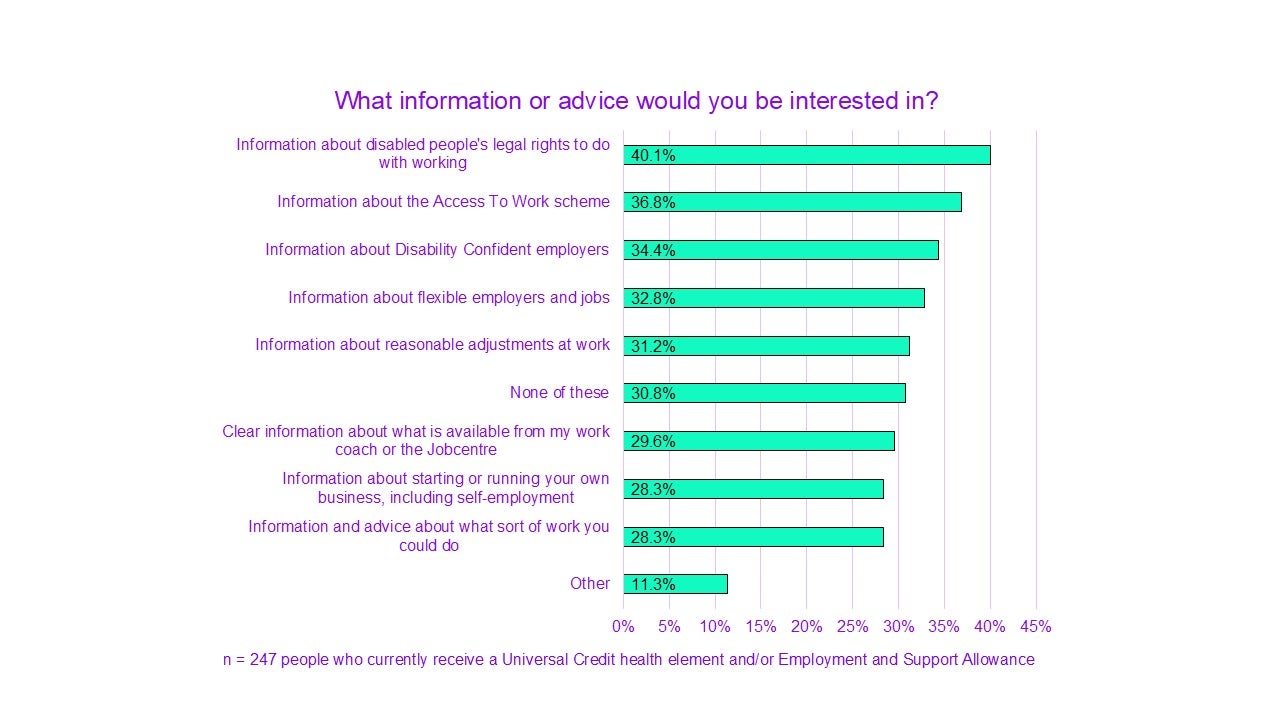
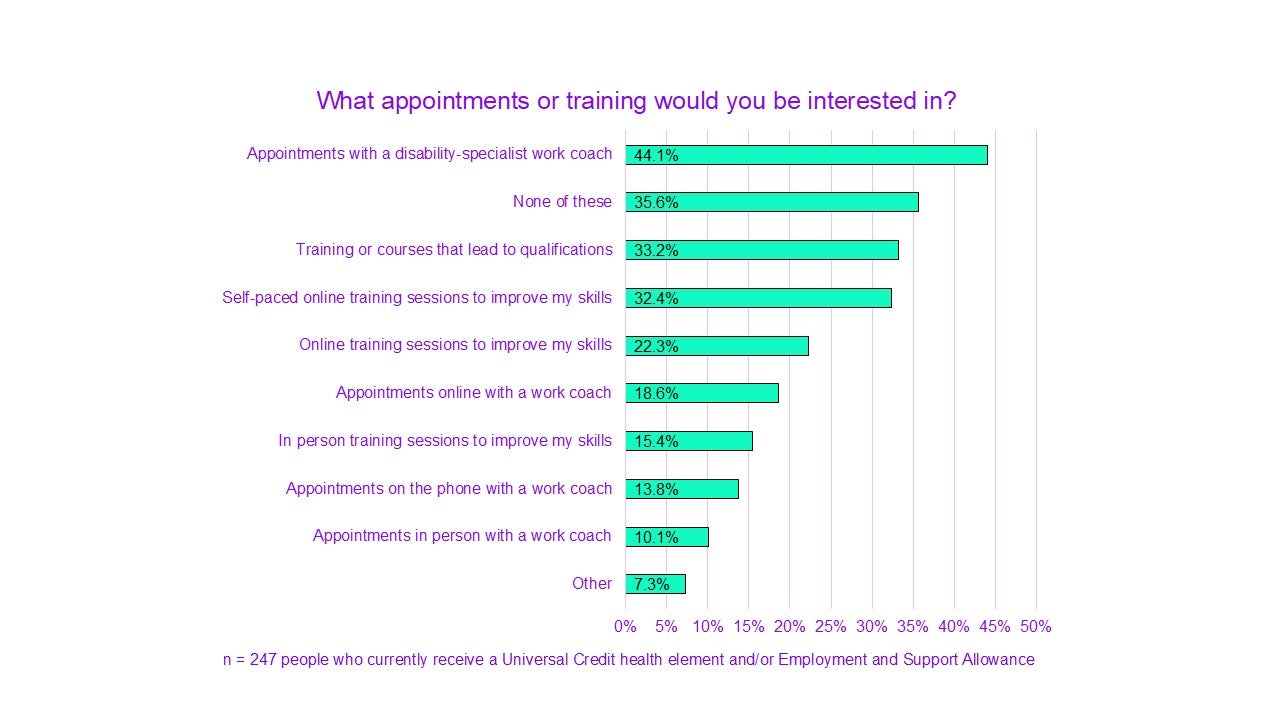
![A chart titled "What help or support would you be interested in?"
None of these had 32.4%.
Help with building confidence, self-esteem or getting into a routine had 29.6%.
Help communicating your access needs and required adjustments to employers had 26.7%.
Help with finding suitable work and suitable employers had 25.5%.
Support to help you resolve any problems when you start a new job had 24.7%.
Help with finding suitable volunteering opportunities or voluntary work had 23.9%.
Help with the costs starting a new job or position [like transport or clothing] had 23.1%.
Help with managing money, debt or benefits had 22.7%.
Support to become self-employed or set up or run your new business had 21.1%.
Support to help your employer resolve any problems when you start a new job had 19.8%.
Support with how to present yourself in CVs and interviews had 17.8%.
Help to get adjustments for interviews had 17.4%.
Help with travel costs while getting work experience had 16.6%.
Help with finding suitable work experience had 12.1%.
Other had 6.9%.
Work preparation support for parents or carers had 6.9%.
Help with childcare costs while getting work experience had 4.0%.
n = 247 people who currently receive a Universal Credit health element and/or Employment and Support Allowance](https://assets-eu-01.kc-usercontent.com:443/73ea709e-f9f8-0168-3842-ebd7ad1e23ac/e2066f06-0eac-4bc4-9b2f-256509f4747f/Interested%20help.jpg)
Mentoring schemes and peer support groups
Some were also interested in mentoring schemes by other disabled people, facilitated by the Jobcentre.

I think by having a mentoring system possibly by people who have previously been on the benefit and are now working part-time or full-time would be able to help somebody else in that direction
They also thought mentors would be helpful. It would be a particularly useful way of helping people who were considering work explore their options in a stress-free way:

I think a mentor for those who aren't able to work would be a good idea to see what steps you could take, not force you, but what steps you could take to get in the right direction…
There was also a suggestion of peer support groups as a helpful addition that could improve people’s experience:

A supportive space. People in a similar situation to me could get together, share resources, learn about what's available to us.
Support with employer interactions
People described wanting much more support navigating disability with employers and potential employers.
This included help to navigate and interact in early stages of applying and interviewing. Including more practical guidance about applying for jobs as a disabled person.

And also help you just start that journey because even, like, going in for jobs can be really difficult because I think employers are quite quick to judge you. Even though it's, kind of, that case of, 'Do you tell them that you're disabled or do you not? But then, when you do an interview is that going to come back as a bad thing?' And it's such a, yes, vicious cycle you can get stuck in with it.
People also wanted support once they had started a job. 95% felt that Jobcentre support should be available for the first 6 months after a disabled person starts a new job. And that this support should be available to both the claimant and employer.

But if you've come out of the benefit system and gone onto a job, you still might need some additional support to be able to keep that job, to maintain going to work. Especially if you've been out of work for a long time. People might quite easily think, 'Oh, I don't want to do this anymore,' and then leave. So, if they had support, you know, if there was somebody that could-, perhaps every now and then somebody who just checked in and said, 'How's the work going? What do you like about it? What don't you like about it? And, you know, perhaps if that's not the job for you, rather than just leaving it, let's try and find you something else.'
More support around Access to Work
People have mentioned struggling with applying for or accessing the support available through Access to Work. They therefore wished for additional help for individuals to be able to use this scheme. And to help employers understand it:

Having some additional help with navigating access to work would be amazing.
Some have also felt the scheme itself needed to be simplified to make it more accessible and usable. People also wanted Access to Work to be available to those starting self-employment after receiving benefits. Without a requirement on minimum earnings of the ‘lower earnings limit’.

When you come back to the issues around Access to Work, I was for a while self-employed through ESA-permitted work. And, whether I was going to get any Access to Work, I literally only just made it by the skin of my teeth, because of the minimum income threshold rules. And, if you are somebody who has been out of work for a significant amount of time, you're trying out a new idea, that rule, in some way, becomes quite punitive. And, I think that, actually, it would be much better if we could have almost a, 'Well, there's no minimum income threshold for the first 2 years of self-employment for people who have been long-term sick, long-term disabled, not able to work.' Because, that gives people the option of giving something a try, giving something a really good go, and going, 'Okay, yes, I can do this with this support.' Or, 'Actually, I need a bit more support to make this more sustainable.' Or going, 'Actually, no, I cannot do this sustainably without it impacting my physical, mental health. I have to put a stop to this. I have to pivot, I have to do something slightly different.'
Accessible courses and training
People wanted choice around courses and training, as many of the standard offers did not meet their needs. Practical training linked to in-demand skills, qualifications, or suitable work opportunities.

I'd like to be able to choose things that would help me with a career in the future, things that would point me in the right direction for what I want to do in the future rather than just do things willy-nilly because that's all I can afford.
Focused qualifications are also a way to evidence skills or abilities that are not backed up by recent work experience:

I think any of the courses where it is, kind of, level whatever qualifications, I think they'd be good, or ones where you're training to go into a job because I think a lot of the work that is available, they always ask for experience. And to get experience, you need to be employed and it's, like, 'Well, if you don't want to employ us, then how do we get the experience?' So, I think anything in that sense definitely would be useful to people.
Courses and training need to be accessible and include options to be remote and self-paced.

It's accessibility always, not having things in every format, not just having it in groups in a college or what have you. Not everyone can access that and not everyone has the time to do a whole day. It's having it done in chunks rather than doing the same model over and over again.
Self-employment has benefits to many disabled people. Because of this, training and support about working for yourself was also wanted:

Because now I'm at the point where I want to start looking into potentially, like, setting something up myself, and so then I can work by my own hours, and everything, and limit myself based on how I'm feeling that day.
People also wanted the option to access training or support even if they are unable to do or find paid work. This would support people’s longer-term goals rather than just a move for everyone into full-time work.

I think it's important to not let people go to waste just because they're unwell, because if they're not well enough to do stuff then that's fair enough, but give them the option.
Final conclusions
Political and public pressure to reduce the overall amount spent on disability benefits feels more present than ever. This timing can be incredibly difficult. Many disabled people are having to face this pressure while struggling under cost of living worries. Current claimants of work-related disability benefits tend to feel stressed and monitored rather than supported.
We also know many disabled people are not currently claiming the benefits that they are eligible for (DWP, 2024e). Yet the focus of attention (and resources) seems to be efforts to cut budgets, expose cases of fraud and reassess people’s long-term conditions.
Disabled people’s biggest barriers to work are their health, lack of accessible and flexible work options, and pressure from the benefit system. Not lack of skills or motivation. These systemic and employment barriers make the move into work extremely challenging for disabled people. And often impossible for many of them.
The proposals brought forward by the previous government’s white paper (DWP, 2023) provide only very partial solutions. They do not adequately address the variety of issues that are part of disabled people’s reality and needs. Nor do they aim to use the government’s power to tackle inequality in employment.
Any solution that aims to enable disabled people to move into work must also address the widespread and severe barriers within the job market itself. The aim should be to reduce the disability employment gap (Scope, 2023b) by increasing opportunities for disabled people to get jobs and stay in work.
One of the crucial changes needed to support people into work is making sure that they are not discriminated against in the workplace. This means improving hiring practices, which need to be far more inclusive. It also means creating supportive cultures for disabled people to work in, across all areas of business. Adjustments and flexible working options are essential to this process. As is making sure that disabled people know their rights. And, importantly, that employers know their responsibilities.
An extension and improvement to Statutory Sick Pay is likewise warranted. The DWP should work directly with employers to open up employment to disabled people who might otherwise have been excluded. And better support their disabled employees. This will also help to secure the provision of equal opportunities.
As we have seen, many significant barriers can be found within the structure and function of the benefit system itself. The benefits system in its current state is not fit for purpose. Sufficient support to move into employment is not offered to many people who would like it. Others are pressured into work or engaging with work support in ways that are not appropriate for their needs. This then negatively impacts their health and well-being.
Unnecessary threats and risks that are built into the system’s function do not achieve the desired results. In fact, these threats produce the opposite effect. These risks discourage people who are interested in working from trying to do so, and make people reluctant to engage with the DWP.
Disabled people who are interested in working need more opportunities to safely try out work. This means removing any potential financial risk and allowing space and time for learning.
Support should be accessible and optional, but never a requirement.
Similarly, sanctions should be removed entirely and reassessments considerably reduced.
There is a pressing need for an improved understanding of disability and access needs within the benefit system. Too often, it fails to provide claimants with individually appropriate support. This hurts both disabled people who cannot work, and those who are already working or want to work. This improved understanding must acknowledge and respect the fact that, for some, work is simply not an option.
The existing lack of personalisation within benefit provision means that many people are nervous about engaging with support. Therefore, they remain unsure about what may be possible for them in the future. Many disabled people want closer support before, during and after the move into work. They also want, and need, practical help and accurate advice, including information about their legal rights at work.
A more informed and dignified approach could help repair trust. This includes making all information and support accessible. It will also support people to better plan for their future and fulfil their goals.
The current Work Capability Assessment (WCA) does not measure much of disabled people’s real barriers to work. And it often excludes them from accessing benefits. It ignores people’s views on their own work capability and their ambitions around work.
It also is not linked well enough to the current job market and the type of jobs that are or should be available. Many descriptors are linked to physical jobs or tasks. As such, they do not capture barriers about being able to carry out work-related activity reliably. The descriptors also ignore the possibility of activities causing harm to people’s health.
For these reasons, the existing WCA needs to be replaced, with input from disabled people. A fairer WCA might seek evidence from independent specialists, or greater involvement from people’s own medical or care professionals.
Disabled people want change. The needed changes are vast and deep. They include the benefits system as well as the culture around it. Disabled people deserve dignified support, regardless of their work capability. Disabled people who can and want to work deserve fair and safe conditions to do so, and to be able to trust that their well-being is prioritised.
Addressing the real barriers that disabled people face will reduce hardship and distress. This will better support them and enable engagement by those who are able to work, while protecting those who cannot. And help disabled people to move into and stay in sustainable work, without fear.
References
Department for Work and Pensions. (2015). Employment and support allowance – Work Capability Assessment: audio recording of face-to-face assessments policy.
Department for Work and Pensions. (2020). The work aspirations and support needs of claimants in the ESA Support Group and Universal Credit equivalent.
Department for Work and Pensions. (2023). Transforming support: the health and disability white paper [white paper].
Department for Work and Pensions. (2024a). Fraud and error in the benefit system, Financial Year Ending (FYE) 2024.
Department for work and Pensions. (2024b). DWP Customer Experience Survey: Benefit Customers 2023 to 2024.
Department for Work and Pensions. (2024c). Help with moving from benefits to work.
Department for Work and Pensions. (2024d). Jobcentre Plus support.
Department for Work and Pensions. (2024e). Unfulfilled eligibility in the benefit system: financial year 2023 to 2024 estimates.
Glover, B. (2019). Pathways from Poverty: the future of the DWP. Demos
Scope. (2023a). Disability Price Tag 2023.
Scope. (2023b). Disability in the workplace: how to retain disabled staff in employment.
Scope. (2024a). Disability Price Tag 2024: Living with the extra cost of disability.
Scope. (2024b). Disability benefits without the fight.
Social Security Advisory Committee. (2020). How DWP involves disabled people when developing or evaluating programmes that affect them.
The Joseph Rowntree Foundation. (2024). Unlocking benefits: tackling barriers for disabled people wanting to work.
The Resolution Foundation. (2023). Low Pay Britain 2023
The Work Foundation. (2023). The Disability Gap: Insecure work in the UK.
WPI Economics. (2024). Disabled people’s extra burden of essentials.
Acknowledgements
This report would not have been possible without the input of disabled people. They supported this research through their involvement in Scope’s Lived Experience Research Panel. We thank them for their time, energy and sharing their experiences with us.
We would like to thank colleagues from the Joseph Rowntree Foundation, who have worked with us closely throughout this research. In particular:
- Iain Porter. For his expertise, policy ideas and focus throughout the project.
- Dan Tomlinson. For his expertise and input in the planning and first stages of the project.
Thank you to all of our Scope colleagues who worked hard to make this research possible. Especially:
- Caleb Hayes. For his support throughout the research. Particularly with qualitative analysis and recruiting participants and prioritising their welfare.
- Ian Paynter. For his support with the project and quantitative analysis.
- Zoya Javed. For her support in the planning stages and conducting Stage 2 fieldwork.
- David Southgate and Frankie Bowyer. For their policy input throughout the drafting process.
- Dr Serena Wright. For feedback on the drafts of this report.
- Dr Leticia Veruete-Mckay and Fiona Thomson. For supporting with and confirming quantitative data.
- LC Groux-Moreau. For their help and expertise on report accessibility.
- Elisabeth Ward. For her help with report accessibility.
- Heather Reeve. For her help with chart accessibility.
- Heather Perkins. For her help with summary content.
Appendix
Demographic characteristics for participants claiming UC and/or ESA (n=382)
| Demographic details | Number | Percentage |
| Age | ||
| 18 to 25 | 15 | 3.93% |
| 26 to 35 | 64 | 16.75% |
| 36 to 45 | 87 | 22.77% |
| 46 to 55 | 99 | 25.92% |
| 56 to 65 | 109 | 28.53% |
| Over 65 | 7 | 1.83% |
| Gender | ||
| Man | 67 | 17.54% |
| Non-binary | 16 | 4.19% |
| Woman | 284 | 74.35% |
| I use another term | 5 | 1.31% |
| Prefer not to say | 10 | 2.62% |
| Region | ||
| East Midlands | 29 | 7.59% |
| East of England | 52 | 13.61% |
| London | 22 | 5.76% |
| North East | 21 | 5.50% |
| North West | 66 | 17.28% |
| Northern Ireland | 1 | 0.26% |
| Scotland | 3 | 0.79% |
| South East | 69 | 18.06% |
| South West | 25 | 6.54% |
| Wales | 16 | 4.19% |
| West Midlands | 46 | 12.04% |
| Yorkshire | 31 | 8.12% |
| Data unavailable | 1 | 0.26% |
| Ethnicity | ||
| White: British, English, Scottish, Welsh, Northern Irish | 333 | 87.17% |
| White (Irish) | 3 | 0.79% |
| White (Gypsy or Irish Traveller) | 0 | 0.00% |
| White (Roma) | 0 | 0.00% |
| Any other White background (tick and write in) | 12 | 3.14% |
| Mixed or multiple ethnic groups (White and Black Caribbean) | 2 | 0.52% |
| Mixed or multiple ethnic groups (White and Black African) | 2 | 0.52% |
| Mixed or multiple ethnic groups (White and Asian) | 1 | 0.26% |
| Any other Mixed or Multiple background (tick and write in) | 8 | 2.09% |
| Asian or Asian British (Indian) | 4 | 1.05% |
| Asian/Asian British: Pakistani | 3 | 0.79% |
| Asian or Asian British (Bangladeshi) | 1 | 0.26% |
| Asian or Asian British (Chinese) | 0 | 0.00% |
| Any other Asian background (tick and write in) | 1 | 0.26% |
| Black, Black British, Caribbean or African (Caribbean) | 3 | 0.79% |
| Black, Black British, Caribbean or African (African) | 0 | 0.00% |
| Any other Black, Black British, Caribbean or African background (tick and write in) | 0 | 0.00% |
| Arab | 0 | 0.00% |
| Middle Eastern or North African | 0 | 0.00% |
| Any other ethnic group (tick and write in) | 3 | 0.79% |
| Prefer not to say | 5 | 1.31% |
| Data unavailable | 1 | 0.26% |
| Employment | ||
| Employed full time | 4 | 1.05% |
| Part time employed | 22 | 5.76% |
| Self employed | 18 | 4.71% |
| Actively looking for employment | 40 | 10.47% |
| Retired | 23 | 6.02% |
| Full time student | 10 | 2.62% |
| Part time student | 14 | 3.66% |
| Unpaid carer | 31 | 8.12% |
| Unable to work due to illness/disability | 250 | 65.45% |
Survey respondents for each survey, with detail of participants claiming UC health element and/or ESA and those who have had a WCA
| Survey number | Number of total disabled respondents | Number of respondents claiming UC health element and/or ESA | Number of respondents not claiming UC and/or ESA who’ve had a WCA | Total number of respondents not claiming UC and/or ESA who’ve had a WCA | Total percentage of respondents not claiming UC and/or ESA who’ve had a WCA |
| Survey 1 | 425 | 150 | 81 | 231 | 54.4% |
| Survey 2 | 527 | 247 | 21 | 268 | 50.9% |
| Survey 3 | 559 | 221 | 98 | 319 | 57.1% |

